2 Volumes
BANKS REDEFINED
American banking was invented in Philadelphia. The banking center of America has moved away and changed in extraordinary ways but the foundations remain.
Sociology: Philadelphia and the Quaker Colonies
The early Philadelphia had many faces, its people were varied and interesting; its history turbulent and of lasting importance.
Personal Finance
The rules of financial health are simple, but remarkably hard to follow. Be frugal in order to save, use your savings to buy the whole market not parts of it, if this system ain't broke, don't fix it. And don't underestimate your longevity.
It just frenzied Benjamin Franklin to meet young people who couldn't, wouldn't, didn't appreciate the power of compound interest. Money invested at 10% doubles every seven years. Everybody is born with the likelihood of twelve doublings. Two, 4, 8, 16, 32, 64, 128, 256, 512, 1024, 2048, 4096. Your penny at birth could turn into forty dollars at your funeral, unless you never save a penny until time has gone past. If you delay saving until you are in your thirties, just chop off the four biggest right-hand numbers in the sequence; you will save $1.28. Not bad, but you missed the really big opportunities, and can never get them back. As a practical matter, your parents have to get you started as very small children.
Whenever you do grow up and get started, there are goblins hiding behind the trees. Taxes and inflation are provided by your government, maybe wars, too. Your schoolmate chums will offer you life insurance, professional investing advice, brokerage fees, pump and dump of one variety or another. But, but. If you just buy a broadly balanced world index fund and hold it like grim death, you'll probably do very well and you won't need to know what's wrong with every other thing you could have bought but didn't. That will put you ahead of 95% of the public without much effort; going for that last 5% is hard work, risky, and too complicated for people without special training. Getting rich slowly isn't good enough for some people, so in this series we will emit a short snarl about each of the other temptations you will likely experience. Saying negative things is disagreeable, but everyone must at least have some road signs about treacherous patches along the journey. In general, males in our society need to be told what to watch out for, females just want to know where to go.
And finally, if you select a time to retire with enough to live on, you better be certain you are right about that. The miracles of modern American medicine have extended life expectancy by an extra three years every ten. That's thirteen years for the price of ten, except that the accumulated years are all piled up as retirement years. The whole baby boomer generation got caught by the wonderful experience of longevity, and it's a problem knowing how to finance their twenty-year vacation after they quit working. That may be a one-time event, but don't count on it. There is absolutely no way to get out of that situation, which can only be fully recognized at the end of your working life, except by staying at work several years longer than all your friends agree is fair.
So, you have to save and invest more than you really think you are ever going to need. Because if you don't save at least 50% more than everyone else you know, you may very well not have enough, and fairness won't mean a great deal. And that brings us to estate planning.
You'll hear people say they want to spend their last dime with their last breath, but it's pretty hard to recollect anyone who ever did that. You've got to save more than you think you need, hope to goodness it will let you scrape by, and then do some estate planning to cope with possible left-overs.
Investing for Children

|
| Many a Mickle Makes a Muckle |
There are three major expenses for an average American lifetime. Paying for college, buying a house, and providing for retirement. Unless there is a substantial inheritance, all three of these expenses must be provided for during the four decades from college graduation to retirement. Even in affluent families during prosperous times, that is almost too much burden to carry. Improved longevity leads to longer retirements, depleting family reserves which might have been transferred to grandchildren for their expensive educations. Even families which can afford it, find the legal climate unhelpful. Money given to a grandchild at birth has twenty years to grow, at least tripling before college entrance, but it proves remarkably difficult to take advantage of this opportunity.
It is obviously dangerous to allow children to choose how to spend their own money. They will not merely squander money on trinkets, there are automobiles, illegal drugs, and unwise marriages to consider. A law called the uniform gifts to minors act addresses this issue fairly well, placing assets in the hands of a custodian until the child is nineteen. That's the right idea, but nineteen is too young for many who go on to college, and it would be a blessing if the money in these custodial accounts could be frozen until college bills, if any, have been paid.

|
| Trust Funds |
A concept known as the Clifford Trust was created, allowing income from a sum of money to go to minor children (at their lower income tax rates) and then after a minimum of ten years the principal reverts to the donor. That was well intended, but it created a mountain of burdensome paperwork, legal and accounting fees. The Internal Revenue Service probably has very good reason to be suspicious of arrangements for children which primarily cloak tax evasions by their relatives. Nevertheless, the great majority of honest parents trying to pay for college are hounded and hassled in order to prevent a smaller number from cheating. Our lawmakers ought to be able to do better than this.
It was once possible to buy tax-free municipal bonds without coupons --so-called zero coupon bonds, or strips-- which could be put in a safe deposit box and forgotten until college admission time. Unfortunately, the law was changed to require yearly taxes on "virtual" income, and much ado was made of the concealment of personal property from the awareness of the infant owners.

|
| Until Death Do Us Part |
Trust funds are expensive to construct and maintain, and taxed at a fixed high tax bracket, often higher than the parents are paying. While college tuition bills are crushing, they are not large enough to make it economical to use ordinary trust funds to sustain them for a few years of concern. As the economy grows steadily more prosperous, more people will face these problems, and sympathy may grow to the point of congressional action. Unfortunately, the families who do not have college problems to finance are an envy obstacle in the eyes of elected officials, and the fairness argument is rehearsed.
Meanwhile, a single share of Berkshire Hathaway stock would pay for college, would probably triple in value from birth to graduation, generating no taxes in the meantime. The problem obviously is to afford that single share when the baby is born, but possibly a sort of mortgage could be devised. There should be more securities like Berkshire Hathaway; long life to its all-too-mortal master, Warren Buffett.
The Coming Baby Boomer Retirement Problem
 In a few years, the baby boomers will retire and two things will happen. They will have to retire later in life, and the country will have to borrow money to pay for the rest. 
|
In 2004, the Nobel Prize in economics was shared by Edward C. Prescott and Finn E. Kydland, for advancing the concept that business cycles are caused as much by what people expect to happen as by what actually does happen. By this reasoning, myriads of individual decisions are constantly made in the direction suggested by simple undeniable truths. What truths face us? Demographic facts related to how many people have already been born, and how fast they are dying, force everyone to acknowledge that both Social Security and Medicare are seriously underfunded. Consequently, it seems inescapable that the boomers must work longer and retire later. To whatever degree they don't, the country must go deeper into debt.
Prescott, writing in the December, 2006 Wall Street Journal, stated this truism slightly differently to reach the next step: the national debt must increase. Increasing the national debt raises interest rates, which is good for savers. At the moment, the main savers are American retirees and foreign governments. However, the bond market is and always has been a zero-sum game. What's good for American retirees is bad for American business. And mortgage-holders. And everyone else who is in debt. Higher interest rates, which are seemingly inevitable, encourage saving and discourage borrowing. Prescott seemingly welcomes those features, because he is remarkably cheerful about the inevitable coming demographic crunch.
There are at least two things about it which should be bothersome. The first is that the boomers will not be borrowing money from their own generation but from their children. Getting the chance to live longer than their parents, they seemingly want to retire at the same age or earlier, asking their children to pay for the unearned twenty-year vacation. Boomers simply must be shamed into later retirements. The American Gross Domestic Product has a long term growth rate of about 3% per year; 2% of that total comes from increased productivity, about 1% from population growth. Extending domestic working years has the same economic effect as, say, illegal immigration; it's good for the whole country to make this nativist substitution.
The other disturbing consequence of borrowing our way out of debt is the effect on banks. That's harder to explain, but the interest rates we have been describing are long-term rates, established by the world marketplace. Short-term rates are independently set by the Federal Reserve to control (or "target") inflation, and currently they are higher than market-set long term rates. Any sensible saver will therefore use moneymarket funds rather than buy bonds. That's mostly bad for banks because their profit largely derives from "borrowing short and lending long". The so-called inverted yield curve, then, is good for old folks and bad for banks. If the Treasury fails to issue enough long term bond debt, or the Federal Reserve fails to issue enough short-term debt, banks are in danger of going broke. To summarize the whole puzzle, the government clearly will become more deeply indebted, but it must preserve a proper balance between short-term and long-term borrowing. Otherwise, either a bank crisis or inflation will sink us.
As a guess, I would say that banks are the likeliest to fail. They are in precarious condition anyway because of wrenching changes in technology. And they are in the process of discrediting themselves by failing to pass along the currently soaring short-term rate bonanza to the public. Just compare your own money-market interest rate with the 5.25% which the Federal Reserve has dumped on the banking system, and see if your blood doesn't boil a little. If this pick-pocketing continues much longer, banks will be in a bad public relations position when they must come to the public with hat in hand.
So, there's only one defensible response to this demographic retirement problem. The baby boomers, having been handed several years of unexpected longevity, must spend a portion of it working longer.
Default Investing
 Busy people with growing families have little time for investing but will find their retirement crippled if they neglect it 
|
| Dr. Fisher |
Young people with busy careers and growing families have no time to learn the complex, constantly changing, and cut-throat world of active investment. What is described here is a formula for achieving lifetime growth of savings which is superior to what 90% of the population achieves. Its principles are simple: buy and hold will avoid transaction fees, and minimize taxes. Young people may not realize it, but taxes will eventually become their largest expense, and financial professionals value their services very generously indeed.
So, if you are going to buy, hold, and forget about it, you need to pick things whose value will persist for up to seventy years. That's not big stocks or little ones, familiar stocks or obscure ones. Only one stock, General Electric, remained listed on the Dow Jones Industrials for a century, while every other stock had its day and eventually either died or withered; that will probably also happen to GE. No, the investment which will last forever, never need to be sold, is the whole world economy. Because of computers, it is now simple to sell securities which represent a small piece of everything in the world. If one company eats another, well, you own them both. This approach will guarantee you an average success, half of the world will do better, half will do worse in good times and bad. But by minimizing fees and transaction costs, and minimizing taxes, you will do better than average. In fact, you will do better than 90% of people do, you will sleep better, never be bothered by telephone salesmen, never be cheated by people who never give a sucker an even break, never be in a panic about the stock market or the economy, and have more time for your business and family. True, you may have less to talk about at cocktail parties, but tortoise and snail is the motto.
Default investing is an important part of this. There's a lot of hesitation involved in accumulating cash savings and then stalling around choosing something permanent to invest in. That generates a lot of idle money, which creates a temptation for useless consumption, while the economy sails away from you, about one percent a month. Get the money into the world index fund, and then withdraw the cash you need for living expenses. Whether you realize it or not, you are creating a "bogey". That's slang for a benchmark. Go ahead, withdraw some money from the bogey and buy something better, but leave enough in the bogey to warn you that what you bought wasn't as good as leaving the money alone in the bogey. After a while, you will sell the loser and have learned a hard lesson. On the other hand, if you beat the bogey, that's just wonderful, but now you have the problem of when to sell this wonderful thing. Never, never, never sell it sooner than a year after you bought it because the extra taxes will kill you. When you do sell it, calculate your gain after taxes, and be sure to match up with the losers. If you are beating the bogey, you are likely to be in the top 5% of the investing world, and then maybe you are in the wrong business without any training for the new one you have chosen.
You are likely to hear talk about re-balancing. If you picked something which soared in value, your portfolio becomes unbalanced and you are taking some unexpected risks with having too much of a certain kind of thing. You will hear it said that you should re-balance by selling some of the good stuff and buying more of the "underweighted" sectors. For most people with busy lives and steady income, that is quite unnecessary. Do the rebalancing by buying more of the underweight sectors with your fresh savings derived from earning a livelihood. Instead of "re-balancing", you are urged to "maintain a balance", and the difference is whether or not you sell off some of your winners. It can be astonishing how far one of these innovators can go once it starts going. If you bought some schlock from a pump-and dump-broker, it's rather unlikely to keep rising for a year, so maybe you got a good one. But you should feel as I did when my seven-year-old daughter took her dime over to a restaurant's slot machine while we were touring through Nevada. "Please, God, make her lose."
Beginning Social Security Benefits
 Some should start benefits before age 65, others should delay it for ten years or more 
|
| Dr. Fisher |
BY mail or visit to the local Social Security office in your neighborhood, it is possible for anyone to determine how much you can expect to be paid in benefits, and at what age. In fact, it is a wise precaution to ask for this information every few years, just to be sure your payments are being credited properly, since hundreds of millions of payments are flowing into many millions of accounts, and you want to get things straight before years of problems accumulate. In the early years of the program, one of their biggest problems was that a great many people used the sample numbers on the illustration card instead of their actual "Social".
Assuming payments from your employers have been flowing properly, you currently have the option to retire at the age of 62 and start getting reduced benefits. You will get three extra years of payout, but you may need to pay income tax on some of it, and the payout will be less. More recently, the standard age to begin payments was raised to age 67, gradually phased in. And more recently than that, the payments became taxable for some people, with offsets for Medicare reducing it. Better check where you stand. My Pennsylvania Dutch uncle used to say it was bad arithmetic to take the money early. But my Scotch-Irish accountant advised everybody to take the money as soon as possible, because money in your pocket is real money, while future payments depend on your living long enough to get them, and just might depend on who was elected President. Who knows, you might get hit by a truck tomorrow. So, ultimately any decision about this matter is based on opinions which differ since the sanctity of contracts is fast becoming a quaint anachronism.

|
| Social Security Benefits |
However, the arithmetic is available, once you know a few facts. The longer you wait, the larger the monthly payments will become. However, you can count on about 3% inflation during the interval so the money might have less purchasing power. Some of the monthly payment will be free of income tax, some of it will be taxable at whatever your tax rate might be. If you spend the money, it's gone; but if you save it, it will grow at an after-tax rate which may or may not be greater than if you leave it with Social Security until you need it. The arithmetic isn't very hard, but if you look around on the Internet, somebody surely provides a fill-in-the-blanks tool which will calculate it for you.
If the arithmetic or your personal situation is such that you aren't going to spend your Social Security check as soon as you get it, here's what you do. Arrange for direct deposit into a world index fund, total market. Historically, that will grow at 8% compounded annually and will pay about 1.8% taxable dividend. Now, do the math again, and see if you are better off leaving it with those nice folks on Social Security Boulevard, in Baltimore, instead of those nice folks at Vanguard or Fidelity.
The whole theory behind this maneuvering is that many people have half-time jobs or dual incomes, or income from the sale of a house, which means that for a few years after they retire they have more income than they will have later in life. For them, there is a choice between the two methods of saving Social Security money for the time in life when they need it. Other people need every cent they can get, right now. If you are one of the lucky ones, try to be even a little luckier by using arithmetic and choosing between the options. If you are hit by a truck, it really won't matter what you do, so try to be an optimist.
Estate Planning Tool
 It's complicated: a CRUT in a FF, administered by a DAF, and purchasing life insurance in an ILIT. 
|
Life insurance escapes estate tax, but only when owned by an irrevocable life insurance trust. The amount of life insurance is limited by the money available for premiums in the family foundation, extended by virtual gifts (ie Crummey). One alternative exists to use a public charity instead of a family foundation, which increases the limits of the charitable remainder trust (CRUT) from 30% of annual gross adjusted income to 50%. However, control of the resultant charity passes to the public charity from the trustees of the family foundation. (In some families, that may not be important.) Generally speaking, the family foundation approaches shelters at most approximately a million dollars of the estate, while the public charity might shelter twice that. I am not clear whether the use of one precludes the other, or whether they can be added together. The basic point is that this estate tax shelter is mainly limited by the size of current income; whereas that income can be tailored by shifting assets to and from the non-income-producing property, there is created tension between income tax on extra income and estate tax consequences. Because of partisan political disputes, the size of future offsets is presently uncertain. The distinction between present asset value and future value must be remembered, but can be calculated if income and estate tax rates are guessed at. Finally, there is added inflation risk because insurance tends to convert equity value into a fixed-income asset. At its root, this complicated approach attempts to combine the tax exemptions of charity gifts with the tax exemptions of ILITs.
The complexity can be reduced somewhat by turning over the administration and investing of a family foundation -- to a donor-advised fund, as run by Fidelity and Vanguard, but also by the American Friends Service Committee, who may have originated the idea. The AFSC may be appealing to those donors who foresee waning future interest in charity within their own family, but who trust this institutional surrogate to turn charity decisions from donor-advised into donor's surrogate-directed, once family interest fades.
Reflections on Swensen
A. Techniques of rebalancing. Three directions to take this, occur to me.
1. Purchase 60/40 mutual funds and let them do the rebalancing. This would offhand seem the easiest way to do it, but what are the results? Do you think it would be practical to construct a 60/40 mutual fund by combining and rebalancing a world-wide index fund with a bond fund? Since bond funds are dubious, how about a mutual fund that contained the equity index fund and did its own bond juggling? How about a family of funds, mixing 50/50, 55/45, 60/40, 65/35, 70/30, 75/25. 80/20, as the investor chooses? Since this would probably amount to a pool that sold virtual shares, almost any combination seems feasible. But is it legal? At one time the fund of funds was illegal for whatever reason; possibly Vanguard has a right to object to such secondary use of its funds. By getting a fund together, there should be enough volume to consider real-time rebalancing. When you consider doing it for yourself, the fund approach seems increasingly attractive.
2. Establish two brokerage accounts at Vanguard, one for equities and one for bonds, each of which is linked to its own separate money market sweep fund. Monthly rebalancing should be possible from the monthly statement, with the money market of one account purchasing shares of the other asset class as needed for rebalancing. A refinement of this might be to purchase shares of the "wrong" account and hold them until the capital-gains period has expired, then transfer to the "correct" account. I presume that transfers between two money-market accounts would be fairly simple, avoiding the perplexities of buying shares with one account but depositing them in another. Adjusting the order to reinvest dividends or not reinvest seems like a nice refinement, lessening the need to sell things.
3. Doing the whole business in Quicken. If you are thinking of doing this for clients, you might want to avoid the hazards of actually doing the transactions, simply sending the client a set of suggested monthly instructions to give to his broker or transact electronically. This might seem attractive to people running trust funds, who already carry the fiduciary hazard.
B. Selecting or deselecting, those companies who regularly rebalance their own debt/equity ratios. One of the important insights I get from Swensen is that company treasurers are often rebalancing in the opposite direction from the investors. That is, issuing more stock as their price/earnings ratio gets ridiculously high, buying back their stock when the price gets cheap. Not all companies do this, and those who do probably reduce their volatility considerably. If this is a really major reason for investors to rebalance in the other direction, then there may be a considerably reduced value in rebalancing companies that are doing it for you, and enhanced value in rebalancing the rest.
1. Since you don't know the intentions of a company, and anyway they may change treasurers without your knowledge, there is a need to find some surrogate for this activity. That's particularly true of companies that may only do it in one direction, and thereby alter the balance between raising equity capital and borrowing. Does the p/e ratio seem adequate to you as a surrogate? If not, is there a practical alternative?
2. I've been told that small companies borrow from banks, large companies issue bonds. Is this of any practical value to an investor? Are they a distinct asset class? After all, you can change your debt/equity ratio by adjusting either component, or you can reduce your total external capital requirement by using internally generated funds. Does this issue get you anywhere in selecting asset classes?
3. Companies or asset classes with a lot of volatility apparently give Swensen an opportunity to rebalance profitably. Aside from that, it is better for a company to have low volatility or high? If all companies got religion and did their own rebalancing, would there be any value in investors continuing to do it? To put it another way, just where is the value added by rebalancing? What signs would you look for, to decide that rebalancing is no longer cost effective?
C. Life insurance to reduce taxation. The October 18, 2006, Wall Street Journal observes that the IRS has issued clarifying instructions about using life insurance to reduce taxation; it also goes on to say that lawyers will charge you $10-20,000 to read them to you. But, apparently, it's ok to do this if you follow the rules. Essentially, life insurance investments compound internally without taxation and also escape estate taxes if you donate ownership of the policy to your heirs.
1. In the case of a spousal trust, the estate taxes are already waived, so one complexity is reduced or eliminated. There is no need to transfer ownership of the policy.
2. So the issue reduces itself to avoiding dividend and capital gains taxation, short and long. I gather they have not thought of the requirement to distribute all income from a spousal trust, so there is a chance some agent would balk at the technicality.
3. So, except for this risk, it's a simple trade-off between the fees for insurance versus the taxes saved, and I strongly suspect the fees are worse, so the issue isn't worth considering at all. But of course I don't know what the fees are, so I don't know the threshold level where tax avoidance becomes an important asset. Even the health issue is semi-answered since you could escape a physical exam by selecting an annuity life insurance; more fees to overcome, of course.
D The same Wall Street Journal includes a quotation from unknown research that calculating the dollar value weighting of mutual funds versus fund results demonstrates that all reasons for not buying-and-holding combined show a 1.5% penalty for all strategies other than buy/hold.
1. Therefore, the 0.5% advantage of rebalancing over buy/hold is actually a 2.0% advantage over the penalty for deviating. That's a more substantial argument that has so far been made for rebalancing, but needs to be re-examined to be sure the penalty is not actually hidden in the 0.5% claim, since if so that would convert it into a 1% loser strategy.
2. For no visible reason, broker-handled funds average 0.5% lower return than direct-buy funds. May I suggest some hidden kick-back has surfaced?
3. Low-volatility stocks seem to produce an 0.8% advantage over high-volatility stocks and a shocking 2.8% difference on a dollar-weighted basis, suggesting volatility makes investors lose their nerve in addition to the innately inferior performance. Is it reasonable to give them a neutral weighting in a portfolio?
IRA ... Individual Retirement Accounts (3)

|
| TSR-80100 |
It wasn't Ronald Reagan on the phone, it was John McClaughry, Senior Policy Adviser. I'm not sure how important you are when you are a Senior Policy Adviser, but it rates you an office in the Executive Office Building that has fireplaces and sofas, conference tables, and -- off in one corner-- a desk. I knew at a glance that we were going to be friends, because his desk had a Radio Shack TRS-80 computer on it, too. Seeing that, emboldened me to stuff my temporary White House identification badge in my pocket, because a guy with a computer in 1980 was certainly a member of the brotherhood, and would get me out of trouble if the guards caught me taking souvenirs. I still have the badge.
John was and is a master networker; maybe that's the job description of a senior policy adviser, I wouldn't know. He knew everybody who had anything to do with health financing, in all the branches of government, including one I hadn't known about, the neighborhood Think Tanks. Everybody is forever passing out business cards to new acquaintances and sweeping them into the left-hand breast pocket in one continuous motion. In Japan, everybody passes out cards but makes a big bowing ceremony of receiving them; what then happens to them in Japan I don't know, but in Washington, they go into Rolodexes and everybody invites everybody to some gathering or other. One evening, I was the entertainment at such a gathering, and have usefully kept up with quite a few people who attended. It's a different atmosphere from some other functions, particularly in the State Department with the other party, where everyone pretends to be meeting you for the very first time when they really aren't.
A few days after our first meeting, John wrote me a short note. Senator Roth of Delaware was pushing something called IRA, or Individual Savings Accounts. Did I think the idea could be applied to health care financing? I suddenly felt as though someone had shoved a stick into my skull and was stirring it around. Of course, just perfect! Add that to a high-deductible or so-called catastrophic health care policy, and out would emerge individually owned health insurance policies, with the same tax shelter as Blue Cross gets, and the added kicker of earning compound interest while you are well, in anticipation of high costs when you are older. It gets rid of pay-as-you-go, it puts an end to "job-lock" and all sorts of other bad things. Perfect.
Because of the difference in our previous backgrounds, I was in a little better position than John was to see how many medical pieces would fall in place if you made this simple provision, which after all was only giving to self-employed people what salaried people had been getting for decades. Yes, it had a small cost, but no more than the amount self-employed people (like doctors) were being cheated out of. We were only asking for a level playing field.
John and I had our project, the Medical Savings Account, and although we kept in touch, we went our separate ways to sell it. John's field was the Republican Party, and mine was the medical profession. It might take a year or two, but the arguments were unassailable.
Retiring to the Workforce
 Most Americans alive in 2020 will live to be ninety 
|
| Dr. Fisher |
During the Twentieth century, average life expectancy for Americans at birth extended from a little less than age fifty, to a little less than age eighty -- roughly thirty years. Looking ahead to the next century, it's entirely reasonable to expect a cure for cancer and Alzheimer's disease to extend life expectancy to ninety-five. It's also reasonable to expect that somewhere along this path we will find such retirement expectations are more than the nation can afford. Everyone will have to go back to work.
Working ten years longer means ten years less time in retirement, and it also means ten years more time to accumulate sufficient savings for whatever time is left. Some people who are already working more than they want to, won't like that. There will be attempts to make retirement cheaper and to extract savings from novel sources, but further improvements in health care will wipe out all those efforts. The normal age for retirement will have to move to at least age seventy, probably seventy-five. If employers have problems with that, the solution will have to be second careers. So, let's shift our attention to people who are lucky enough to afford a thirty year vacation. They must go back to work, too.
A moment's reflection reveals that everyone must have a life goal of accumulating more money than is needed to live out his life. Once average life expectancy levels out to a stable point, ingenious life insurance design could bring us to the point of spending the last dime on the last day, providing we consider it worthwhile to spend the extra insurance administration cost. More likely, human psychology will always demand a little extra comfort from a little extra financial cushion, and there's a relationship with the age of retirement. The later you retire, the more likely it is you will have money to spare. For physical or mental reasons there will be people who can't work, but everyone else knows a simple solution to the problem of being able to retire: don't stop working until you can afford to quit. And by the way, the later you start saving, the longer before you can quit.
This vision of elderly America thus generates a need to create new jobs for people unable to retire, but the similarly growing number of elderly too infirm to work creates jobs for the advancing number of elderly who need a new career. Some variation of a voucher system will be needed to make this workable.
We have so far not worried much about the lucky, talented, or just miserly few who achieve life's normal goal of saving just a little more than they need; but that must change, they need to go back to work, too. Philanthropy, a very important part of American life, is struggling and needs their talent. It's likely that our business and economic success as a nation is responsible for diverting our energetic and imaginative talent toward the for-profit sector. The general attitude has been that if things are worthwhile, people will pay for them; businesses run not-for-profit can't really be worth much. That's very wrong, of course, but there's enough truth to it to require some changes.
Nonprofit organizations are often inefficient because efficiency is partly the consequence of seeking a profit. But the analysis must not stop with this hopeless truism; the manageable problem is to find new goals for efficiency which do not directly require profit-seeking. One approach would be for non-profits to create for-profit subsidiaries, later selling them off to enhance their endowment. The tax authorities would want to examine this approach to avoid harming competitive tax-paying entities, or sham arrangements in which the purported subsidiary dominates a nonprofit shell.
However, this and similar approaches merely continue the present mindset about the role of the donors and the volunteers. Nonprofit organizations tend to gravitate toward a professional staff with nominal trustee oversight, relegating the donors to the function of giving or getting donations. If philanthropy is to acquire a new drive toward efficiency to supplant the absent profit motive, the donors must be actively employed in the organization, noticing any waste or inefficiency, sharing the gossip, and appreciating the triumphs. To some degree, a form of this model is found in the auxiliaries of hospitals and museums, where staff administrators generally chafe in private about the class distinctions and disruptive ability to cut across management hierarchies. If this system is to work effectively, it needs to be studied for ways to be less threatening to the younger employees, and to get more useful work from the older ones.
Rentier Class
 To hope to retire is to hope to be prosperous without working. Those who must work can grow sullen about it. 
|
| Dr. Fisher |
Rentier income is passive income, such as interest on savings accounts. Lord Keynes gave the term a nasty rap by defining rentiers as "functionless investors". That suggested Keynes shared some sentiments about passive investing with Karl Marx, who seems to have invented the term; both authors apparently judged the rentier class by the standards of novels by Jane Austen and Edith Wharton, or perhaps movie stars depicted in the novels of F. Scott Fitzgerald. That is, not gainfully employed, mainly occupied with debaucheries and expensive luxuries. This envy-based image dies hard but may subside if rentier life becomes everyone's goal. Or it may turn vicious, if a majority of voters see themselves as Jacobins in the water with the sharks, looking hungrily at the lucky few in the lifeboat. Guillotine, anyone?
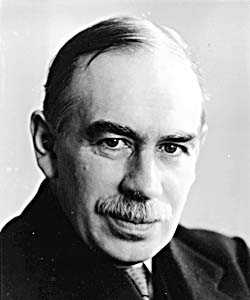
|
| Lord Keynes |
To a certain degree, these attitudes can be managed, as possibly illustrated by bankers. After all, bankers extend credit to financially secure borrowers at the lowest interest rates and refuse credit to the penniless clients who need it most. It is thus frustrating to discover that you can't have any borrowers unless you have some lenders, too. In the main therefore, the public remains tolerant of the differential cost of taking risks. However, the public is often intolerant of the true value of a banker's role: simultaneous exchanging of capital between those with a surplus, and those with a need. That's unforced barter; forced relief of need requires the use of political majorities, responding to political viewpoints. If votes were all that mattered, however, the growing proportion of the population in retiree status could afford to be more complacent than they are. So 30-35% of American GDP would now qualify as the spending of passive income, although the varying degrees of risk within such investment are hard to evaluate. The risk is sure to rise as more labor-intensive work gets globalized away. Observers notice a paradox: passive income seemingly increases as the labor to achieve it diminishes, quite the opposite of the 19th-century Communist idea of work as the source of all wealth. Rentiers are never far from the need to defend the value of non-work income, at the same time everyone seeks to avoid hard labor, except as recreation. Our inconsistency does need some fine-tuning.

|
| F Scott Fitzgerald |
In the future, one thing seems certain: a greater proportion of our population will be retired persons, living on pensions, rentier income from savings, and government handouts. As it becomes the universal expectation of everyone that thirty years of rentier life awaits in the retirement stage of life, there will be less chance for Keynes, Marx, and Fitzgerald to seem so congenial to the voting class. But take care; young people, particularly unemployed young people, are never far from asking, "And what have you done for us, lately?", as if fairness were something to be measured with a spoon.

|
| Karl Marx |
Curiously, one implication about rentier income has almost disappeared. Interest is paid by a debtor to a creditor; as Marx would have it, the poor workingman is paying the rich rentier. Dividend income represents the profit from a business to its owner or a farm to its farmer. But emotionally, that is hardly so. We have so sterilized the investment process that we seldom think of debtors and creditors but speak of "fixed income" and "fixed income investors". The income from ownership, or "equity", is now thought by economists to bear a definable relation to the "prevailing return from fixed income". To them, it's all the same thing. Future attitudes can be hard to predict, but although everyone seems destined to be both a creditor and debtor at the same time, the two are surely not the same thing.
It's also hard to predict Americans attitudes if passive income becomes say eighty percent of GDP. Or fifty percent of the population become rentiers. Eighty percent rentiers, if you exclude children. Americans worship work; even labor leaders cry out, "Jobs, jobs, jobs." Western Europeans, however, seem willing to sacrifice luxury in order to live without work as threadbare rentiers. Is that the product of brain-washing, or have they discovered some evil in work that Americans are unable to see? The ancient Romans once aspired to more luxury, fewer soldiers. Unsympathetic barbarian neighbors then wiped them out. Better do some thinking about this because the Law of Gravity will not save the situation, any more than history lends much comfort to it.
David F. Bradford, 1939-2005

|
| David Bradford |
We should take the word of his friend and colleague, Daniel Schaviro, that the core of David Bradford's professional career as an economist was his conviction that a very deep wrong existed when two people could earn exactly the same income over their lifetimes but the one who spent every cent immediately would pay less in taxes than the other who carefully saved for his retirement and heirs. Bradford was offended by this message our society was broadcasting.
Working for a time in the U.S. Treasury Department and later as a member of the President's Council of Economic Advisor's, he was able to explore the mechanical workings of tax law well enough to translate moral conviction into a workable proposal for political reform. In 1977 he published "Blueprints for Tax Reform", introducing these practical ideas at the highest level of academic rigor. The impact of his ideas in this paper extended through three presidencies, particularly the present one.
Bradford saw the tax injustice which penalized the Protestant ethic could be corrected in two ways. Either the tax code could shelter individual savings from taxes until they are spent (the IRA), or else convert the income tax into a consumption tax (like VAT). In either case, taxation would take place at the same time as consumption, rather than at the time of earning. Notice the person who saves money to spend later will suffer from both inflation and taxes on taxes on the inflation "gains". The political choice between the two proposed solutions was made by Senator William Roth (R, DE) who sponsored the Individual Retirement Account (IRA) and shepherded it through an intensely political Congress. His was a wise decision, since its voluntary nature made it attractive to politicians, while the French experience with a mandatory Value Added Tax (VAT) created political opportunities to favor certain industries, which politicians were quick to understand.
After twenty-five initially slow years, the eventual popularity of the IRA has now encouraged its extension to Social Security. That's what agitates domestic policy debate at the time of David Bradford's unfortunate death. The IRA model is also the basic concept underlying Health Savings Accounts (HRA), which struggled for many years but have reached their own period of growing acceptance. The Blueprints idea has thus dominated domestic politics for nearly three decades, while its originator remained largely unknown. Far from being a sign of weakness of the idea, it is a proof of the revolutionary nature of this simple concept that it initially provokes public resistance, but also inspires relentless tenacity among those who have taken up its challenge.
David Bradford returned to Princeton from his Washington experience, resting for decades at the quiet center of an Economics department that is not known for its quietude. After a most unfortunate fire at his home, he died of the burns in nearby Philadelphia, which hardly knew him.
Donor Intent
At least three of the greatest treasures of Philadelphia are now used in ways that almost certainly flout the expressed wishes of the donor. Steven Girard's
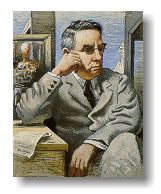
|
| Alfred Barnes |
bequest for the enhancement of "poor, white, orphan boys" is now devoted mostly to black children, many of the girls, many of them non-poor by some definitions, and many of them orphans only in a limited sense. Alfred Barnes wanted his art treasures to be used for education, outside the city of Philadelphia which had offended him, and definitely not part of the Philadelphia Museum of Art which he disliked. They are now to be moved to Philadelphia's Parkway, close to and under the thumb of, the Philadelphia Museum of Art. John G. Johnson's immense art collection now resides within the Museum of Art in spite of the firm declaration by this eminent lawyer that it was to remain in his house, and definitely not to be used to promote some huge barn of a museum.
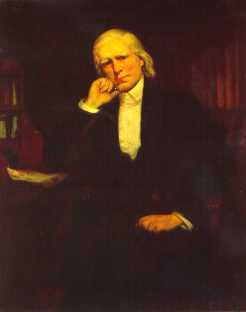
|
| William J Duane |
It's hard to imagine how any set of instructions could be devised to be more clear than these. Barnes employed a future Supreme Court Justice, Owen Roberts, to write his will. Girard similarly employed the preeminent counsel of his time, William J. Duane, to devise an extraordinarily detailed set of instructions. John G. Johnson was himself considered to be the most eminent lawyer in the city. In fact, he once received a fee of $50,000 for his opinion about a corporate financial plan, consisting of the single word "No" scrawled on its cover.
It would be interesting to know whether these famous cases are typical of the way wills are treated, either in this city or in the nation generally. Perhaps they are notorious mainly because they are so unusual. But perhaps they are indeed rather representative and stand as lurid examples of the general failure of the rule of law. Perhaps they reflect some deeper wisdom of the law, where Oliver Holmes intoned that the standard was not logic, but experience.
<Perhaps some guidance can be found in the decisions of Lewis van Dusen, Sr. who for several decades established the Orphans Court of Philadelphia as a model for the world to follow. Someone seems to have thought he set a good example. But was his reign an exception, or a glowing example of the triumph of society's wisdom over the crabbed grievances of dying millionaires in their dotage?
These remarks are made while the newspapers are filled with the story of a Texas billionaire who married a magazine model fifty years younger than himself. Some prominent local heiresses are known to have run off with their stable boys. Indeed, you don't need to read many tabloids to see a dozen examples of such behavior. Is it possible that some of them were acting up out of frustration at the probable betrayal by the courts of more reasoned instructions for their wealth?
Community Volunteers in Medicine

|
| Comm Volu In Medicine |
Mary Wirshup has a very different medical background from mine, but she's my kind of doctor. I couldn't help wishing, as she addressed our urban luncheon club, there could be thousands more like her, even while understanding more fully than she seems to, the reasons why doctors are driven from her behavior model. As we parted, it felt like saying a last goodbye to the Spartans marching to Thermopylae.
As 46,000 medically uninsured persons in Chester County get sickness and injuries, they know that a Federal Law prohibits a hospital accident room from refusing to see them, so ways are found to shunt patients to the CVIM free clinic, run by volunteers. This law is, in turn, a response to a government-created situation where a hospital which "accepts" patients must keep them. Any economics teacher can tell you that supply/demand issues are best addressed by price adjustment, so price controls in whatever guise lead to shortages. I must say I have little sympathy with the devious strategies which hospitals often employ to disguise their rejection of uninsured patients. At the same time, I know a lifeboat will sink if too many climbs aboard. Nevertheless, the semantic switch from lack of insurance to lack of care implies that only more insurance can surmount the barriers to care, which is absurd. For one thing, I know too many hospital administrators who are paid a million dollars a year, and one who is paid two million. And at least two health insurance executives are in the newspapers with a net worth over a billion -- yes, that's billion with a b. We have reached a point where reducing all physician income to zero would only reduce "healthcare" costs by 10%. As I look at Dr. Wirshup's modest clothing I can only surmise she plans to continue her modest living until she is 80 years old, after which her savings might see her out. Squeezing physician reimbursement is not intended to save significant money, nor intended to restore physician incomes to more equitable levels. It is intended to address the oversupply of physicians without confronting either the universities or the foreign trained lobby.
The elite tranche of medical schools do their part to relieve physician oversupply without reducing class size, through the encouragement of their students to go into research. I was well along at the National Institutes of Health before I finally decided I had not gone into medical school with that goal, and returned to teaching and patient care in a more satisfying model not too different from CVIM's obviously Pennsylvania Dutch spirit. The Amish at the far western end of Chester County reject the whole idea of insurance; their most characteristic statement is "Don't send me no bills." That attitude is rather a contrast with the shiny housing and automobiles in the Silicon Valley developments of Southern Chester County, or even with some rather bewildered Quaker farm families scattered over the rest of the county next to the horsey set. Chester County is America.
On Second Street in Society Hill, next to the park where William Penn's house stood and a few feet from Bookbinders, is the house of Dr. Thomas Bond. Bond conceived the idea of building the first hospital in America and with Franklin's publicity machine succeeded in getting it built, to care for the "sick poor". Dr. Bond started a second enduring tradition as well. When the Legislature expressed doubt that the institution was sustainable, he pledged to convince the local medical profession to serve the poor without charge. Some of the legislators who voted for the measure did so in the belief that charity care would never appear so the gesture would be without cost. The physicians did indeed come forward, in sufficient numbers to run many institutions for two hundred years. In 1965 health insurance made its national appearance and has regarded the benchmark low costs of charity care as a threat, ever since.
Immigration
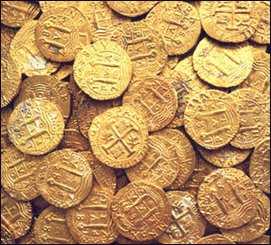
|
| Gold |
We're alluding indirectly to immigration as a general topic in this article because sooner or later every discussion of every aspect of immigration adds a claim of "fairness" to the balance. In this case, plain talk about fleecing peasants first requires the definition of an unfamiliar term. Seigniorage, also spelled seignorage, or seigneurage, originally only denoted a fee which governments charged for milling coins out of precious metal. Developing nations often didn't have the necessary technology, so they paid some other country to do it for them. That was fair enough, but soon "trimmers" would shave the side or surface of coins and gather up the dust for sale. That practice led to clever serration of the formerly flat edges, much simpler than weighing coins to detect cheats.
In time, improved printing techniques allowed governments to keep precious metal in vaults and issue paper currency, some of which inevitably got burned, shredded or lost. Since the issuing government could then keep the whole value of lost currency minus printing costs for itself, the term seigniorage evolved to include this more lucrative method for governments to cheat citizens, abusing their monopoly on the currency issue. There might seem to be some temptation for governments to print money on fragile paper, except it is overbalanced by the need to make it hard to counterfeit. Happily, this sort of seigniorage always seemed less offensive because everybody agrees that if you have money in your pocket, shame on you if you lose it. As transactions become more sophisticated, however, some innovative modern arrangements which loosely fit the definition of seigniorage become a new source of moral dismay. One facet of currency razzle dazzle concerns immigration, which is itself always a contentious matter.

|
| Spanish |
Right now, it is authoritatively estimated that the Social Security program has collected half a trillion dollars in Social Security and Medicare taxes, whose rightful owner is impossible to determine. Some of the beneficiaries may have died without claiming the money, so some of this topic might be classified as escheat, or abandoned by the owner. But very likely the bulk of this money, under modern circumstances, was withheld from illegal immigrants by their employers, either without their knowledge or using counterfeit social security numbers; and the fugitive status of the owners made them reluctant to claim it. Half a trillion is five hundred billion dollars.
This sort of discovery leads to some troublesome thoughts. If the immigrants are legal, or if now illegal may receive amnesty, they will be fully eligible for social security benefits. You might say they earned such benefits, but our tormented public pension system is in fact almost entirely funded by one generation funding its parents' generation. That borrowing between generations means paying for it later, so of course, it enjoys the politician spin-term of "pay as you go". An American of multi-generational descent has paid for his parents while he works and expects to have his own pension paid for by his children. An immigrant, never mind his citizenship, is paying the same taxes, but has no parents as beneficiaries. When the newcomer retires he may be a burden to his children like the rest of us, but his current payments go into the black hole of government deficits without paying for any parents. Here we have seigniorage on a much grander scale. The money presently diverted from the usual channels by this ingenious arrangement is calculated to be two trillion dollars, or four times as much as the paper money seigniorage, and many many times as much as the shaved-coins scam. Just for comparison, consider that America is estimated to have 900 billionaires. Their aggregate net worth is probably only slightly greater than the amount our government garners from illegal immigrants.
The matter really does seem to be important enough for us to learn how to spell seigniorage, and even reconsider whether to apply the term to its most popular current manifestation.
Africa Comes to the Schuylkill
A journalist, John Ghazvinian, recently toured the many countries of Africa, wrote a book about it and carried his message to the Right Angle Club of Philadelphia. Philadelphia does not think of itself as particularly involved in oil matters, or African ones. But the fact is the refineries on the Schuylkill down by the airport generate two-thirds of the gasoline now used on the East Coast, and right now it mostly comes from Nigeria. There was a time when the crude oil coming to Philadelphia came from Venezuela, but politics are a little unpleasant there at present, and anyway Venezuelan oil is heavy and full of acids. The refineries which specialize in that kind of heavy oil are on the Gulf Coast. Long before the Venezuelan era, the Philadelphia refineries were constructed to refine crude oil from upstate Pennsylvania. They were once the main source of the dominance of the Pennsylvania Railroad, because oil refining from Bradford County gave the Pennsy a return freight, whereas the competitive railroads running out of New York and Baltimore had to return from the West without cargo.

|
| African Map |
There are 54 countries on the continent of Africa, quite different from each other in character. One dominant characteristic of Africa is its lack of natural ports, and even the Mediterranean ports are cut off from the rest of the continent by the huge transcontinental stripe of Sahara desert. Major wars and famines, monstrous genocides, unspeakable cruelty, and poverty go on there without much notice by the rest of the world.
The largest country in Africa is Nigeria. Anyone with even minor dealings with Nigeria soon sees that corruption and dishonesty pass all Western imagination, and they have serious tribal warfare as well. The discovery of large deposits of oil in the region faced the international oil companies with a rather serious difficulty. For instance, Shell Oil has had over 200 employees kidnapped for ransom and is seriously contemplating abandoning its whole venture. At the moment, corruption is coped with by constructing oil wells a hundred miles out in the ocean.It's almost true that the huge tanker ships make from Philadelphia and return, without the crew talking to any natives of Africa.
We hear that genocide is in full bloom in the Sudan, and that poverty in that country similarly passes belief.

|
| Chad Poverty |
They have oil in the South of Sudan so we may hear more of it. Chad has poverty and oil, and civil war. They have a big Exxon facility, but there isn't a single gasoline station in Chad. At the moment, Angola has paused in its enormous civil war, which killed millions, and Chevron will surely encounter unrest before it is done. Gabon appears to be extremely prosperous, from oil money of course, but they are being ravaged by the Dutch Disease, of which more later.
Apparently, Equatorial New Guinea sets some sort of record for wild behavior. It has lots of oil, and a strong Chinese influence. The current

|
| Mbasogo and Jintao |
President of Equatorial New Guinea got his job by shooting his uncle. But don't feel too sorry for the uncle, who used to have an annual Christmas morning celebration, consisting of herding his enemies into a football stadium, and shooting them for the edification and entertainment of the populace. After listening to Mr. Ghazvinian, it seems small wonder that so few American tourists, or journalists, or even missionaries, manage to complete extensive African excursions. As everyone notices, if you don't have journalists, there is never any news.
Let's turn to the Dutch disease,

|
| David Ricardo |
of which Africa currently displays many examples likely to torment economics students for decades after Africa eventually rivals Houston. Let's start with David Ricardo, who electified the Nineteenth Century world of economics with his principle of comparative advantage. Ricardo pointed to the obvious truth that always and everywhere a nation does best for itself by identifying its best economic feature and then sticking to it. If every country wakes up and does that, every country must then trade with its neighbors for other things it isn't so suited to make. Consequently, tariffs and trade barriers are a hindrance for everyone, in time impoverishing all nations in the cycle, whatever short-run advantages of tariffs may seem enticing.

|
| North Sea Gas |
So far as I know, Ricardo was quite right, but someone had better hurry up and reconcile his underlying premise of comparative advantage with the Dutch Disease. The Dutch disease was identified and named by an anonymous writer for the London Economist about thirty years ago. Noticing that the Netherlands experienced a marked worsening of its general economy after the discovery of North Sea gas deposits, the observer for the magazine concluded that sudden accumulation of wealth in the gas industry led to a rise in the value of the Dutch currency, soon making it impossible for non-gas industries to export, unable to compete at home with now-cheaper foreign imports. Naturally, investors rushed to invest in gas, sold their holdings in other industries, and Holland was propelled in the direction of a one-industry economy, quite at the mercy of fluctuating prices of gas. This was the Dutch Disease born, and Ricardo's principle of comparative advantage exposed to quite a severe challenge from which it has not completely recovered. This is important, so how about a simpler description: When gold is discovered, people drop tools to have a gold rush. Wealth lost from dropping tools is greater than wealth gained from the gold.
Fear of the Dutch disorder seems to be the reason why the Chinese are buying our Treasury Bonds, the Japanese engaging in the astonishing "carry trade," and the Arabs buying American private equity funds. The common strand through all these schemes is this: By sending their bonanza savings abroad, they "sterilize" them from their tendency to force their currency upwards. They are exporting inflation, but also endangering their own struggling non-bonanza industries, which are the main hope for diversifying their economies and getting rid of the Dutch effect. Somewhere during this balancing act, politicians get involved and make things worse. So they call in their generals and admirals, to explore solutions we prefer they were not in a position to explore. Simpler description: When you discover oil, inflation soon follows. And all too often, revolution follows that.
The 1787 the American Constitution unknowingly cured thirteen cases of the Dutch Disease, by imposing absolute freedom of interstate commerce. After eighty years, the benefits of this national union would persuade the North to bleed and die for it. Although the Confederacy thought they were fighting for their way of life, meaning slavery, even the Southerners today recognize they are better off in a Union. Unfortunately today, the European nations are still having a hard time believing the benefits of union could possibly outweigh their allegiances to language, religion, and the wartime sacrifices of their ancestors. They are very wrong, but we are wrong to sneer at them. Except for maybe Switzerland, it is difficult to name another instance in all of history where several independent states gave up local sovereignty for the benefits of a diversified economy with local pockets of comparative advantage. Let's restate it again: the Dutch disease is a result of sudden single-industry prosperity in a country too small to control it.
By the way, what eventually happened to the Dutch? It seems likely that absorption of little Holland into the European Common Market helped dilute the corrupting effect of gas prosperity. It suggests the possibility that Dutch can be reconciled with Ricardo through the common denominator of reduced national barriers to trade and currency-- reduced sovereignty in a milder form. But it's a hard slog. Maybe we could envision annexing Alberta to soften the commotion of oil tar, but it takes a lot of imagination to see the amalgamation of China and India, any time soon. There may thus be nations too big to merge, but nevertheless, it would probably be less destabilizing to merge with all of Canada than just with Alberta if you overlook the obvious fact that it is easier to persuade a small country than a big one. Just kidding for the sake of example, of course, since Canada shows no interest in the idea.
Meanwhile, take a look backward from the highway overpass the next time you travel to the Philadelphia Airport. There's a lot more going on in those refineries than just black liquid flowing into steel pipes.
Hayek Confronts Keynes

|
| The Four Horseman |
Catastrophes seem to have fashions. There was a time when the four horsemen of the apocholypse -- pestilence, war, famine, and death -- rounded up the main things to keep you awake with worry. Perhaps it is too soon to gloat, but pestilence and famine seem tamed, even ready to be "put down". War remains a serious cause for concern, but a case can be made that two economic disasters, inflation, and recession, have moved up to dominate our nightmares. Indeed, it is the Summer of Love in 1967 which seems to mark the watershed moment, when basic survival stopped being the main risk in life, supplanted by threats to existence that are largely self-inflicted. The first warning of this sea-change appeared in the fall of 1929 when it seemed to be deflation, unemployment and all the other havoc of economic recession that caused wars, famines, and pestilences. The 1929 crash did not send a fully readable message, however, because it was so one-sided. It took another 37 years for the world generally to appreciate there was an opposite side to it; inflation was just as bad as recession, and both problems were largely man-made. One person gets most of the blame for the distorted emphasis. John Maynard Keynes, later Lord Keynes, was the prophet who seemed to save the world with the doctrine that the deflation emergency was so dire that civilization could not afford to worry about the long-term drawbacks of deliberate inflation. He persuaded world leaders to inflate the currency before civilization disappeared. After all, in the long run, we are all dead.
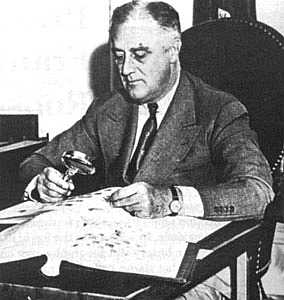
|
| Roosevelt Stamps |
There's an irony that Franklin Roosevelt was a hobbyist who collected postage stamps because stamp collectors were about the only Americans who were dimly aware that Germany and Austria had hyper-inflation as the main curse. Austrian postage for billions of marks gradually filtered into our collections of odd foreign stamps, arousing mild international curiosity. But Friedrich August von Hayek was living in the midst of it, painfully aware of its pain and chaos. It became the central focus of the life of an aristocratic decorated war veteran who became a distinguished economist, eventually winning a Nobel Prize. What caused inflation? Why didn't it stop? Why was it so destructive? How can inflation be prevented? How could Maynard Keynes possibly urge the leaders of nations to inflate their currency deliberately?
As a scholar in the dismal days of world depression, Hayek had a hard time, living for long periods on the charity of a few philanthropists who recognized his talents. He is best known for his scorching analysis of collectivism, a craze which swept through academic and political leadership, particularly in Europe, and his persuasive views probably constitute the main intellectual force which ultimately ended the Cold War. It is seriously stated that personal animosity by Socialist-leaning academics materially injured his academic career, although it probably gave him more time, and motive, for serious writing. Inflation and political collectivism do not seem tightly connected, but it is easy to observe that command economies do inevitably clash with private property and market decisions. For the present, it seems useful to set aside Hayek's monumental political achievement of discrediting Communism and focus on his penetrating view of inflation.
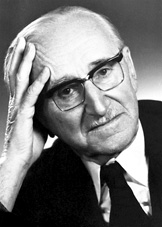
|
| August von Hayek |
You can almost watch his mind at work. If you give long hard consideration to the topic of inflation, you have to conclude that there seems no reason for it to be a bad thing. It may take a little time, but the price of everything will eventually readjust to a new higher level, and relationships will go on undisturbed. At first glance,
You can almost watch his mind at work. If you give long hard consideration to the topic of inflation, you have to conclude that there seems no reason for it to be a bad thing. It may take a little time, but the price of everything will eventually readjust to a new higher level, and relationships will go on undisturbed. At first glance,
inflation is just a harmless numbers game. You can understand the power of inflation; everybody likes a little of it for his own personal benefit. If everybody enjoys a little of it in his own sphere, then the whole world is pushed to a higher numerical level.
After long consideration, Hayek came to see that the disruptions of inflation are caused by the uneven speed of penetration throughout an economy or nation. If the price of oil goes up, the price of transportation goes up, then the price of home heating. But those who take the train or who heat their homes with coal are not affected so soon. Mortgages carry a fixed interest rate for thirty years until the unwisdom of such agreements becomes clear, but it takes time. The process of inflation creates winners and losers, and disruption in the culture of payments. The speed of payment is itself a factor in the virtual size of the monetary pool. In the long run, we're all dead and it all settles out unless we set in motion a universal scramble to get out the door before others get there. Inflation is just as much evil as collectivism, and somehow the two are usually seen together. The Road to Serfdom sits on the shelf, right next to The Austrian Theory of the Trade Cycle, and Other Essays .
Health Maintenance Organizations (HMO)

|
| HMO |
It's an ancient wrangle whether a manufacturer should actually own its suppliers or the reverse; or instead whether it's healthier for industry components to stand at arm's length from each other. At issue is not only what is best, but what is fair. If industry mergers seem sufficiently unfair, it will be proposed they should be illegal. That's the main substance of a lot of antitrust argument. Unfortunately, what is valid in good times may be reversed in a downturn. A prosperous supplier of materials often acts as a "cash cow", saving a merged enterprise from bankruptcy. Unfortunately, within a different economic climate one badly failing supplier can bring down the whole merged enterprise. There's also organizational friction; a temporarily prosperous unit may get to thinking it should boss the less prosperous units around. At the very least, the cash cow resists the use of its cash reserves to help "losers". Several centuries of experience have thus left a minefield of old laws, traditions, and ingrained prejudice to undermine any broad standards for what is best. In no field is this truer than the Medical Industry.
Eighty years ago in Houston, the first Blue Cross health insurance company was started for a single group of school teachers to pay for service in a single hospital. That expanded to other subscribers and other hospitals, soon making it more workable for insurance, subscribers, and hospitals to stand at arm's length, allowing for a variety of local combinations. During World War II, combat in the Pacific led shipyards to be built on the West Coast, but westward migration of steelworkers was hampered by lack of local medical facilities for them and their families. Taking advantage of the loophole provided in the wartime wage and price controls, Kaiser Industries attracted medical personnel by building hospitals, paying salaries, and offering physicians ready-made medical practices. Because of various licensing laws, Kaiser's medical enterprise was divided into two corporations, Kaiser and Permanente, so a specialized corporation within the Kaiser-Permanente Foundation could accommodate the licensed practitioners. The salaried nature of the physician organization immediately caused trouble with local fee-for-service practitioners, who were thus excluded from a large population in their neighborhood when they could not readily adjust to varying mixtures of the two payment methods. Their reaction, led by an obstetrician in Stockton, California, was also to organize dual-corporation structures which were exclusively fee-for-service. Because Kaiser had a Foundation, they also called their organizations Foundations for Medical Care. Then, as now, it proved difficult to run a practice with two different reimbursement philosophies in the same waiting room; in time, friction between the two styles tended to increase as doctors who were more comfortable with each style tended to segregate themselves. Since offers of salaries are more immediately attractive to newly-trained physicians, they flocked to California to serve the steelworkers who were in need of doctors. Fee for service, on the other hand, allowed the gradual assembly of a more durable practice composed of patients who could test what they liked before making a permanent allegiance. Essentially, the transients went to Kaiser, more permanent settlers used fee-for-service.
Thus, it came about that several models for health care reform were tested in a few smallish towns of central California. These demonstration experiments may perhaps not meet everyone's standard for scientific purity, but at least they were public examples with the dumber features knocked away. They certainly provided a laboratory where ideas could develop about topics that otherwise were merely opinions and unsupported conjecture. The Foundations demonstrated that physician-dominated organizations could contain costs and maintain quality in a satisfactory way; there had previously been doubted about their ability to contain cost. The Kaiser organization showed that salaried practice performed acceptably as well, both to most staff physicians and to a majority of the patients; there had been doubt about the willingness of the public to limit choices to a panel of assigned physicians, mostly young and usually from elsewhere. Finally, the two systems seemed to be able to live together more or less peacefully; indeed, the California public seemed reassured that two systems apparently kept each other in check.
The first main difference rested on the system of quality control. The local Foundations developed review systems based on peer review and peer pressure; these worked remarkably well, particularly in constraining non-physician costs like pharmacy, tests, and hospitalizations. Cost and quality control in the Kaiser system was more rule-bound and quicker to apply discipline, kept within bounds however by the ability of both patients and staff to jump ship for the other system. Aside from professional peer review, the Kaiser system experimented with owning hospitals, laboratories, pharmacies. Here, the experience directly paralleled the experience of manufacturing industry with its suppliers; when reimbursement was generous suppliers generated welcome revenue. When reimbursement was constrained and substandard, ancillary service losses were unwelcome. Taken overall, the Houston experience was repeated, that ownership of such facilities was mostly a headache. Indeed, subsequent experience has shown the two systems usually co-exist nicely within independent ancillary facilities.
The Stockton, or Foundation for Medical Care, approach grew popular in the West. The variant which grew up in Utah was locally popular and attracted the attention of Senator Wallace Bennett. The Bennett Amendment to the Medicare Act then picked out the peer review system as the secret of success and set up a nationwide system of Professional Standards Review Organizations (PSRO) to conduct peer review of Medicare and Medicaid patients. The drawing of boundaries around these organizations was the most difficult part, and sometimes the boundaries were inept. Rural districts were adamant that the standards of big-city medical schools were not to be applied to their scattered resources, and urban areas saw themselves as ancient Rome surrounded by hostile tribes. Although these difficulties were foreseen, it is not always possible to draw a line that will separate the cultures, particularly where the outward migration of suburban housing was more rapid than the construction of suburban medical facilities, leaving the medical culture unstable. The PSRO system was quite successful in many areas but caused trouble in others that were not adequately addressed. The central concept of the review system was that the doctors who worked together could quite readily identify the outliers, and better than anyone else could judge whether the local situation was justified. True, some practitioner might try to abuse the system to the disadvantage of his competitor, so no adverse decision was final until there had been an opportunity for outside appeal. There might even be a few circumstances requiring a still higher appeal. The system was new and untried, but it produced eminently satisfactory results from the point of view of the Federal Government paying the bills. As former President of one of the largest PSROs in the country, I will assert that there was remarkably little friction or resistance in the medical community. My very good friend, the President of the New York City PSRO says much the same, and most people would say that if you can carry off a new system in New York without a lot of argument, it must work pretty smoothly. The Government wanted to eliminate unnecessary Medicare costs, particularly in hospitals, and it wanted to maintain peace with the medical profession. Hospital costs are obscured by the wide gap between posted charges and true underlying costs, compounded by disagreement about the proper assignment of overhead charges. Charges were not the assignment of the PSRO, utilization was. Days of hospitalization per thousand enrollees fell from roughly 1000 days per thousand to roughly 200 days per thousand, and that satisfies me at least that we were doing our job; physician peer review was doable.
It is likely, however, that peer review was much more apt to produce friction in rural districts. Philadelphia has had more than a hundred hospitals for more than a century. Birds of a feather tend to flock, so the sorting-out process was already far advanced by the application of constrained referrals to practitioners who failed local standards. Mixing members of different hospital staffs on appeals committees was easy in the big cities, and the naturally censorious tendencies of many physicians could be safely counted on to produce adversary balance. Most committees seemed visibly pleased, even relieved, to discover generally good quality in their competitors' practices. However, in the much smaller and more scattered institutions in the nation's regions with low population density, these informal arrangements cannot stretch as well. When there is only one specialist in a field, for example, it is sometimes hard to know whether he is a good one or not, but always easy to say whether you like him or not. Where the population thins out, much greater wisdom is required to make judgments, the number of close cases is greater, and the limited supply of judicious reviewers is similarly stretched. At least that is my surmise, based on knowing the background of most of the AMA delegates who eventually voted 105-96 to condemn the program in a standing vote. The result was the Dornenberger Amendment, which much weakened the system when instead it should have triggered a more profound analysis and reconsideration.
Perhaps we spend too much time here describing a technical process. It is, however, at the heart of what makes the Foundation approach (sometimes called IPA or Independent Practice Association) superior to the HMO. It is now perfectly clear that both doctors and patients vastly prefer the IPA approach to the HMO, and any reasonable politician would jump at it. But there is one fear, summarized by the slogan that the Fox is guarding the Henhouse. In both systems, an attempt is made to combine insurance with the delivery of health care. In the IPA, the physicians are taking the financial risk that aggregate income will exceed aggregate costs; it's a risk contract. In the case of an HMO, the employer or the government is taking the financial risk and therefore wants to control it. If revenue is good, the doctors will prosper in an IPA; the insurance company intermediary will prosper in an HMO. Doctors will care about that little difference, but why should the rest of the country care?
Because the prospect is overwhelmingly likely that future revenues will be constricted until something hurts, and when you starve with a tiger, the tiger starves last. In the case of an HMO, the insurance middlemen will starve last, and the quality of health care will starve fairly early. That's an unwise design. When we get to the point where Congress cuts the budget and watches to see what happens, Congress will cut it some more if nothing bad happens; it will back off only if something bad happens, so something bad is certain to happen. In designing the system, you need to design the internal review authority so it will cut the waste, inefficiency, and luxury first. The reviewer, no matter who it is, will cut himself last, so you need to arrange the incentives for waste to be cut before the reviewer suffers, and quality of care only after the reviewer has suffered. If you wonder why a whole lot of special interests hate physician-dominated review systems, a short answer will be found in this synopsis. A special exception must be devised for rural health systems, which do have a unique problem.
To return to the well-worn slogan about foxes and henhouses, we have overlooked the central question. Who's the fox, and who is the hen?
OUR NICE HOUSING BOOM COLLAPSES
Three Basic concepts at work:
- Steep yield curves (the normal situation) are good for banks; inverted curves (a rarity) are not. The 2006 inversion was caused by the bond market accepting abnormally low long-term interest rates, so the "spread" between risky loans and safe ones displayed a diminished "risk premium".
- The Federal Reserve then lowered short-term rates by printing more currency.
This caused an inverted yield curve to return to its normal shape, but the 2006 problem was caused by too much(Chinese) money and this action added to it. The banks were rescued, but the currency was inflated. - This innovative response will probably become a standard readjustment.
But it only keeps the ship from tipping over after a sudden wave; it doesn't address the approaching storm.
 Risk premiums soared in August 2007. What seemed safe, abruptly was risky, and only available at higher prices. 
|
What happened in August?....The "risk premium" --and, consequently, mortgage interest rates-- suddenly went back to normal. About $90 billion of foreclosures seemed probable. We had built far too many houses for people who couldn't afford them. Surplus houses remain for ten years, depressing all real estate prices, making everybody feel poor. Recession, anyone?
What did the Federal Reserve do? To protect the banks, Bernanke dropped short term interest rates. (This steepens the yield curve.) As the panic spread, he dropped rates some more (This floods the country with money). Inflating the currency cheapens the dollar, which robs foreign investors. Foreigners sold stock to escape, prices fell. Seeing prices fall, everybody else sold a stock. 1929, anyone?
So what? They're only foreigners. If Bernanke raises interest rates, we get a recession. If he keeps them low for too long a time, we may get hyperinflation. So, he probably hopes to drop them for a few months, then raise them again. Jimmy Carter got "stagflation" trying this sort of thing. Green eyeshades, anyone?
Remember how naughty "redlining" was? Well, now we bash the banks for "stupid mortgages". Banks issued cheap mortgages for inflated real estate -- and immediately sold the "subprime loans" to investment bankers as "collateralized bonds". We are still uncertain who holds these things, but at least $40 billion were in the hands of Wall Street when the music stopped. Wall Street had to sell perfectly good (?) stock to pay their debts. Blue chips, anyone?
Why was the risk premium so low? The Far and the Middle East had something to do with it. But mainly, securitization led to undue emphasis on statistics. In a housing boom, foreclosure rates seem to go down but are really only being diluted by new loans. The fall of BNP Paribas was a sudden wake-up. Then, the computers of the "quants" exposed a flaw in their programs when they detected heavy selling of perfectly good stock and announced the End of the World..
Thank heaven it happened before things got serious.
WWW.Philadelphia-Reflections.com/blog/1331.htm
Making Money (8): Virtual Money
 When money was tangible you had to guard it, now that it's mostly virtual you have to verify it. Hardly anybody can, and that's a problem. 
|
When money and wealth were wampums, precious metals, and paper currency, these physical objects required physical protection. It was all a big nuisance, with six-guns on the belt, bank vaults, and appraisers of one sort or another. But now that wealth is merely a bookkeeping entry on someone's computer, things may be even more nuisance because verification is almost beyond us. Counterfeiting of the computer variety must be left to institutions to detect or deflect, causing them to introduce firewalls of various sorts that also block legitimate inspection by customers. "Trust but verify" doesn't work so well in this environment. Let's use a personal example, slightly fictionalized to protect the innocent.
Several software products now exist to download transaction information automatically from various institutional sources to a customer's home computer; they are either free or cost a nominal amount, and are quite "user-friendly". In my case, however, the reports they generated were quite significantly at variance from the monthly reports which were issued directly by my counterparties. Dear Sirs, Please explain.
What I soon discovered was that everyone blamed someone else, and everyone blamed me for bothering them. Quite obviously, I had little understanding of these specialized accounting niceties, and quite obviously I had too much spare time on my hands. Telephone help desks, often located in India, will not give out telephone numbers for incoming calls and are programmed to check the size of your account before placing you in a call-back queue. The first call is usually taken by a trainee whose job it is to screen out the silliest sort of help request, and then to refer to a supervisor if things rise in complexity. Supervisors have supervisors. That's if you are lucky. More commonly, the tedious software business has been farmed out to a vendor, and the contracting agency has neither the necessary understanding of the issue nor any ability to fix it. From the sound of it, the vendor often gives the contracting agency the same sort of isolation treatment that they would give a customer if he could find their telephone number. And guess what. At the end of the day, one of those high-handed defensive linemen -- turns out to have been at fault.
Let's explain one problem. On the surface, we were talking about a $40,000 difference in account balances; one may have been correct, but a second one must have been wrong. That rises to lawsuit level, so the matter got intensive study. It turns out the stockbroker had misinterpreted instructions for a "sweep-account" system. When a stock in your portfolio pays a dividend, the amount of the dividend is subtracted from that stock's line item and added to the line item of your money-market fund. That's fine, but there is one exception. When the money market fund itself pays a dividend, subtracting that dividend cancels out the addition, and the dividend essentially disappears from your net worth. Was this intentional? Certainly not; no one could stay in business doing that. It's not even a highly stupid error, since you can easily see yourself making the same oversight of the one implicit exception to the rule of sweep accounting. Because of this "bug" in the program involved one institution making a mistake and transmitting it to a second institution, the systematic error did not unbalance any books, until it reached mine. But since I did not detect the error for five months, there must be dozens, hundreds, maybe thousands of customers who did not detect it. Ouch. Do the math yourself to judge whether this was a serious error.
This illustration, only one of several on my personal report, leads to at least two larger principles. The first is that the transformation of money from tangible to virtual has occurred so rapidly that bullet-proof safeguards have not had time to emerge. After a century of use, most people cannot balance their checkbooks, but enough people can balance them so that systematic errors are not likely to slip past. When enough people with home computers repeatedly test the internal complexities of their virtual money accounts, confidence will develop that the system is probably working. Confidence is an important matter; it is possible to imagine quite a bank panic if the public suddenly got the idea that virtual money is maybe a mere vapor. In fact, the securitized credit panic of 2007 is a little like that. With a few new regulations and a lot of computer programming it surely will be possible to know who owns how many bum mortgages. That innovative mortgage system got ahead of its tracking verification, and we now just have to hope nothing serious happens before that gets fixed.
The second important lesson is that our health insurance system has a similar problem of far greater size and complexity. We are here talking about at least ten percent of Gross Domestic Product, in which one daily unit of measurement is in truckloads of insurance claims forms. Stocks and bonds are admittedly complicated but compared with thousands of different diagnoses, drugs, procedures, and hospitals -- verifying financial transactions is trivial compared with measuring medical ones. With a twenty billion dollar budget and ten years of lead time, we might have a shot at it. Except for the fact that during the ten-year interval, medical care will have changed so much, you will have to start over on the project.
Gloomy Future for Banks
 Banks pay depositors modest interest rates, lending to borrowers at higher ones. This is known as lending long and borrowing short. 
|
One of the many Joseph Nicholson's in Philadelphia once surprised me by criticizing Paul A. Volcker as merely a tool of the banks. That distinguished Chairman of the Federal Reserve had always been, and still is, one of my heroes for rescuing the nation from inflation. Instead of wringing his hands at inflation, Volcker had the courage to jolt short-term interest rates right up to 8%. It must have caused a lot of pain to some people, but in retrospect, it was exactly the right thing for him to do. How could anyone complain about his helping the banks when he was helping the world economy for everybody?
The answer is that the old Quaker felt 8% was too little, Volcker should have gone higher. In fact, banks always have comparatively little at stake in whether interest rates are high or low. Their profit lies in maintaining a steep yield curve. Which is to say, as long as short-term rates are safely lower than long-term rates, the banks make a profit. It may be hard to recollect, but typical interest rates facing Volcker were then about 18% for long-term loans. Joe Nicholson had a point when he complained that a 10% profit seemed too generous, but for Volcker to raise short term rates to say 15% would have been seen as the act of a madman. In fact, 8% did turn out to be adequate for curing inflation, so this episode had a happy ending for both inflation and bank profits. Borrowers commonly feel that banks are greedy, but remember they must accumulate reserves. If the yield curve becomes "inverted" for a protracted time (that is if ninety-day rates are higher than ten-year rates) refusing to make loans is the only alternative to spending reserves. If that fails there can be bankruptcy, usually triggered by runs on the bank by depositors in a panic.
Long term rates are set by the bond market, short term rates are set by the Fed. This limits the traditional ability of the Federal Reserve to sustain the viability of banks to one simple tool, keeping short term rates below whatever rates the bond market sets for long loans. In recent years, however, banks have a new competitor for deposits in the form of money market funds. The new formula for what banks want in their Christmas stocking is for the Federal Reserve to set short-term rates well below the market-set rate for long-term rates; but mind you, only slightly below the market-set rates for money market funds. Caught between these two implacable limits, the Federal Reserve has a small room for safe maneuver. It is disquieting to hear that fluctuations of market-set interest rates are very difficult if not impossible to understand. Alan Greenspan called them a "conundrum".
And so, when you see pictures of the Federal Reserve Chairman riding off in a long limousine, he may look fully equal to the responsibility of keeping the world from financial collapse. Someone on the sidewalk once muttered that a man with a beard always looks like he's hiding.
Report Identity Theft to the Secret Service

The Internet provides new blessings, but new problems as well. Identity theft has now ballooned from a rarity to a fairly serious issue. After initial turf confusion, the issue has been assigned to the U.S. Secret Service. If it happens to you, that's where you make your anguished call. (1-877-ID-THEFT) or www.consumer.gov/idtheft
There's a certain logic to regarding identity theft as a modern form of counterfeiting, which has been with us since the days of William Penn. Shirley Vaias, representing the Philadelphia regional Secret Service, recently addressed The Right Angle Club of Philadelphia on the topic. It makes sense to learn the Service is headquartered on Independence Mall, across from the Mint. The crude forms of printing in the 18th Century made counterfeiting easy, and ever since the early days, there's been a race between improvements in technology and improvement in counterfeiting. We now have a paper with little red fibers in it, watermarks, serial numbers, color-shifting inks, microprinting of secret messages in the portraits, special magnetic strips, and probably lots of other clever things we aren't told about. The Bureau of Printing and Engraving is changing the currency, one bill at a time, and recently there was a new ten-dollar bill. A counterfeit version was in circulation within six hours.
ATM machines are equipped with counterfeit-recognition devices, and special gadgets are provided for banks and retail stores, but one detection device traditionally catches most fake bills. After handling huge amounts of currency, bank tellers catch a counterfeit just by the feel of the paper. Color photocopiers are getting better and cheaper, but of course, they can't change the serial numbers, so they aren't as smart as they seem. About one-hundredth of one percent of the currency in circulation appears to be fake, so you are pretty safe, but the possessor of a bad bill is deemed to be the one out of luck. The consequence is that many citizens suspect a bad bill, take it to a bank and have it instantly confiscated without recourse. That would seem to discourage reporting a counterfeit, encourage passing it off to an unsuspecting friend, and overall seems terribly unfair; but it results from the wisdom of the ages. Experience shows honest citizens are indeed tempted to try to pass the money on. While the banks don't enjoy being policemen, the effect is that counterfeits will circulate until they hit a bank, and thus confiscation is fairly comprehensive.
As the printing of money gets more complicated, the special presses needed to produce good money has become a monopoly of certain German companies, who sell the machines to other countries. Some of the American presses thus got into the hands of some Russians, who sold them to the North Koreans. So for a while at least, the North Korean government was printing American currency. It provoked vigorous countermeasures, the nature of which is confidential.
A bill of any denomination costs the government about half a cent to produce and lasts about four years in circulation. When tons of old bills are retired from circulation, the serial numbers are recycled; to an outsider, that sounds like an impossibly tedious job, but they say they do it. There's also the issue of seignorage, a term for the profit the government makes when the paper currency gets destroyed in one way or another, costing less than a cent to replace. Just how profitable the currency business is, cannot be accurately determined, because a lot of it is buried or hidden in mattresses and might someday resurface. But there is a substantial profit, which like any shrewd businessman, the government weighs against the cost of detection. Bail bonds and casinos are big sources of bad money, as could be readily imagined, and hence it is in their interest to get pretty sophisticated (and extremely unpleasant) about detection. On balance, however, it can be expected that legalized gambling in Philadelphia will promote more counterfeiting in the local economy, and hence is an offsetting cost of the tax revenue.
Over the centuries, governments have learned how to cope with counterfeiting, and there is actually much less of it than a century ago. You win some and you lose some; life just goes on. With internet identity theft, however, the criminals are developing techniques faster than governments have learned to combat them, and it is governments who struggle to catch up. Unfortunately, everybody takes a business-like approach to the matter, asking whether the precautions cost more or less than the losses. It would seem that if money continues its migration from paper currency to bookkeeping entries, it will eventually seem unsatisfactory for only one party in a transaction, a bank let us say, to keep the books while the public simply trusts them. Eventually, each individual will be forced to seek the protection of some sort of computerized system keeping the counter-parties honest, on behalf of the public, and to prevent a paralysis of commerce. Identity theft is getting expensive enough to warrant the effort.
Just how to do all that is not too clear. So, in the meantime, just let the Secret Service figure it out.
What's a Repo?

|
| Bear Stearns |
On St. Patrick's Day, 2008, Bear Stearns became insolvent and was given to J P Morgan. The Federal Reserve assumed all risks. Effectively, the fifth largest investment bank in America was nationalized for $2 a share, because no private bank would buy it at any price. A year earlier it was worth $170 a share, even one trading day earlier it sold for $26.
At the heart of this catastrophe were "repo's", or repurchase agreements. (They should not be confused with repossessions of cars and other hard goods bought on time, which are also called repo's.) Although most people had never heard of the high-finance version of repo's, the volume of these instruments had grown to $5 trillion by January 2005, presumably even several times larger than that when they caused the nationalization of Bear Stearns. Newsmedia accounts offered the guess that 16% of the resources of the whole financial sector were caught in open repo's when the music stopped. Repo's must be awfully good, or awfully bad.
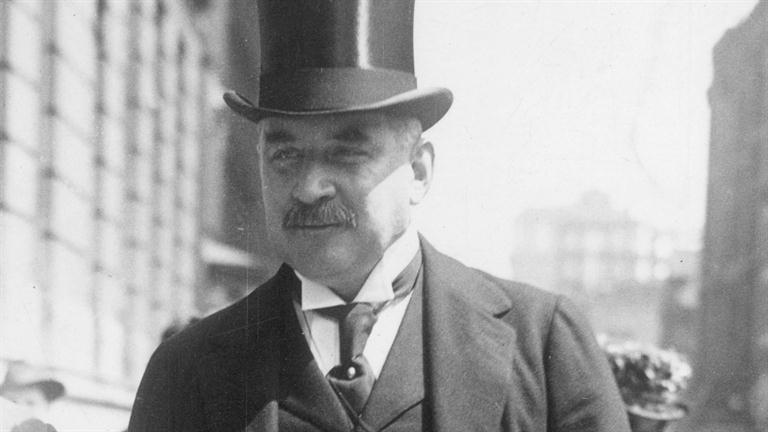
|
| J.P. Morgan |
They were both of these things at once. Like so many innovations in the post-computer era, they offered a major cost saving to an inefficient transaction system but were so successful they overwhelmed the institutions which flocked to their reduced cost. The unanticipated difficulties might have been imagined, but they were not adequately guarded against. Essentially, these loans limited exposure to a few days, a feature that made them appear quite safe. Unfortunately, tons of these loans could expire simultaneously if a rumor got started and everyone held off using them for a week. With a run on a bank, at least people have to take action to withdraw their money; but with these things, simple inaction quickly led to massive cash shortages at the bank. Speeding up the loan process had made it cheaper, but made it vulnerable.
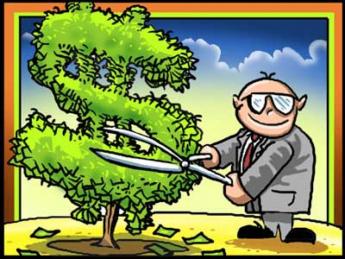
|
| Hedge Fund |
Consider the inefficient complexities of a bank loan. The bank wants collateral, perhaps 80% of the value of the loan. The ability of the borrower must be investigated, a clear title assured, and papers arranged for transfer in case of defaulted collateral. Lawyers must organize the agreements, and it all takes time, costs money. To go through all this for a one-week loan for anything less than huge transactions is simply not practical. So the idea was devised to sell the collateral to the lender at a discount, together with a repurchase agreement to buy it back at full price. For safety sake, the discount could be greater than the interest cost, and part of it returned if all went well. The collateral could be held by a third party, who essentially guaranteed the details while the collateral itself never moved. Bear Stearns had perfected these variations at such favorable prices they dominated the market for them with hedge funds; the margin for error narrowed when interest rates dropped, cash got scarce when investors got uncomfortable, the whole hedge fund industry was suddenly paralyzed, and everything connected to hedge funds was frozen secondarily. Much of this was handled automatically by computers, so huge volume made it impossible for anyone to know who might be insolvent. It seemed comparatively harmless to decline to play this game for a few days, but it was not harmless if most people decided to do so at the same time. The daily variations of interest rates and/or duration generate a ("Gaussian") normal distribution curve for the risk, predicting serious deviations will occur once every two centuries. But when events --even false rumors -- suddenly get everyone's attention at once, small daily fluctuations no longer bear much relationship to the frequency of violent fluctuations. Once-in-a-century events start to happen every few years. At those times, the public stops speaking with a million voices and shouts in unison. Quite often, there is no cataclysmic event to trigger it. Like the conversational babel of a dinner party, it can all stop at once for no particular reason.

|
| Black Swan |
The mathematics of this matter could be taught to a tenth-grade math class. It starts to get beyond everybody's anticipation however when two such Black Swan events happen at the same time. In this case, an unanticipated pause for a few days bumped into the rule that non-bank institutions must mark their portfolios to the market every day. But for days at a time in this crisis, there could be no trading in certain issues; there was no market to mark to. How then can you demonstrate your solvency -- what might your competitors be hiding during these unannounced market holidays? And, since banks are in the same pickle but aren't required to mark to market, how can you trust them to pay bills? When you see European banks, who must obey new rules called Basel II, go bankrupt and get nationalized, how can you be sure American banks, who needn't obey Basel II until 2009, are any safer bet?
Progress is progress, but how much of it can we cope with?
The 'repo' market from Marketplace on Vimeo.
HowTo Create A Subprime Derivative
Hedge Funds in Delaware

|
| Trimming the Hedge |
Some day a shrewd observer of the passing scene will notice the peculiar quality which attracts some businesses to the state of Delaware and coin a catchy phrase like Delaware Attractiveness to describe it in a nutshell. It surely underlies the way major national corporations predominantly incorporate under the laws of Delaware; other states don't like that. It probably accounts for the unusual accumulation of national credit card companies in that little state. Right now, it must be surmised to account for 24% of American hedge funds locating in Delaware. Just what is Delaware Attractiveness?
James Madison, the main author of our national Constitution, disliked taxes and debt and celebrated the ability of taxpayers to move to a different state if their home state raised taxes too high. The right to migrate away acts a discipline on state governments tempted to abuse power. A good example now exists in New Jersey, where one percent of the population pays 42% of the taxes, and that one percent is moving out of New Jersey as fast as it can. Eventually, that same 42% of taxes will be redistributed to those who remain, and something will be done about New Jersey state expenditures.
So conversely, little Delaware once had few corporations and little to lose by lowering corporate taxes. Soon, these low taxes attracted corporations from other states to incorporate in Delaware. When credit cards were invented, they were attracted to Delaware by low taxes, gentle regulation, and fair-minded courts. They were non-polluting businesses who employed a lot of rural labor made available by enhancements in agricultural productivity. One member of the Delaware Chamber of Commerce once mused, if it would attract the right sort of business, any hampering state legislation could be changed over a weekend.
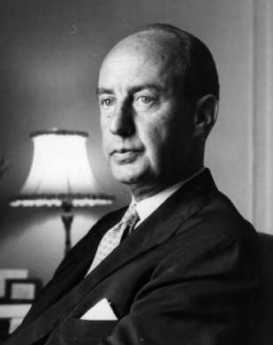
|
| Adlai Stevenson |
This spirit of the American Liechtenstein attracted 24% of hedge funds to Delaware before most people knew what a hedge fund is. Without delving into the full complexity of the subject, a hedge fund addresses the instability of investing for the long term with short term money. Promising higher returns than mutual funds which can generally be liquidated overnight, a hedge fund locks the investor's money up for several years and hence needs to tell its competitors (and unfortunately also the investor) comparatively little about what it is doing with his money. One hedge fund operator stoutly defended the need to keep others from knowing his positions, illustrating how competitors who knew his positions would destroy him by "front-running", typically by flooding his positions with sell orders about ten minutes before or after the closing bell on the stock market. And, indeed that was a realistic concern since 70% of current stock trading is performed by unattended computers, who can transact huge sales in seconds when they detect unusual patterns of activity. So, when the stock market crashed in 2007-2009, Congressmen were pressured to find scapegoats. Some blamed computerized trading, and some blamed hedge funds. Quite possibly, it was neither one, since hedge funds were comparatively unaffected by the crash, and "programmed" traders made a great deal of money. However, Delaware is discovering that anyone who visibly escapes a nation-wide panic is under suspicion of causing it, and must fight off hostile legislation at least until the full facts emerge. The ability to front-run, and the ability to avoid having it happen to you, constitute a business advantage, an "edge". There may be more to it than that, but other features are cloaked in the secrecy which hedge funds enjoy, so secrecy is the business plan of hedge funds, apparently more tolerantly treated in Delaware than elsewhere. The price which hedge funds pay for their right to secrecy is the limitation imposed on them by the regulators as to who may be their customers. Therefore, an acceptable hedge-fund customer gets defined as a rich sophisticated person, who knows what risks are involved, and can afford to lose his money. Being in a small, closely-knit community where word of mouth is trusted, adds some degree of safety too. Adlai Stevenson once made an observation about trusting such protections:
In the past it was said, a fool and his money are soon parted. But nowadays -- it could happen to anyone.
Securitization: Pass the Hot Potato
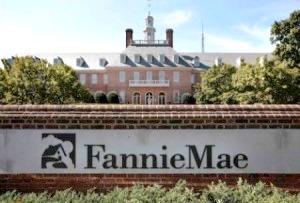
|
| Fannie Mae Corp. |
It would be pardonable to say that since securitization of home mortgages is a generally good thing, we might overlook any minor differences in approach between Fannie Mae (FNMA) and CDOs (Collateralized Debt Obligations), and let the customers decide which approach is preferred. Unfortunately, they both encompass a fatal flaw that has somehow escaped adequate notice. As mortgages pass from one holder to the next in sequence, both the buyer and seller seek to avoid the worst-risk mortgages and retain for themselves the best-risk ones. Get stuck with too many bad-risk properties, and you will go broke. When the credit markets suddenly woke up to this reality in August 2007, it was impossible to know who was holding good stuff and who was holding toxic mortgages. The markets "froze", which is to say most traders just walked away from participation until the situation clarified.

|
| Rising house prices |
Furthermore, with existing systems this seems to be something that will inevitably happen. A small-town bank tries to sell every mortgage it originates to an aggregator, but a few mortgages just aren't salable. The small town bank might well be able to sell mortgages to people who can't afford a house, but the aggregator is wise to the world, and won't buy the worst of them, so they silt up in the hands of the originating bank. Some originating banks may be deft enough to hold on to the very best risks and sell the rest, but a lot of banks will be turned away by dealers who are smarter than they are. At every step in the chain, there will be the same contest, so eventually, everybody comes under suspicion. Add to this trap the irony that an environment of rising house prices simply increases the size of the defaults when the pyramid finally topples, and it may temporarily blind everyone to the risks being run, thus making it all worse. Somehow or other, the average down payment on the mortgages you hold must be larger than the average drop of house prices in a slump, else you will be transferring the risk from the homeowner to yourself. A strong case can be made that the fault in the recent crash was not predatory lending; it was a failure to demand adequate down payments.

|
| Bear Stearns |
However you define an "adequate" down payment, it is clear that the recent rise of house prices particularly in the regions of greatest overbuilding, put a conventional 20% down payment completely out of reach of many first-home buyers. Since house prices have declined 20% and may decline 20% more, a determination of lenders not to lend more than 80% would have prevented a lot of overbuilding. If mortgage aggregators had refused to purchase mortgages that lacked an adequate down payment, the originating banks would soon have stopped issuing them. Consequently, the necessary fortitude should have been applied at the last step before securitization. It's possible to believe the people at Bear Stearns now wish they had done so.
If we then turn to the GSEs, the significant extra risk of Fannie Mae is political. Holding $5 trillion of debt more or less guaranteed by the U.S. Government, the Secretary of the Treasury repeatedly told congressional hearings that assuming its default would double the national debt. Double the national debt is what is meant by being "too big to be allowed to fail." Since this appalling situation willy-nilly relieves Fannie Mae of any worry about collapsing, the only way to force Fannie Mae to insist on adequate down payments is by Congress passing a law that they must. Congress seems to lack the political will to pass such rules in an election year, or probably any other year. The mandate for fifty years has been for Fannie Mae to make housing "affordable" and keep homeowners from losing their homes. It would be an unimaginable tragedy if Congress ran away from this dilemma, and accepted the hyper-inflation which would result from suddenly doubling the national debt. Unimaginable, but likely.
Banks: Fragile and Dangerous

|
| Counterparty Risk |
A bank can't function without deposits, and it can't function unless it can sell shares. So a bank will collapse if there is a run, or if the price of its stock declines severely; public opinion has a lot to do with the success of a bank. What's more, banks have a lot of dealings with each other, so a panic can quickly spread from one bank to another. That's known as counterparty risk. The laws require a bank to maintain a certain ratio of equity to assets, which is to say a ratio of the collective worth of its stock compared with the collective worth of its outstanding loans. The intent of this rule is to make sure the stockholders lose every dime of their investment in the bank before the depositors lose anything. Facing the total loss of their investment in almost every serious difficulty, bank stockholders are very twitchy.
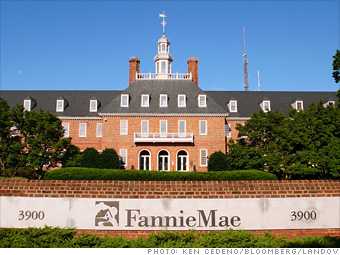
|
| Fannie Mae |
If the bank is doing poorly for some reason, the stockholders get wind of it, and the price of the stock declines as stockholders sell out. The effect of this is to bring the "capital ratio" below the required level, and the authorities will require the bank to sell more stock. That will, in turn, dilute the value of the stock of the existing shareholders, decreasing the stock value. So the effect of a sharp drop in share prices will have almost the same risk to the bank as a run on the cash by the depositors because now the shareholders will sell more stock in the hope of getting out before it declines further in value. This happened in 2008 with the stock of Fannie Mae, which dropped from about $70 a share to $10 in a few weeks, prompting the Federal Reserve to offer to loan cash reserves, and if necessary to buy the stock. After that, it sent investigators to measure the solvency of Fannie Mae.
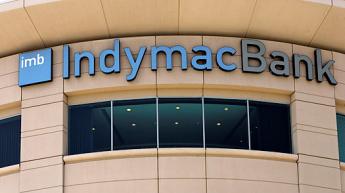
|
| Indy Mac |
This historic episode illustrates the valuable role of the stock market in sensing trouble before regulators are aware of it, and helps explain to Congressmen who want to pass abusive legislation that "The stock market won't let you do that." A week or so earlier, Senator Charles Schumer (D, New York) had made public a letter expressing his concern about IndyMac, another large bank, with the immediate result that there was a run on that bank which made it collapse. So, not only are there banking situations which Congress does not dare meddle with -- there are even situations which the Senate Banking Committee does not dare talk about openly. Naturally, this sort of situation wounds the egos of Congressmen, but a number of left-leaning and high-handed foreign countries have in the past nationalized their banks, with disastrous results. When a bank gets to a certain size, it is as fragile as a land mine. And just as dangerous to tamper with.
World Finance, Columbus Day 2008

|
| Prime Minister Gordon Brown |
WITH voters watching three weeks before the 2008 American presidential election day, finance ministers and their political masters met to decide a basic question: dare they risk disaster to save the existing system, or play it safe by sacrificing small banks to rescue big ones? That is, guess if the situation is so bad only strong rowers can be allowed in the lifeboat, or whether things are really manageable enough to try to save everybody but at the risk of worse consequences for failure. For example the credit default swap mystery; there are $60 trillion notional value insurance policies in existence to cover $20 trillion of bonds. Is that massive double-counting, or an actual disaster so severe it makes every other consideration trivial? Answer quick, please, the ship looks like it might sink. At first, it seemed strange a Labor government in England would propose saving only the strong until you realize that Prime Minister Brown is protected from his Left, while the Democrats in America want to use a fairness argument to win their election. A Republican lame-duck president must do the deciding, a man who has been shown to be both a tough politician and a fearless gambler; playing things safe is not his style. The Dow Jones average soared a thousand points in a day's trading on the prayer that things were finally under control. But take a look around.
Little Iceland and Switzerland are proud to house some enormous banks. But if those banks approach failure, their homeland treasuries are far too small to bail them out.
On the other hand, little Hungary has a negligible banking system, so Hungarians commonly borrow money from foreign banks. The national currency devalued by half in this crisis, so most Hungarian mortgages doubled in price. Reserve systems based on national governments suddenly look obsolete.
Try another approach. Little Ireland went ahead and guaranteed all deposits in its financial institutions. Money from England and the rest of Europe immediately poured in to enjoy that guarantee, forcing other grumpy nations to match the unwise Irish offer. There's a sense that nations are losing control of their affairs.
Europe consists of 27 nations, of which fifteen are in the Euro zone. There are common currency and a constrained central bank, but can this gaggle of geese possibly agree on concerted action in this crisis? America was once in this situation under the Articles of Confederation, but even after almost losing the Revolutionary War, George Washington was nearly unable to get the colonies to form a union. Even after this experience, the Southern Confederate States later adopted the same system of a central currency without a central government and really did lose their war.
Are we to infer from Prime Minister Brown's attitude toward banks that he might soon suggest ditching little nations in order to save bigger ones?
www.Philadelphia-Reflections.com/blog/1525.htm
Financial Institutions of the Future
Things which normally dominate newspaper front pages, like presidential elections and World Series baseball, are now found back among the brassiere ads -- displaced by the stock market, credit market, banking and investment crisis of 2008. However, like the wake of a ship at sea, the past could be pointing to the future. Contemplate all the mighty financial institutions which have simply vanished.
It may even be trivial to say that Lehman Brothers and Bear, Stearns have disappeared. The fact is every investment bank has disappeared.
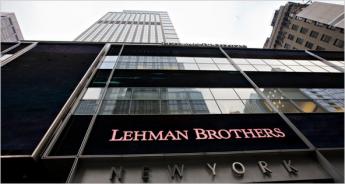
|
| Lehman Brothers |
And that's not all by a long shot. Savings and Loans have disappeared. Small commercial banks, and even most of the pretty big ones have disappeared. We may soon be left with half a dozen major banks and no lesser ones. Commission-based stock brokerage is now a rarity. Insurance? Well, the longevity increase of thirty years over the past century gave life insurance an enormous unearned windfall; when that flattens out, will such institutions still prosper? Individual corporate stocks are quickly vanishing into the homogenized soup of index funds, just as the securitized debt was digesting home mortgages before the current uproar. The ranks of stock analysts are thinning out; it no longer matters as much if they have a conflict of interest with nonexistent investment banks and stock brokers. All of this disappearance of institutions is in the recent past, and it mostly isn't coming back. Perhaps hedge funds and private equity companies will take over, but it is really too soon to say if they will survive, either.

|
| Credit Cards |
Credit cards have been overused and abused; that can be corrected. But the credit card system is supported by exorbitant fees charged to participating merchants; the card industry could easily disappear if the merchants devise a way to escape this private taxation; merchants universally wish to do so. The currency version of money is trying to disappear as fast as practical ways can be devised to measure value and transactions electronically. The remorseless pressure behind reducing all transactions to electronic form is created by the greatly reduced cost of it. And that pressure is magnified by electronically speeding up transactions; the faster money turns over, the more its virtual size increases. The converse, of course, is that a slow-down reduces its size. Like a giant tuna, the money supply dies of lack of oxygen if it slows down.
It can be seen in retrospect that banks are dying because everybody else stole their products by providing cheaper alternatives, mostly with computers. In the process, the national economy gets more uniform, less dependent on local agencies. Something of value has been lost, of course, particularly the local assessment of the capabilities and requirements of local customers; somehow, that seems to be expendable. But one thing, perhaps two, cannot be dispensed with.
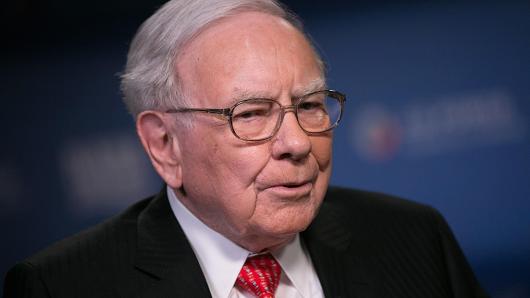
|
| Warren Buffett |
For fifty years, we have grown accustomed to the idea that the electronic records of our institutions are accurate. That's definitely not so. Even a reliable firm makes a myriad of errors in its many transactions, catches them with redundancy and cross-checks, and presents the cleaned-up product once a month or maybe even once a day. But even though the illusion of flawlessness is maintained for the customer as much as humanly possible, it is not inherently flawless. Systemic breakdowns will always expose uncorrected flaws caught in the process, while disincentives are created by this one-sided system to spend money perfecting and refining its quality control. It's better than the old manual systems, of course, but its flaws are constantly exposed by the remorseless external pressure to do things faster, in bigger volume, in greater complexity. We approach the point where every individual needs to maintain a duplicate computer system to verify his accounts. Individual telephone bills, for example, require the aid of a computer to explain what another computer produced, brokerage transactions need computerized counterparty challenge to expose hidden fees and costs. We all know how lack of transparency brought securitized mortgages to their knees. We will soon learn that the meaning of credit default swaps defies even expert comprehension. The mysteries of university tuition discounts, hospital insurance, and even supermarket discounts cry out for safeguards to generate transparency. It may be true that even billionaires like Warren Buffett do not bother to check the accuracy of all accounts presented to them, trusting the fairness of the counterparty. But that does not contradict the need for balance. Institutions of independent public accounting are surely going to make an appearance in the future, telling people what they have and what they are paying for.
The other component which seems to be missing in our transaction system is a well-developed and widely available profession of financial advisors, equipped with electronic tools to provide their badly needed services affordably and accurately. Not only do agents and advisers need some tools, but they also need the political power to force high-handed vendor systems to permit universal customer verifications; the hooks and portals to their private systems need to be developed to make this system workable, and that will not be willingly forthcoming. But they must be provided because any independent advisor/auditors need to be subject to constant reverse-confirmation if we are to escape creating a gigantic imperfect-agency problem. But it always remains that a vendor is not an agent of the customer; his ultimate duty is only to provide an arms-length transaction with transparency. It is the customer's duty to secure his own verification system. When that occurs, it will become part of the third party duty to consent to safeguards against his own imperfect agency. But that's for later. At the moment, independent auditors of the sort needed, scarcely exist.
Much can be gained by searching to correct the flaws of the past whose significance is suddenly apparent. With a stroke of genius, the 2008 reforms of the Bush administration offered a government guarantee of safety for bank accounts which pay no interest. The light finally dawned that businesses use banks for settling up accounts and are more or less indifferent to the interest paid on deposits. When there is a bank panic or a run on a bank, deposits are shifted from bank accounts to Treasury bills in order to find safety; that's now unnecessary. If a bank account pays no less interest than a Treasury bill and is just as safe, why move it? Under the traditional system, deposits seeking safety depleted the load capacity of the bank and erected a barrier to recovery from the slump that often caused the problem. Why didn't we think of this before?
One of the sources of panic in 2008 was the enormous size of credit default swaps, several times larger than the entire American stock market, many times larger than the national debt. How could we allow such a vast over-insurance to occur? But as some appreciation of a large amount of credit swapping with foreign nations began to grow, things calmed down. If that should unravel the mystery, it is certainly far easier to determine the proportion of international swapping than to set up detailed accounting reports for $60 trillion of default insurance, particularly when the record-keeping intermediaries suddenly go bankrupt.

|
| Alan Greenspan |
As soon as the calamity of mortgage-backed securities made its appearance, hands were wrung that originating banks were not required to retain a piece of the mortgage. It seems sensible to impose this requirement on the only party in the chain with the opportunity to evaluate and screen the risks, face to face. So, we can probably expect legislation with the effect of requiring originating institutions to retain "a piece of the action". The principle may need to be extended into other areas, as well. Investment banks until fairly recently were partnerships, not corporations. The capital of an investment bank was supplied from the personal resources of the partners, who usually retired at quite an early age rather than retain big risks without actively coping with the constant pressures of hands-on oversight. Investment banks found they could not raise enough capital from rich partners who were constantly tempted to cash out, so they incorporated and sold stock to the general public. The consequence was the managers were placed in the position of taking big risks with other people's money, and able to pay themselves huge salaries without the constant snooping of rich partners at the next desk. For the time being, investment banking has been totally absorbed into other institutions, but the culture shock of mixing risk takers with risk avoiders will surely lead to something else. Like originating banks with mortgages, the originators of IPOs need to acquire some personal risk of their own, because their essential innovations will always race ahead of the imagination of underpaid plodding regulators. Instead of making a game of outwitting the regulators, investment banking must place much more reliance on the examples within their midst, of rich young kids turning themselves into paupers by assuming the wrong risks.
While we are wallowing in the idea of reconfiguring world finance to avoid the mistakes of the past, some thought should be given to goals. Alan Greenspan was able to win every argument with his reputation of guiding the economy through eighteen years without a major recession. Now that we have resigned ourselves to a return of the business cycle, maybe we should ask whether it is wise to go eighteen years, or even five years, without a correction. Some of this has to do with election cycles, so it isn't easy. But perhaps we have learned that perpetual prosperity is a mirage, small frequent readjustments are better.
Philosophy Means Science in Philadelphia

|
| American Philosophical Society Seal |
In the age of the Enlightenment, science was called natural philosophy; that accounts for the present custom of awarding PhD. degrees in chemistry and botany. The sort of thing which interested Ralph Waldo Emerson was called moral philosophy, and you will have to visit some other place than the A.P.S. if that is what interests you. Roy E. Goodman is presently the Curator of Printed Material (some would say he was chief librarian) at the American Philosophical Society, founded in 1743 by Benjamin Franklin who was clearly the most eminent scientist of his day, having discovered and explained the nature of electricity.

|
| Roy E. Goodman |
Roy Goodman is descended from cowboys and rodeo stars, but in spite of that he gave an entertaining talk recently at the Right Angle Club about this society devoted to useful knowledge, this oldest publishing house and scholarly society in America, once the home of the U.S. Patent Office, and scientific library and museum. They have many rare items in their collection, but the unifying theme is not a rarity, but curiosity. You might say some of the items reflect the whimsy of Franklin, but it would be fairer to say it is an enduring monument to Franklin's universal curiosity about all things.

|
| Nobel Prize Medal |
There are about 900 members of APS, about 800 of them Americans, about 100 of them winners of a Nobel Prize. Let's just make a little list of a very few notables in the past and present membership. Start with the first four Presidents of the United States, add Alexander Hamilton and Lafayette, David Rittenhouse and Francis Hopkinson and you get the idea that Founding Fathers got in early. Robert Fulton, Lewis and Clark, Alexander Humboldt, John Marshall were early members, and more recent ones were Madame Curie,
Taking Risks Demands Its Price

|
| downturn |
Someday, books will be written about who discovered what, and sold what, to make S & P futures suddenly go up and down 300 points in ten minutes on August 17, 2007, soon followed by violent volatility in many other markets. Confusion reigned for a few days, but within a week there was general agreement about the difficulty: the "spread" of interest rates between risky loans and very safe ones had been too narrow for months, and was reverting back to normal. Risk had been mispriced; a risky loan was just as risky as it ever was, as everyone should have realized. If the risky borrower was unwilling to pay higher interest rates, why would any lender bother with him? Since this had been obvious all along, why had lenders temporarily believed otherwise, charging rates scarcely higher for dodgy loans than for well-secured ones?

|
| Alan Greenspan |
Alan Greenspan (in 1996) had called this question a conundrum, but it's getting easier to understand. The emergence of prosperity in one decade among 200 million impoverished Chinese had resulted in wealth which found its way into international markets, much like a gold rush or the discovery of oil. Sudden huge wealth often cannot be easily assimilated, hence was available to loan at cheaper rates. The globalization of world finance has vastly improved the speed of markets to absorb money gluts, but in this case, had the unfortunate effect of spreading it out into less sophisticated corners of the world economy. It particularly affected residential mortgages, which proved to be the weakest link in the chain of lending and borrowing. Ten years of low-interest rates pushed up the prices of existing homes, tempting builders to overcharge for new construction, and inexperienced buyers to pay those inflated prices with cheap mortgages. Between them, Congress and the banks had devised ways to exploit this situation, making the collapse worse when it came. The interest on home mortgages was preferentially tax deductible, so it became the favorite way to borrow. Banks made it easier to refinance at a lower rate as the spread gradually narrowed. To make it even easier, reverse mortgages converted home ownership into an ATM machine with tax deductibility. Because home prices were steadily rising, banks were willing to reduce down payments, on the assumption that home equity would soon rise to represent the amount formerly required as a down payment. As it would have, perhaps, if homeowners had not promptly drained it out the back door of reverse mortgages. Second homes became a cheaper way to have a vacation; steadily rising prices encouraged outright speculation, called flipping. Congress reinsured mortgages, eventually most of them, through FNMA, and then pressured Fannie Mae to insist on spreading the joys of home ownership to people who could not afford the no-down-payment houses they were romanced into buying. Investment banks offered to buy the mortgages from the local originating banks in order to package them into securitized bundles, which thus deprived the originating banks of any incentive to reject eager buyers, no matter how dubious their credit standing. What is more, this process provided a conduit for spreading bad credit risk into the equity markets, including the equity of the banking system itself, and creating the temptation for hedge funds to start runs on the banks in novel forms. There once was a time when customers lined up at the back door to make withdrawals in a bank run. Since investment banks obtain their deposits by borrowing wholesale, they simplified the process of starting a bank run when the speculative process reversed. Which it did on August 17, 2007, possibly not spontaneously, but certainly inevitably.
Home mortgages were once loans for thirty years; even now, they extend for many years. Homeowners stay in one house for an average of seven years. For legal reasons going back two hundred years, they are non-recourse loans, meaning the house alone is at risk to the mortgage lender, who may normally not pursue the homeowner for assets other than the foreclosure, even if the other assets are considerable. In a housing bubble, this creates a special hazard for lenders during the inevitable decline of house prices back to normal. As house prices fall, as they should and will, many homeowners will find it is cheaper to walk away from a foreclosure than to pay off the mortgage. It has been calculated that potentially as many as 50% of mortgages might eventually find themselves in this squeeze. The situation differs from a car loan, for example. Every new car is worth 20% less than the sale price, immediately after the sale. But this does not tempt car buyers to walk away from their loan, because the car loan is a recourse loan. The uncomfortable prospect is that financial reverses alone might not be the reason homeowners submit to foreclosure. If this particular antisocial behavior loses its stigma, a very large proportion of mortgages could be foreclosed on owners who are perfectly able to pay them off.
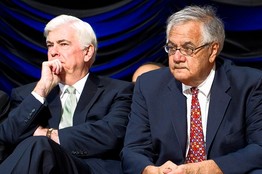
|
| Barney Frank and Chris Dodd |
For all these reasons, house prices are the main bubble in an economy overstimulated by cheap money, and mortgage financing is at the root of a banking crisis. The banking system itself is precarious because it too responded to the temptation of abundant credit at abnormally low-interest rates. The process took the form of over-leveraging in order to magnify profits in a competitive market. Greed was not the only motivation; corporate raiders in the form of Private Equity could swoop down on any company unwise enough to accumulate internal cash. The new owner would then substitute debt for cash, and the prudent company (under new management, of course) was no better off than if it had itself over-leveraged. The Federal Reserve limits commercial banks to loaning thirteen times their stockholder equity, but investment banks had the foolhardiness to borrow thirty times equity. A decline of only three percent in the value of their loans wipes them out. The Federal Reserve Bank of New York, by the way, is leveraged at over a hundred times its equity. The Fed can print money to pay its debts, of course, but the result is a falling value of the dollar in international exchange and ultimately, world inflation. No one predicts the half-way point in this decline to be sooner than two years, which means a recession lasting at least four years. The first two efforts of public officials to halt the decline, the purchase of toxic debt and direct lending to banks, have been abandoned as failures, and the Barney Frank/ Chris Dodd offer for Congress to repurchase mortgages was simply pathetic, with only two hundred responses when over two million were anticipated. If the public loses faith in the ability of the government to do anything about the matter, prices can be expected to overshoot on the downside, not just return to normal. House prices do need to decline, but slowly enough to avoid a panic. And American banks and businesses need to reduce the extent of their borrowing, but without measures which impair the ability of new businesses to make loans, or the ability of shaky businesses like the Detroit auto industry, to survive.
In closing, a word is needed to explain why the foreclosure of $100 billion of California and Florida bungalows should threaten a collapse in the trillions. Economists have fallen into the habit of equating interest rates with risk; the more risk, the higher the interest rates become. That's true, but the risk is not the only factor affecting interest rates. Since they are essentially the rent paid for the use of someone else's money, interest rates respond to the supply of money interest rates, just as supply and demand of rental housing affect rents. The flood of liquidity from developing countries into the world economy pushed interest rates down, but somehow that was taken to imply that risk had decreased. When interest rates go up again, for whatever reason, the money will effectively evaporate. The best example of this relationship is in the bond market. When interest rates go up, the principal value of existing bonds declines. With interest rates of 5% as an example, bond prices go up and down twenty times as much as the interest rate, but in the opposite direction. To repeat: when general interest rates rise, money in the economy disappears about twenty times as fast. That's a succinct description of what started to happen, when the prevailing risk premium returned to its normal higher level, on August 17, 2007.
Go to Delaware, Elephants?
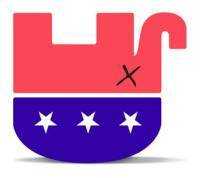
|
| Dead Elephant |
No one is supposed to know where elephants go to die, but if they are smart as people say they are, my suggestion is to search for dead elephants in the state of Delaware. Most taxes, and estate taxes, in particular, are considerably lower, there. At least this was the message Christopher J. Topolewski, Esq. conveyed to the Right Angle Club recently. His firm, West Capital Management, has prepared a table comparing the taxes in the three states that come together at the southeast corner of Pennsylvania, which for residents of the Philadelphia area are within easy commuting distance of each other. Although Delaware has a marriage penalty (one couple is taxed more than the sum of two singles), it has no estate tax at all, no sales tax, and a property tax rate only half that of Pennsylvania, only a quarter of that in New Jersey. For residents of New Jersey, there is almost no tax which is not lower in Delaware, because but ex-Pennsylvanians would then have to be careful to die or cohabit since ordinary income tax and capital gains taxes are higher in Delaware than Pennsylvania. If you must die (and who doesn't?), go die in Delaware.
This was a situation specifically contemplated as a way to discipline greedy state governments, by James Madison when he was formulating the U. S. Constitution. And there is evidence it is working. By happenstance, I once encountered an official of New Jersey taxation, who told me that 43% of New Jersey taxes are paid by 1% of the population. And that 1% was moving out of the state as fast as it could. If it does, the other 99% of New Jersey residents will find their taxes rising by 43%. West Capital reports that taxation as a percent of income is 1.23% in Delaware, 3.46% in Pennsylvania, and 5.82% in New Jersey, suggesting that a selective flight of the 1% would raise the state taxes of everyone else by 43%, and thus make state taxation as a percent of lowered average income rise to roughly 20%. Relating total income to total tax revenues would be an even better way to detect hidden indirect taxes, such as overtaxing utilities in the knowledge it will be passed on to the consumer. I recently discovered that a few years ago, the Legislature got tired of hearing complaints about local taxes, so they transferred half of the local taxes to the state tax. That's pretty much like taking it from one pocket and putting it into another because now all the hubbub is about state taxes. Armed with even partial information, it becomes easier to understand why New Jersey would evict a governor who had been Co-chairman of Goldman Sachs, during a financial crisis. If a financial whiz can't change this, maybe it requires a meat ax.
This is a time of growing restlessness about public spending, and Tea Party revolts are likely to accelerate during the remaining nine months before the next election. The conjecture is growing about a coming deadlock between a Republican Congress and a Democratic President, lasting at least two more years. What might emerge from a strong third party congressional delegation is too arcane to discuss. But at least the Republicans who leave can console themselves they are selectively raising the taxes of Democrats.
It seems almost inconceivable that professional politicians would demonstrate such a forest of tin ears as to let this happen, but the rest of Mr. Topolewski's talk just heated up the fire. His long-scheduled talk was designed to give guidance about the new estate tax laws, but he found himself confounding his audience with the news that there are no new estate tax laws; in fact, there will be no estate tax laws at all after this year unless they emerge from the congressional gridlock we already have. Which apparently will be followed by a gridlock we can scarcely imagine. Imagine asking your lawyer to write a will which straddles the contingencies that there will be no law, that there might be a continuation of the present one, or there might be some new law of quite uncertain wording. One of the suggestions offered is to allow your executor the discretion to accept or disclaim certain hypothetical provisions.
And that brings up an old story. William Penn was the largest private landowner in the history of America, possibly the whole world. He had a trusted agent, who gave him an enormous pile of papers to sign. A busy rich man like Penn is regularly confronted with a discouragingly large number of routine legal documents to sign. So, Penn signed them all, not noticing that one of the various papers in the pile gave the entire state of Pennsylvania -- to his agent. The outcome of the ensuing uproar was that Penn spent six years in debtors prison.
Selling Entire Towns

|
| Jason Duckworth |
Recently, Jason Duckworth of Arcadia Land Company entertained the Right Angle Club with a description of his business. Most people who build a house engage an architect and builder, never giving a thought to who might have designed the streets, laid the sewers, strung out the power and telephone lines, arranged the zoning and otherwise designed the town their house is in. But evidently it is a very common practice for a different sort of builder to do that sort of wholesale infrastructure work -- privatizing municipal government, so to speak. A great deal of what such a wholesale builder does involves wrestling with existing local government in one way or another, getting permits and all that. In a sense, the existing power structure is giving away some of its authority and does so very cautiously. Sometimes that involves suing somebody or getting sued by somebody. Perhaps even greater braking-power on unwelcome change is that the wholesale builder is in debt until the last few plots are sold, and realizes his profit on stragglers. Since it often happens that the last few plots are the least desirable ones, this is a risky business. Big risks must be balanced by big profit potential, and one of the risks of this sort of privatization is that too much consideration may be given to the players at the front end, the farmer who sells the land and the builder who must keep costs down, at the expense of the long-range interests of the people who eventually live in the new town. Top-down decision making is much more efficient, but its price is decreased responsiveness to citizen preferences.

|
| For Sale |
As it happens, Arcadia specializes in towns designed to look like those built in the late 19th Century. Close together, a front door near the sidewalks, front porches for summer evenings. To enhance the feeling of being in an older village, Arcadia specifies certain rules for the architecture, to make it seem like Narberth or, well, Haddonfield. Until recently, suburban design emphasized larger plots of land, and few sidewalks, with streets often ending in cul-de-sacs instead of perpendicular cross-streets in the form of squares. The "new urbanism" appealed to those who were seeking greater privacy, revolving around the idea that if you wanted anything you drove your car to get it. Three-car garages were common, groceries came from distant shopping centers. There are still plenty of new towns built like that today, but Arcadia appeals to those who want to be close to their neighbors, want to meet them at the local small stores scattered among the houses. In the 19th Century, this sort of town design was oriented around a factory or market-place; since now there are seldom factories to orient around, the appeal is to two-income families who want to live in an environment of similar-minded contemporaries. The whole community is much more pedestrian-oriented, much less attached to multiple automobiles.
Since Mr. Duckworth mentioned Haddonfield, where I live, I have to comment that the success of living in a town with older houses depends a great deal on the existence of a willing, capable yeomanry. Older houses, constantly at risk of needing emergency maintenance, need available plumbers, roofers, carpenters, and handy-men of all sorts. Because it is hard to tell a good one from a bad one until too late, this yeomanry has to be linked together invisibly in a network of pride in the quality of each other's work and willingness to refer customers within a network that sustains that pride. A tradesman who is a newcomer to the community has to prove himself, first to his customers, and almost more importantly to his fellow tradesmen. If you happen to pick a bad one, good workmen in other trades are apt to seem mysteriously reluctant to deal with you as a customer, because you too are somewhat on trial. Maybe you don't pay your bills, or maybe you are picky and quarrelsome. In this way, the whole community is linked together in a hidden community of trust. Over time, the whole town develops certain recognizable social characteristics that a brand-new town doesn't yet need. If that time arrives without a network of reliable tradesmen, the town soon deteriorates, house prices fall, people move away.
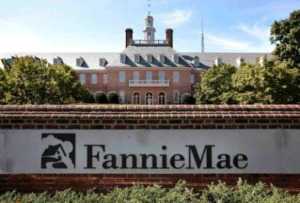
|
| Fannie Mae |
It's curious that the residents of such a town are a breed apart from the merchants in the nearby merchant strip. If the merchants of town life in that same town, there is much less conflict. More commonly, however, the merchants rent their commercial space and commute from distant places. That disenfranchises them from voting on school taxes and local ordinances and creates a merchantile mentality as contrasted with a resident community, dominated by high school students. One group wants lower taxes, the other group wants to get their kids into Harvard. One group wants space for customer parking, the other group is opposed to asphalt lots. And in particular, the residents want to avoid garish storefronts and abandoned strip malls. Since the only group which has an influence on both sides of this friction are the local real estate agents and landlords, their behavior is critical to the image of the town. When real estate interests are not residents of the town it is ominous, and they are well advised to remember that the sellers of houses are the ones who choose a real estate agent for a house turn-over. There's more to this dynamic than just that, but it's a good place to begin your analysis. Suburban real estate interests are constantly tempted to get into local politics, but politicians are the umpires in this game, and it soon becomes bad for their business if real estate agents potentially put their thumb on the scales.

|
| FHA Seal |
All politics is local, but all real estate is not entirely local. The present intrusion of the Federal Government into what is normally a purely local issue has become more pointed in the present real estate recession. Almost all mortgages are packaged and sensitized by "Fannie Mae and Freddy Mac". By overpaying for the mortgages they package, these two federal agencies are subsidizing the banks they buy the mortgages from. Or, that is half of the subsidy. The other half is the Federal Reserve, which presently lends money to banks at essentially zero interest. Acquiring free money from the "Fed", while selling mortgages to Fannie Mae at above-market rates, the federal government supports the banks at both ends. And that's not quite all; there is something called the FHA, Federal Housing Authority, which guarantees mortgages. Essentially an insurance policy, the FHA guarantee is issued for a cost to home buyers who meet standards set by Congress (for which, read Barney Frank and Chris Dodd). Although houses during the boom were selling for 18 times the estimated rental value, they are now selling for 15 times rental. FHA will insure such risks, but the banks won't lend more than the normal proportion, which is 12 times rental. Consequently, almost all mortgages are FHA insured, while the federal administration storms with a fury that the banks "won't lend". And indeed it begins to look as though banks will never issue uninsured mortgages until home prices fall another 25%. If home real estate prices do decline to a normal 12 times rental, a lot of people (i.e. voters) will be unhappy, and not just homeowners who bought at higher prices. The market is fairly screaming that you should sell your house and rent, but so far at least, these federal subsidies seem to be holding prices up. When normal pricing arrives, the recession is just about over, but it certainly won't feel that way if you are a seller.
New Roles For Grandparents
Like everyone else, I had two grandfathers and two grandmothers. However, I can only remember seeing one grandmother on a single occasion when I was three or four years old, and the other three died before I gathered any recollection of them. Essentially, I never knew my grandparents. If they ever knew me, it was as a puking infant, don't he look sweet.

|
| Great Grandpa and Great Grandson |
One of the many unexpected consequences of the introduction of penicillin, polio vaccine and the like, is that my generation has had to invent the role of grandparent, without any models to follow. My grandchildren are all in college or beyond, with reasonable expectations of getting married and starting careers while I watch. I already have two great-grandchildren, and with luck will have lots more. To my knowledge until ten years ago, I never met anyone who had great-grandchildren, so I'm not entirely certain what I'm expected to do with them. I could ask others, but they don't know much, either. Society has evolved a database of experience about how parents are supposed to relate to children, and children have evolved literature about how they are expected to cope with their reflex hostility to their parents. Sigmund Freud made up huge mythology about such conflicts and emotions, and while we are shaking off a good deal of it, Freud did help define the general rules of behavior between parents and children. All of us believe we are exceptions to such rules, of course, but they do make up a road map of the land mines to avoid. Furthermore, most of us formed some firm opinions during the Vietnam conflict or the Summer of Love; presumably, most of our children feel a little silly about it now. Their folk songs record the mythology of that experience; even with guitar accompaniment, these songs all sound a little wry. Sorry about that. Wouldn't have missed it for the world, but sorry about that. Are ya gonna need me, are ya gonna feed me, when I'm sixty-four. Sixty-four? That was twenty years ago.
By this time, the sassy generation has had a chance to learn how sharper than a serpent's tooth it is, as a reminder that there have always been a few who lived King Lear's experiences, but now it could happen to anyone. The two generations, my children's and my own, have now lived a common experience from start to end, not just half of it as Freud depicted. But there's a new twist; the two generations think they have a role with the third generation. Both generations are unclear about what the grandparents' role should be with the new generation of young adults. I know what I think, you know what you think. Neither of us knows anything.
A thousand years of experience teaches how unwise it is to allow any relationship to revolve around gifts and the expectation of gifts. A mere two hundred years of experience make it plain to almost everyone how easy it is to ruin children by making life too easy for them. What does one do, then, with savings large or small, when grandchildren seem to combine aloofness with expectations? Does our society really expect us to favor our personal genome into eons of astronomical time? As one wanders occasionally through graveyards, it is very clear that our nostalgia for great grandparents born in 1814, is small indeed. Should we make an effort to create a lasting impression on such visitors from another planet, or should the whole misty idea of consanguinity be abandoned as a delusion? Should we take the wry advice of those who test our reactions with cynical descriptions? Should we, in a word, attempt to live out our lives with the perfect timing of spending our last dollar during our last hour? Come back in fifty years and there will be shelves of novels, plays, and poetry which tell the sad tales of those who made one choice or the other. Future generations of grandparents will still have to make their own decisions, but at least they will know how the world will view them. One generation will likely cling to the viewpoint of its contemporaries, another generation will reject such viewpoints as nonsense. Our generation will never be quite sure.
Among the funny things about this situation is the curious inversion of the social classes. Everyone notices how domestic servants hang around observing the behavior Upstairs; no matter how firmly it is rejected Below Stairs, employer behavior is marveled at and imitated to some degree. But in the past, those servant social groups who had their children at sixteen, their grandchildren at thirty-two, their great-grandchildren at forty-eight, knew something that those of us who defer our gratifications might wish we knew. The experience is raw and basic, and all the more important for that reason. Some budding novelist, hoping to cloak predictions as folklore, might give that theme a try.
Frank Furness (2) Rittenhouse Square

|
| Frank Furness |
George Washington had two hundred slaves, Benjamin Chew had five hundred. It wasn't lack of wealth that restrained the size and opulence of their mansions, particularly the ones in the center of town. The lack of central heating forced even the richest of them to keep the windows small, the fireplaces drafty and numerous, the ceilings low. Small windows in a big room make it a dark cave, even with a lot of candles; a low ceiling in a big room is oppressive. Sweeping staircases are grand, but a lot of heat goes up that opening; sweeping staircases are for Natchez and Atlanta perhaps, but up north around here they aren't terribly practical. Building a stone house near a quarry has always been practical, but if there is insufficient local stone, you need railroads to transport the rocks.

|
| Early Victorian |
So to a certain extent, the advent of central heating, large plates of window glass, and transportation for heavy stone and girders amounted to emancipation from the cramped little houses of the Founding Fathers. Lead paint, now much scorned for its effect on premature babies, emancipated the color schemes of the Victorian house. Many of the war profiteers of the Civil War were indeed tasteless parvenu, but it is a narrow view of the Victorian middle class to assume that the overdone features of Victorian architecture can be mainly attributed to the personalities of the Robber Barons. This is not the first nor the only generation to believe that a big house is better than a small one. The architects were at work here, too. It was their job to learn about new building techniques and materials, and they were richly rewarded for showing the public what was newly possible. Frank Furness was as flamboyant as they come, a winner of the Congressional Medal of Honor for heroism, a man who wore a revolver in Victorian Philadelphia and took pot-shots at stuffed animal heads in his office. He affected the manners of a genius, and his later decline in public esteem was not so much disillusion with him as with the cost of heating (later air-conditioning), cleaning, and maintenance which soon exceeded provable utility. The simultaneous arrival of the 1929 financial crash and inexpensive automobile commuting to the suburbs stranded square miles of these overbuilt structures. It was the custom to build a big house on Locust, Spruce or Pine Streets, with a small servant's house on the back alley. During the Depression of the 1930s, there were many families who sold the big house and moved into the small one. Real estate values declined faster than property taxes and maintenance costs; incomes declined even faster.

|
| Delancey Street |
It thus comes about that large numbers of very large houses have been sold for very modest prices, and the urban pioneers have gentrified them. You can buy a lot of house for comparatively little if you are willing or able to restore the building. We thus come back to Frank Furness, who was the idolized architect of the Rittenhouse Square area, in addition to the massive banks and museums for which he is perhaps better known. Unfortunately, most of the Furness mansions on the square have been replaced by apartment buildings, but one outstanding example remains. It's sort of dwarfed by the neighboring high-rises, but it was originally the home of a railroad magnate, a few houses west of the Barclay Hotel, and it holds its own, defiantly. Inside, Furness made clever use of floor-to-ceiling mirrors to diffuse interior light and make the corridors seem wider. Although electric lighting made these windowless row houses bearable, modern lighting dispels what must have been originally a dark cave-like interior on several floors, held up by poured concrete floors. Furness liked to put in steel beams, heavy woodwork, and stonework, in the battleship school of architecture. If you were thinking of tearing down one of his buildings, you had to pause and consider the cost of demolition before you went ahead.

|
| Frank Furness Window |
There are several others of his buildings around the corner on the way to Delancey Street, one of them set back from the street with a garden in front. That's what you expect in the suburbs, but the land is too expensive in center city for very many of them; this is the last one Furness built before rising real estate costs drove even him back to the row-house concept. On Delancey Street, there is a house which he improved upon by adding an 18-inch bay window in front. The uproar it caused among the neighbors is still remembered.

|
| Doctor Home and Office |
A block away on the part of 19th Street facing down the street, Furness built another reddish brownstone house to glare back at the neighbors. The facings of the front suggest three-row houses, and it was indeed the home of a physician who had his offices on one side, entrance in the middle, and living room on the right. The resulting staircase in the middle is used to good effect by opening a balcony on the landing overlooking the parlor below. As befits the Furness style, the wall is thick, the wooden beams heavy. And, in a gesture to the lady of the house, the room adjoining the living parlor is a modern kitchen so the kids can play while mama cooks or guests can wander by as she gets dinner ready. Times have changed, the servants quarters once were plain and undecorated. The lady of the house never set foot in the kitchen so she could care less what it looked like.

|
| Frank Furness Home |
As a matter of fact, that's the remaining problem for these places, the rate-limiting factor as chemists say. Automatic washers, microwaves, electric sweepers, spray-on cleaning fluids and similar advances are the new industrial revolution which makes these hulking mansions almost practical. What's still lacking is the social structure of Upstairs and Downstairs, the servant community overseen by the lady of the house, who once was sort of the Mayor of a town. The lady of the house is now a partner in a big law firm, or similar. It simply is not wise to leave a big expensive place unattended by someone constantly supervising the domestic help. It is never entirely safe to leave the financial affairs of the household in the hands of someone who is not a central member of the owning family. Perhaps the father of the family can be brow-beaten into spending some quality time with the children once in a while.

|
| Structure of Upstairs and Downstairs |
Perhaps an accountant can for a fee be trusted with the finances; perhaps a butler can be found who will whack the staff when they get out of line. But the plain fact is these monster houses were built around the assumption that the lady of the house would run them, and the old style of manorial life cannot return unless the house is completely redesigned for it. Someday, perhaps a genius of the Frank Furness sort will make an appearance, change everything, and make everybody want to have it. But it is asking for something else when you insist on this happening in an old stone fortress that was designed to house a different style of life.
Disappearing Stock Power
The Right Angle Club of Philadelphia recently heard two presentations on newer investment strategies, one by our member on hedge funds and private equity, and a week later by his guest from Black Rock, on ETF funds. For the purpose of this review, both presentations ultimately got around to the same issue.
In the case of private equity, the investor purchases a share of aggregated profits from a company in the business of buying a substantial or controlling interest in corporations, usually underpriced or underperforming ones. And then, the private equity fund attempts either to fix up the company and sell it or fix it up and hold it indefinitely. Whether or not he achieves a profit, the individual investor in the fund loses the opportunity to vote the shares, or has it offered in such an awkward way the opportunity is meaningless.
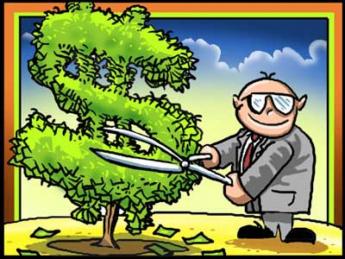
|
| Hedge Fund |
A hedge fund similarly buys and sells stock on its own account, employing the money of investors, and generally adding huge amounts of borrowed debt. In this case, the stock is often held for such short times that voting rights are lost in the registration requirements. Taken as a whole, however, the issue is substantial, since it is reported that 70% of recent transactions have been conducted by unattended computers operating by pre-arranged contingency instructions, often responding in fractions of a second. While the resulting immobilization of voting rights is substantial, the main problem with hedge funds has been the way very small profits have been magnified by staggering amounts of borrowing, potentially causing very large losses if the transaction system is slowed for whatever reason. While hedge funds did perform well during the 2007-2009 crash, it will be 2012 before the incredible volume of transactions can be analyzed to see how close we were to disaster. There is definitely a risk in doing nothing, but probably less than the risk of ill-informed legislation making matters worse in some way.
In the case of ETF, the operator or "manufacturer" of the fund attempts to buy blocks of stock in all or representative samples of the companies listed on some index, weighted in proportion to their weight in the index. The intent is never to sell that stock, merely evaluating the fund price and its dividends as a mathematical exercise, and repurchasing or reselling the calculated bundle to other investors, but never disturbing the contents of the bundle unless the index changes its composition.
In all third-party investing cases except hedge funds, the advantage is that reduced tax and transaction activity saves costs, and avoiding internal selling of stock means essentially no taxes are payable until the investor ultimately sells the fund. The managers of funds maintain that these tax and overhead savings completely compensate for losing whatever opportunities for profit would come along and be exploited by expensive "active" managing of the funds. (Some investment funds employ more Ph.D.'s than any American University does.) Even if the performance turns out to be somewhat lower, there is a safety factor of exactly matching the averages, and thus agreeing to surrender the opportunity to join half of the universe of investors in beating the average, in order to avoid joining the other half of investors in doing worse. Furthermore, distributing the investment over a large group of corporations confers diversification, and thus surrendering the chance of a windfall profit in return for avoiding the occasional disastrous loss. In a sense, the fund investor no longer hopes for a company to do well, he hopes for the whole nation to do well. Summarizing the details, these funds provide safety of diversification and reduction of turnover costs, in return for assured but marginal above-average performance. Since this outcome is so greatly superior to the actual experience of non-professional investors overall, it is highly attractive to many investors and should be attractive to more of them.
In addition to these common features, the hedge funds and private equity expose the investor to the risks and rewards of choosing a skillful manager, who may or may not choose the portfolio wisely, and who may or may not use leverage wisely. The choice of portfolio companies, on average, justify a greater degree of borrowing as their quality improves, and all investment borrowing involves a risk that interest rates may go up for reasons unrelated to the investment. In the recent debacle, hedge funds did comparatively well, but nevertheless, there are times when it is unwise to borrow against even the safest securities. And finally, because of the risk of stock market raids by outsiders, hedge funds are quite secretive about their portfolio contents and force the investor to "lock in" his illiquid investment for several years at a time.
There remains one characteristic of both funds, and for that matter mutual funds, annuities, life insurance and all other forms of aggregated investing through a third party. The third party retains the right to vote the shares, admittedly with some little-used and generally unworkable opportunities for investors to request their own proxies. Such third parties almost always vote the shares in their custody in favor of management. There are occasional exceptions, as when union-managed funds will vote their shares in a political manner, or as when some mutual funds attempt to obtain pension fund business in return for cooperation on selected proxies, or in one legendary story the custodian was instructed: "Always vote AGAINST any management proposal." But these are presently exceptional situations. In the vast majority of cases, the proxy votes effectively disappear, and control of the companies in the portfolio gradually gravitates into the hands of those few stockholders who retain direct ownership and take the trouble to vote it. In fact, it is increasingly the case that the most effective way to frustrate a management proposal is not to vote against it, but to abstain entirely, in the hope that a quorum cannot be assembled.
Another popular movement augments this unfortunate situation. Increasingly, it is urged that top management be paid substantial parts of its reimbursement by stock in the company or options on it. The argument is that it is important to align the motives of top management with the rest of the stockholders. Reflecting concern about some recent events, such stock is or should be forced to bear the covenant that it may not be voted in a stock take-over by an outside raider, to frustrate the commonly used inducement to the manager to sell out his stockholders in a merger. Even when this particular contingency has been foreseen and prevented, the effect of increasing the shares in the hand of management and decreasing the voting shares in the hand of the outside public by freezing them in third-party funds -- soon puts the idea in the heads of managers that they own the company. The recent public indignation about inordinately high salaries for top management, can in large part be traced to the plain fact that voting control of the companies is visibly shifting into the hands of the people who receive those salaries.
Last Will of Benjamin Franklin

|
| Benjamin Franklin |
The Last Will and Testament of Benjamin Franklin
I, Benjamin Franklin, of Philadelphia, printer, late Minister Plenipotentiary from the United States of America to the Court of France, now President of the State of Pennsylvania, do make and declare my last will and testament as follows:
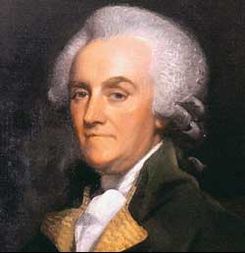
|
| William Franklin |
To my son, William Franklin, late Governor of the Jerseys, I give and devise all the lands I hold or have a right to, in the province of Nova Scotia, to hold to him, his heirs, and assigns forever. I also give to him all my books and papers, which he has in his possession, and all debts standing against him on my account books, willing that no payment for, nor restitution of, the same be required of him, by my executors. The part he acted against me in the late war, which is of public notoriety, will account for my leaving him no more of an estate he endeavored to deprive me of.
Having since my return from France demolished the three houses in Market Street, between Third and Fourth Streets, fronting my dwelling-house, and erected two new and larger ones on the ground, and having also erected another house on the lot which formerly was the passage to my dwelling, and also a printing-office between my dwelling and the front houses; now I do give and devise my said dwelling-house, wherein I now live, my said three new houses, my printing- office and the lots of ground thereto belonging; also my small lot and house in Sixth Street, which I bought off the widow Henmarsh; also my pasture-ground which I have in Hickory Lane, with the buildings thereon; also my house and lot on the North side of Market Street, now occupied by Mary Jacobs, together with two houses and lots behind the same, and fronting on Pewter-Platter Alley; also my lot of ground in Arch Street, opposite the church-burying ground, with the buildings thereon erected; also all my silver plate, pictures, and household goods, of every kind, now in my said dwelling-place, to my daughter, Sarah Bache, and to her husband, Richard Bache, to hold to them for and during their natural lives, and the life of the longest liver of them, and from and after the decease of the survivor of them, I do give, devise, and bequeath to all children already born, or to be born of my said daughter, and to their heirs and assigns forever, as tenants in common, and not as joint tenants.
And, if any or either of them shall happen to die under age, and without issue, the part and share of him, her, or them, so dying, shall go to and be equally divided among the survivors or survivor of them. But my intention is, that, if any or either of them should happen to die under age, leaving issue, such issue shall inherit the part and share that would have passed to his, her, or their parent, had he, she, or they were living.
And, as some of my said devisees may, at the death of the survivor of their father or mother, be of age, and others of them underage, so as that all of them may not be of capacity to make division, I in that case request and authorize the judges of the Supreme Court of Judicature of Pennsylvania for the time being, or any three of them, not personally interested, to appoint by writing, under their hands and seals, three honest, intelligent, impartial men to make the said division, and to assign and allot to each of my devisees their respective share, which division, so made and committed to writing under the hands and seals of the said three men, or any two of them, and confirmed by the said judges, I do hereby declare shall be binding on, and conclusive between the said devisees.
All the lands near the Ohio, and the lots near the centre of Philadelphia, which I lately purchased of the State, I give to my son-in-law, Richard Bache, his heirs and assigns forever; I also give him the bond I have against him, of two thousand and one hundred and seventy-two pounds, five shillings, together with the interest that shall or may accrue thereon, and direct the same to be delivered up to him by my executors, canceled, requesting that, in consideration thereof, he would immediately after my decease manumit and set free his Negro man Bob. I leave to him, also, the money due to me from the State of Virginia for types. I also give to him the bond of William Goddard and his sister, and the counter bond of the late Robert Grace, and the bond and judgment of Francis Childs, if not recovered before my decease, or any other bonds, except the bond due from ----- Killian, of Delaware State, which I give to my grandson, Benjamin Franklin Bache. I also discharge him, my said son-in-law, from all claim and rent of money due to me, on book account or otherwise. I also give him all my musical instruments.

|
| Sarah Bache |
The king of France's picture, set with four hundred and eight diamonds, I give to my daughter, Sarah Bache, requesting , however, that she would not form any of those diamonds into ornaments either for herself or daughters, and thereby introduce or countenance the expensive, vain, and useless fashion of wearing jewels in this country; and those immediately connected with the picture may be preserved with the same.
I give and devise to my dear sister, Jane Mecom, a house and lot I have in Unity Street, Boston, nor or late under the care of Mr. Jonathan Williams, to her and to her heirs and assigns forever. I also give her the yearly sum of fifty pounds sterling, during life, to commence at my death, and to be paid to her annually out of the interests or dividends arising on twelve shares which I have since my arrival at Philadelphia purchased in the Bank of North America, and, at her decease, I give the said twelve shares in the bank to my daughter, Sarah Bache, and her husband, Richard Bache. But it is my express will and desire that, after the payment of the above fifty pounds sterling annually to my said sister, my said daughter be allowed to apply the residue of the interest or dividends on those shares to her sole and separate use, during the life of my said sister, and afterwards the whole of the interest or dividends thereof as her private pocket money.
I give the right I have to take up to three thousand acres of land in the State of Georgia, granted to me by the government of that State, to my grandson, William Temple Franklin, his heirs and assigns forever. I also give to my grandson, William Temple Franklin, the bond and judgment I have against him of four thousand pounds sterling, my right to the same to cease upon the day of his marriage; and if he dies unmarried, my will is, that the same be recovered and divided among my other grandchildren, the children of my daughter, Sarah Bache, in such manner and form as I have herein before given to them the other parts of my estate.
The philosophical instruments I have in Philadelphia I give to my ingenious friend, Francis Hopkinson.
To the children, grandchildren, and great-grandchildren of my brother, Samuel Franklin, that may be living at the time of my decease, I give fifty pounds sterling, to be equally divided among them. To the children, grandchildren, and great-grandchildren of my sister, Anne Harris, that may be living at the time of my decease, I give fifty pounds sterling to be equally divided among them. To the children, grandchildren, and great-grandchildren of my brother James Franklin, that may be living at the time of my decease, I give fifty pounds sterling to be equally divided among them. To the children, grandchildren, and great-grandchildren of my sister, Sarah Davenport, that may be living at the time of my decease, I give fifty pounds sterling to be equally divided among them. To the children, grandchildren, and great-grandchildren of my sister, Lydia Scott, that may be living at the time of my decease, I give fifty pounds sterling to be equally divided among them. To the children, grandchildren, and great-grandchildren of my sister, Jane Mecom, that may be living at the time of my decease, I give fifty pounds sterling to be equally divided among them.
I give to my grandson, Benjamin Franklin Bache, all the types and printing materials, which I now have in Philadelphia, with the complete letter foundry, which, in the whole, I suppose to be worth near one thousand pounds; but if he should die under age, then I do order the same to be sold by my executors, the survivors or survivor of them, and the money be equally divided among all the rest of my said daughter's children, or their representatives, each one on coming of age to take his or her share, and the children of such of them as may die under age to represent and to take the share and proportion of, the parent so dying, each one to receive his or her part of such share as they come of age.
With regard to my books, those I had in France and those I left in Philadelphia, is now assembled together here, and a catalog made of them, it is my intention to dispose of them as follows: My "History of the Academy of Sciences," in sixty or seventy volumes quarto, I give to the Philosophical Society of Philadelphia, of which I have the honor to be President. My collection in a folio of "Les Arts et les Metiers," I give to the American Philosophical Society, established in New England, of which I am a member. My quarto edition of the same, "Arts et Metiers," I give to the Library Company of Philadelphia. Such and so many of my books as I shall mark on my said catalog with the name of my grandson, Benjamin Franklin Bache, I do hereby give to him; and such and so many of my books as I shall mark on the said catalog with the name of my grandson, William Bache, I do hereby give to him; and such as shall be marked with the name of Jonathan Williams, I hereby give to my cousin of that name. The residue and remainder of all my books, manuscripts, and papers, I do give to my grandson, William Temple Franklin. My share in the Library Company of Philadelphia, I give to my grandson, Benjamin Franklin Bache, confiding that he will permit his brothers and sisters to share in the use of it.
I was born in Boston, New England, and owe my first instructions in literature to the free grammar schools established there. I, therefore, give one hundred pounds sterling to my executors, to be by them, the survivors or survivor of them, paid over to the managers or directors of the free schools in my native town of Boston, to be by them, or by those person or persons, who shall have the superintendence and management of the said schools, put out to interest, and so continued at interest forever, which interest annually shall be laid out in silver medals, and given as honorary rewards annually by the directors of the said free schools belonging to the said town, in such manner as to the discretion of the selectmen of the said town shall seem meet.
Out of the salary that may remain due to me as President of the State, I do give the sum of two thousand pounds sterling to my executors, to be by them, the survivors or survivor of them, paid over to such person or persons as the legislature of this State by an act of Assembly shall appoint to receive the same in trust, to be employed for making the river Schuylkill navigable.
And what money of mine shall, at the time of my decease, remain in the hands of my bankers, Messrs. Ferdinand Grand and Son, at Paris, or Messrs. Smith, Wright, and Gray, of London, I will that, after my debts are paid and deducted, with the money legacies of this my will, the same be divided into four equal parts, two of which I give to my dear daughter, Sarah Bache, one to her son Benjamin, and one to my grandson, William Temple Franklin.
During the number of years I was in business as a stationer, printer, and postmaster, a great many small sums became due for books, advertisements, postage of letters, and other matters, which were not collected when, in 1757, I was sent by the Assembly to England as their agent, and by subsequent appointments continued there till 1775, when on my return, I was immediately engaged in the affairs of Congress and sent to France in 1776, where I remained nine years, not returning till 1785, and the said debts, not being demanded in such a length of time, are become in a manner obsolete, yet are nevertheless justly due. These, as they are stated in my great folio ledger E, I bequeath to the contributors to the Pennsylvania Hospital, hoping that those debtors, and the descendants of such as are deceased, who now, as I find, make some difficulty of satisfying such antiquated demands as just debts, may, however, be induced to pay or give them as charity to that excellent institution. I am sensible that much must inevitably be lost, but I hope something considerable may be recovered. It is possible, too, that some of the parties charged may have existing old, unsettled accounts against me; in which case the managers of the said hospital will allow and deduct the amount, or pay the balance if they find it against me.
My debts and legacies being all satisfied and paid, the rest and residue of all my estate, real and personal, not herein expressly disposed of, I do give and bequeath to my son and daughter, Richard and Sarah Bache.
I request my friends, Henry Hill, Esquire, John Jay, Esquire, Francis Hopkinson, Esquire, and Mr. Edward Duffield, of Benfield, in Philadelphia County, to be the executors of this my last will and testament; and I hereby nominate and appoint them for that purpose.
I would have my body buried with as little expense or ceremony as may be. I revoke all former wills by me made, declaring this only to be my last.
In witness whereof, I have hereunto set my hand and seal, this seventeenth day of July, in the year of our Lord, one thousand seven hundred and eighty-eight.
B. Franklin
Signed, sealed, published, and declared by the above named Benjamin Franklin, for and as his last will and testament, in the presence of us.
Abraham Shoemaker, John Jones, George Moore.
CODICIL
I, Benjamin Franklin, in the foregoing or annexed last will and testament named, having further considered the same, do think proper to make and publish the following codicil or addition thereto.
It has long been a fixed political opinion of mine, that in a democratical state there ought to be no offices of profit, for the reasons I had given in an article of my drawing in our constitution, it was my intention when I accepted the office of President, to devote the appointed salary to some public uses. Accordingly, I had already, before I made my will in July last, given large sums of it to colleges, schools, the building of churches, etc.; and in that will I bequeathed two thousand pounds more to the State for the purpose of making the Schuylkill navigable. But understanding since that such a work, and that the project is not likely to be undertaken for many years to come, and having entertained another idea, that I hope may be more extensively useful, I do hereby revoke and annul that bequest, and direct that the certificates I have for what remains due to me of that salary be sold, towards raising the sum of two thousand pounds sterling, to be disposed of as I am now about to order.
It has been an opinion, that he who receives an estate from his ancestors is under some kind of obligation to transmit the same to their posterity. This obligation does not lie on me, who never inherited a shilling from an ancestor or relation. I shall, however, if it is not diminished by some accident before my death, leave a considerable estate among my descendants and relations. The above observation is made as merely as some apology to my family for making bequests that do not appear to have any immediate relation to their advantage.
I was born in Boston, New England, and owe my first instructions in literature to the free grammar schools established there. I have, therefore, already considered these schools in my will. But I am also under obligations to the State of Massachusetts for having, unasked, appointed me formerly their agent in England, with a handsome salary, which continued some years; and although I accidentally lost in their service, by transmitting Governor Hutchinson's letters, much more than the amount of what they gave me, I do not think that ought in the least to diminish my gratitude.
I have considered that, among artisans, good apprentices are most likely to make good citizens, and, having myself been bred to a manual art, printing, in my native town, and afterward assisted to set up my business in Philadelphia by kind loans of money from two friends there, which was the foundation of my fortune, and all the utility in life that may be ascribed to me, I wish to be useful even after my death, if possible, in forming and advancing other young men, that may be serviceable to their country in both these towns. To this end, I devote two thousand pounds sterling, of which I give one thousand thereof to the inhabitants of the town of Boston, in Massachusetts, and the other thousand to the inhabitants of the city of Philadelphia, in trust, to and for the uses, intents, and purposes hereinafter mentioned and declared.
The said sum of one thousand pounds sterling, if accepted by the inhabitants of the town of Boston, shall be managed under the direction of the selectmen, united with the ministers of the oldest Episcopalians, Congregational, and Presbyterian churches in that town, who are to let out the sum upon interest, at five per cent, per annum, to such young married artificers, under the age of twenty-five years, as have served an apprenticeship in the said town, and faithfully fulfilled the duties required in their indentures, so as to obtain a good moral character from at least two respectable citizens, who are willing to become their sureties, in a bond with the applicants, for the repayment of the moneys so lent, with interest, according to the terms hereinafter prescribed; all which bonds are to be taken for Spanish milled dollars, or the value thereof in current gold coin; and the managers shall keep a bound book or books, wherein shall be entered the names of those who shall apply for and receive the benefits of this institution, and of their sureties, together with the sums lent, the dates, and other necessary and proper records respecting the business and concerns of this institution. And as these loans are intended to assist young married artificers in setting up their business, they are to be proportioned by the discretion of the managers, so as not to exceed sixty pounds sterling to one person, nor to be less than fifteen pounds; and if the number of appliers so entitled should be so large as that the sum will not suffice to afford to each as much as might otherwise not be improper, the proportion to each shall be diminished so as to afford to everyone some assistance. These aids may, therefore, be small at first, but, as the capital increases by the accumulated interest, they will be ampler. And in order to serve as many as possible in their turn, as well as to make the repayment of the principal borrowed easier, each borrower shall be obliged to pay, with the yearly interest, one-tenth part of the principal and interest, so paid in, shall be again let out to fresh borrowers.
And, as it is presumed that there will always be found in Boston virtuous and benevolent citizens, willing to bestow a part of their time in doing good to the rising generation, by superintending and managing this institution gratis, it is hoped that no part of the money will at any time be dead, or be diverted to other purposes, but be continually augmenting by the interest; in which case there may, in time, be more than the occasions in Boston shall require, and then some may be spared to the neighboring or other towns in the said State of Massachusetts, who may desire to have it; such towns engaging to pay punctually the interest and the portions of the principal, annually, to the inhabitants of the town of Boston.
If this plan is executed, and succeeds as projected without interruption for one hundred years, the sum will then be one hundred and thirty-one thousand pounds; of which I would have the managers of the donation to the town of Boston then layout, at their discretion, one hundred thousand pounds in public works, which may be judged of most general utility to the inhabitants, such as fortifications, bridges, aqueducts, public buildings, baths, pavements, or whatever may make living in the town more convenient to its people, and render it more agreeable to strangers resorting thither for health or a temporary residence. The remaining thirty-one thousand pounds I would have continued to be let out on interest, in the manner above directed, for another hundred years, as I hope it will have been found that the institution has had a good effect on the conduct of youth, and been of service to many worthy characters and useful citizens. At the end of this second term, if no unfortunate accident has prevented the operation, the sum will be four million and sixty-one thousand pounds sterling, of which I leave one million sixty-one thousand pounds to the disposition of the inhabitants of the town of Boston, and three million to the disposition of the government of the state, not presuming to carry my views farther.
All the directions herein given, respecting the disposition and management of the donation to the inhabitants of Boston, I would have observed respecting that to the inhabitants of Philadelphia, only, as Philadelphia is incorporated, I request the corporation of that city to undertake the management agreeably to the said directions; and I do hereby vest them with full and ample powers for that purpose. And, having considered that the covering a ground plot with buildings and pavements, which carry off most of the rain and prevent its soaking into the Earth and renewing and purifying the Springs, whence the water of wells must gradually grow worse, and in time be unfit for use, as I find has happened in all old cities, I recommend that at the end of the first hundred years, if not done before, the corporation of the city Employ a part of the hundred thousand pounds in bringing, by pipes, the water of Wissahickon Creek into the town, so as to supply the inhabitants, which I apprehend may be done without great difficulty, the level of the creek is much above that of the city, and may be made higher by a dam. I also recommend making the Schuylkill completely navigable. At the end of the second hundred years, I would have the disposition of the four million and sixty-one thousand pounds divided between the inhabitants of the city of Philadelphia and the government of Pennsylvania, in the same manner as herein directed with respect to that of the inhabitants of Boston and the government of Massachusetts.
It is my desire that this institution should take place and begin to operate within one year after my decease, for which purpose due notice should be publicly given previous to the expiration of that year, that those for whose benefit this establishment is intended may make their respective applications. And I hereby direct my executors, the survivors or survivor of them, within six months after my decease, to pay over the sum of two thousand pounds sterling to such persons as shall be duly appointed by the Selectmen of Boston and the corporation of Philadelphia, to receive and take charge of their respective sums, of one thousand pounds each, for the purposes aforesaid.
Considering the accidents to which all human affairs and projects are subject in such a length of time, I have, perhaps, too much flattered myself with a vain fancy that these dispositions, if carried into execution, will be continued without interruption and have the effects proposed. I hope, however, that is the inhabitants of the two cities should not think fit to undertake the execution, they will, at least, accept the offer of these donations as a mark of my good will, a token of my gratitude, and a testimony of my earnest desire to be useful to them after my departure.
I wish, indeed, that they may both undertake to endeavor the execution of the project, because I think that, though unforeseen difficulties may arise, expedients will be found to remove them, and the scheme be found practicable. If one of them accepts the money, with the conditions, and the other refuses, my will then is, that both Sums be given to the inhabitants of the city accepting the whole, to be applied to the same purposes, and under the same regulations directed for the separate parts; and, if both refuse, the money, of course, remains in the mass of my Estate, and is to be disposed of therewith according to my will made the Seventeenth day of July, 1788.
I wish to be buried by the side of my wife, if it may be, and that a marble stone, to be made by Chambers, six feet long, four feet wide, plain, with only a small molding around the upper edge, and this inscription:
Benjamin And Deborah Franklin 178-
to be placed over us both. My fine crab-tree walking stick, with a gold head, curiously wrought in the form of the cap of liberty, I give to my friend, and the friend of mankind, General Washington. If it were a Sceptre, he has merited it and would become it. It was a present to me from that excellent woman, Madame de Forbach, the Dowager Duchess of Deux-Ponts, connected with some verses which should go with it. I give my gold watch to my son-in-law Richard Bache, and also the gold watch chain of the Thirteen United States, which I have not yet worn. My timepiece, that stands in my library, I give to my grandson, William Temple Franklin. I give him also my Chinese gong. To my dear old friend, Mrs. Mary Hewson, I give one of my silver tankards marked for her use during her life, and after her decease, I give it to her daughter Eliza. I give to her son, William Hewson, who is my godson, my new quarto Bible, and also the botanic description of the plants in the Emperor's garden at Vienna, in folio, with colored cuts.
And to her son, Thomas Hewson, I give a set of "Spectators, Tattlers, and Guardians" handsomely bound.
There is an error in my will, where the bond of William Temple Franklin is mentioned as being four thousand pounds sterling, whereas it is but for three thousand five hundred pounds.
I give to my executors, to be divided equally among those that act, the sum of sixty pounds sterling, as some compensation for their trouble in the execution of my will; and I request my friend, Mr. Duffield, to accept moreover my French waywiser, a piece of clockwork in Brass, to be fixed to the wheel of any carriage; and that my friend, Mr. Hill, may also accept my silver cream pot, formerly given to me by the good Doctor Fothergill, with the motto, Keep bright the Chain. My reflecting telescope, made by Short, which was formerly Mr. Canton's, I give to my friend, Mr. David Rittenhouse, for the use of his observatory.
My picture, drawn by Martin, in 1767, I give to the Supreme Executive Council of Pennsylvania, if they shall be pleased to do me the honor of accepting it and placing it in their chamber. Since my will was made I have bought some more city lots, near the center part of the estate of Joseph Dean. I would have them go with the other lots, disposed of in my will, and I do give the same to my Son-in-law, Richard Bache, to his heirs and assigns forever.
In addition to the annuity left to my sister in my will, of fifty pounds sterling during her life, I now add thereto ten pounds sterling more, in order to make the Sum sixty pounds. I give twenty guineas to my good friend and physician, Dr. John Jones.
With regard to the separate bequests made to my daughter Sarah in my will, my intention is, that the same shall be for her sole and separate use, notwithstanding her coverture, or whether she be covert or sole; and I do give my executors so much right and power therein as may be necessary to render my intention effectual in that respect only. This provision for my daughter is not made out of any disrespect I have for her husband.
And lastly, it is my desire that this, my present codicil, be annexed to, and considered as part of, my last will and testament to all intents and purposes.
In witness whereof, I have hereunto set my hand and Seal this twenty-third day of June, Anno Domini one thousand Seven hundred and eighty-nine.
B. Franklin.
Signed, sealed, published, and declared by the above named Benjamin Franklin to be a codicil to his last will and testament, in the presence of us.
Francis Bailey, Thomas Lang, Abraham Shoemaker.
Unique Investment Requirements

|
| Special Investment Situations |
Let's announce the purpose of this preamble about special investment situations, right now. In the great majority of cases, the mission of investment management is simply stated: make as much money as possible, and then retire on it. But two extreme situations lead to conclusions about investment policy which differ so radically from each other, it might pay to ask at the beginning whether they somewhat apply to our own cases. One would be that mythical individual who is so rich he can realistically be indifferent to investment outcomes. At the opposite extreme is the non-profit institution which is totally dependent on a steady stream of endowment income, theoretically into perpetuity, but in any event without interruption. The non-profit's contribution to society is limited by the amount of investment income it can generate, while by contrast, the tycoon is so well off that for him, life will go on, about the same, whether he invests well or poorly, or indeed at all.
Our society recognizes that unique dependence of non-profit institutions on their investment income and confers an exemption from taxes to philanthropies. So the investment income of nonprofit companies has two unique features: it needs to be steady, and it has no concern about taxes. Taken together, these two conflicting features grow out of tensions between the rich and comfortable who support the philanthropy, and the sense of entitlement of the artists, writers, and performers, who as a group are usually paid lower wages. But not invariably. Entertainers are sometimes able to exploit their celebrity to the point where they can be the most highly paid people in the whole workforce. This paradox sometimes creates social dissonance within philanthropies, between the rich trustees of an opera company seated in the boxes let's say, and the equally rich soloists standing on the stage. The stagehands, moderately overpaid because of unions, reflect the class warfare sentiments of a century earlier; the only stakeholders actually pinched by economics are the general audience, seated in the back rows of the auditorium unless they stay home during a recession. Such organizations are uniquely well advised to have a steady income from bonds at all times, to keep the place running during recessions. Otherwise, bonds are often a poor investment.
The hostilities and discontents of various components of the opera family are not the usual sources of main difficulty for the investment manager of such philanthropy. His grief arises from the need to "meet his payroll", week after week. The stock market may rise and fall, the popularity of the performances may ebb and flow, the stagehands may go on strike. But the business manager must meet the payroll in good times and bad. Consequently, the business manager has an incentive to invest in bonds because of the steady income they generally provide. The opera company does generate ticket income; many other philanthropies have no income at all except for investment income, much exaggerating the need for steadiness from that source.
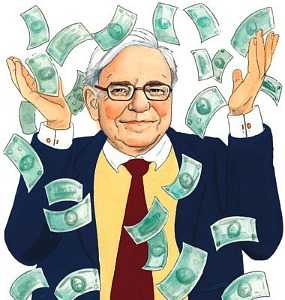
|
| Berkshire Hathaway |
At the other end of the spectrum, some extremely wealthy persons have essentially no need for income at all, at least income derived from major sections of their assets. For such persons, the question arises, why pay income taxes if you don't need income? If the assets are large, the management burden may become large as well, and there may be very little point to this administrative effort except that the government says it must be done. Persons in this happy situation often invest in assets like Canadian forests whose income is only foreseen in the far distant future, or in Berkshire Hathaway for example which deliberately generates no income or income taxes. In the case of Maharajahs or other obscenely wealthy people, there may even be no point in accumulating extra assets, or income, or the investment managers needed to select it. Even a modestly wealthy person gets into this situation when he becomes extremely elderly or extremely sick; he can't spend any of it, so why have it?
But not so fast. A comparatively young person, well educated and earning a comfortable income, may have no need for investment income for years to come, but he will certainly need it sometime. When he can afford to retire, he eventually does so, and at that moment his investment portfolio abruptly switches from a vague nuisance into his main source of his income. His investment outlook, therefore, should switch from that of a Maharajah to that of a single-client investor with a payroll to meet. Too many advisors ignore this fairly common situation, and advise a standard average portfolio design from age 20 to age 70, from the days when the client is a clerk to the day he becomes chairman of the board, someday even to being an invalid fed with a spoon. But it's hard to see the logic of investment rigidity throughout these life changes. To modify the revenue approach is not to "play the market" or to engage in market-timing. It is to adapt your behavior to your position in life.
This flexibility particularly applies to one's tax situation, which can vary from one extreme to the other throughout life. There is no sense in paying taxes on investment income unless the money is then spent. If there is no current need for spending money, there is no sense in paying taxes on investment income. Let the investment income accumulate untaxed unless there is no other income to spend. The consequence of this simple rule is that there are significant disadvantages to buying high-dividend stocks, at the same time that certain investment advisors are recommending nothing else. It is claimed that high-dividend stocks out-perform the market, which may sometimes be true. But it is always true that if the dividends are not spent in the same tax year they are distributed, the tax on the earnings they represent would accumulate untaxed if you had bought non-dividend stock. Eventually, such accumulations are taxed when the stock is sold, but ordinarily at a significantly lower tax rate. The present apparent advantage of high dividend stock performance is mainly a result of abnormally low-interest rates, which presumably will not last indefinitely. While this situation continues, it creates relatively little new taxes for the retiree spending up his investment income; it is the young person in his earning years who should be wary of unnecessary taxes of this sort.
Is Stock Trading Passe?
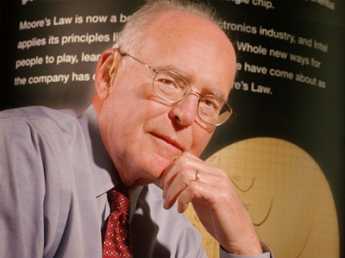
|
| Gordon Moore |
Moore's Law is named after Gordon Moore, who pointed out that computer chips seemed to double their speed every few years, an important issue affecting the cost of computers and the heat they give off while operating, and so on. In fifty years, there have been enough doublings of speed to make it often irrelevant whether they get any faster for the job they are intended to do. No one really cares whether a blink of an eye gets any quicker. The question is beginning to arise whether it makes any practical difference if the trading of stocks gets faster.

|
| U.S. Stocks |
At the moment, it's widely quoted that 70% of stock trades on major exchanges are now conducted between two unattended computers; it won't be long before 100% are. All of the inefficiencies of trading pits, with shouting and shoving, winking and maybe some front-running, will vanish into the humming of progressively smaller electric machines. Kinks will appear then get ironed out, perhaps after another Long Term Capital episode or two. The cost of trading will become vanishingly small, essentially a chess game between mathematics wizards. But volatility will smooth out, and costs will become negligible. So far as we can see, that's the end of the line, beyond which a computer speed sixteen times as fast serves no extra purpose.
But John Bogle, who invented the index fund and grew Vanguard to several trillion in assets, amused himself recently in front of a bedazzled audience. Several large funds, maybe even a lot of them, are taking what looks like a static mass of sleeping stocks and trading them internally at a rate of thousands per second, hoping to make a tiny fraction of a penny per trade individually, and a whole lot of profit for the managers in aggregate, while giving the appearance of standing still. Is this a good thing or a bad thing? Hard to say. John Bogle seems to imply it might even be a bad thing. Whatever it is, it is not the end of the line.
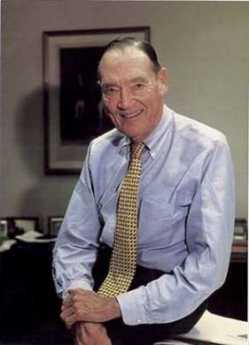
|
| John Bogle |
For completeness, look at the opposite end of this spectrum. Once more, it is John Bogle who points out that the price of the stock can be divided into its earnings, its dividends, and its speculative volatility. Total earnings for the past century have averaged 9.1%, but if you strip off the effect of price-to-earnings variance, you have an investment return of 8.8%, essentially the same in the eyes of normal people. The way an investor could strip away the P/E volatility -- is to buy the whole company. When you own the whole company, public opinion stops influencing the price. Holding companies can do that, as can private equity funds, and even Warren Buffett. If you are playing this game, all you need is a big-enough holding company with honest management or at least one independent method for estimating a fair price. If you are a value investor like Warren, buying the company for a P/E ratio well below 12.5 and holding it forever, you ought to achieve a return which significantly exceeds 8.8%. If you are an investment bank on Wall Street, you may buy the stock cheap, fix it up, and sell it rather soon for a much higher P/E ratio. Either way, there are transaction costs and taxes only twice, when you buy it and when you sell it. An investment company can do all kinds of things, but an individual investor should know enough to adjust his buying (of shares of these intermediaries) to a youthful stage of life, and his selling to his retirement years. It cannot be claimed the quirks have been completely worked out, but it's a start. Come back in a few years and see what has been added to this idea to make it air-tight.
Statement of Accounts, March 1785
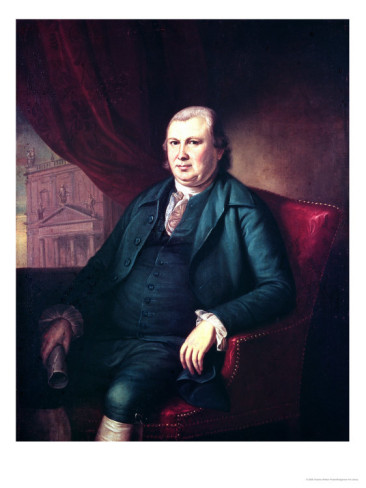
|
| Robert Morris |
AFTER resigning his position as Financier of the United States, Robert Morris worked for five months laboriously summarizing and detailing his official activities, and then he paid for printing five hundred copies of it. The document had a five thousand word preamble and over two hundred printed pages of detailed accounts, a prodigious effort. And a rather unprecedented one in an environment of traditional national secrecy about its accounts, except for the pioneering efforts of Necker in France. His reward at first was an infuriating discovery five years later that the government had not released his report to the public, and continued throughout this time to investigate Morris's earlier activities on the Secret Committee. The standard of bookkeeping for a secret committee engaged in smuggling arms before the Declaration of Independence was understandably obscure, and to have it flogged for failing to uphold the improved standards of government accounting which Morris later devised for the new nation was such a mixture of ingratitude and slyness that the behavior seemed well beyond infuriating. Nevertheless, it must have been gratifying to end the report with a positive balance of $21,000 even after eight years of struggle, war, and improvisation. The magnitude of this achievement was not lost on others in a position to see the contrast with earlier efforts, encapsulated by James Madison whose committee report concluded, "It appears to the committee that the regular official examination has already been made, and it would be inexpedient to incur the expense of a re-examination."
Madison by this time was evolving into a political opponent of Morris, but Samuel Osgood was a declared opponent of his approach to government accounts. Osgood's assessment of his opposition to the approach was prefaced with a ringing statement of its effectiveness: "I will tell you very freely, that in mere money transactions, he has saved the United States a very large sum... I am also of the opinion that much more regularity has been introduced into the keeping of accounts than ever before existed. This is a matter in my mind of very great importance. And without the strictest attention to it, the several states ought not to trust Congress with a single farthing of their money."
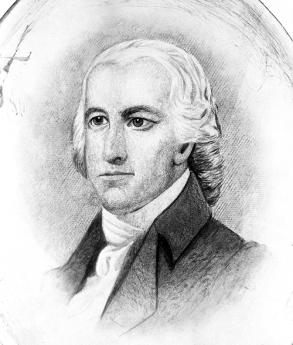
|
| Samuel Osgood |
The supreme irony of this situation was that by imposing strict accounting standards where none had previously existed, Morris was offering to his enemies a club to beat him with. Instead of recognizing that Morris was both too diligent and too rich to bother with cheating, there emerged a duel in which his enemies took unusual behavior to be a sure sign of wickedness, while Morris absolutely courted personal disaster, supremely confident he was unchallengeable.
There are two enduring truths to both positions. It is absolutely true that a well-informed public has a perfect right to do anything it pleases, regardless of the existing rules of government, regardless of the opinions of predecessors, heedless of the opinions of anyone else, past present or future. If a republic has supplanted a monarchy, the republic in a sense has the same divine rights. It's just unwise to act that way in anything but extreme circumstances.
On the other hand, it is also absolutely true that stability, peace, and prosperity are most likely enhanced by avoiding the mistakes of the past, following the accepted rules of conduct, and avoiding the counsel of loud and unstable leaders. Once in a while, a genius does appear and his discoveries should be adapted for future use as rules. Once in a while, a treasured maxim needs to be discarded. In a limited way, these evolutions of the rules of the road are an application of Galileo's invention of the scientific method, applied to the Common Law by Sir Francis Bacon. Make a likely conjecture, then verify it. And the second source of societal wisdom is the constant pressure of Society's Hidden Hand, as described by Adam Smith. The American Revolution was not so much an overthrow of a boisterous king, as it was incompletely successful incorporation of existing principles into a Constitutional system of government.

|
| Galileo's invention |
Considering the convulsive upheaval caused by its principles, the 18th Century colonists must be forgiven for misjudging their situation when confronted with a genius like Robert Morris. In barely a moment of time, Morris assembled these ideas into a vastly improved system of government management, immediately proved that it made the country rich, and demonstrated that he had the common sense to make himself rich using the same ideas. Even the idea usually attributed to his friend George Washington, that honesty is the best policy, sounds more like Morris than Washington, and certainly more like Morris than Alexander Hamilton. Only the likes of John Adams protested that honesty came from God. Morris did not deny that was possible, but acted as though it was irrelevant.
Pay attention to the voice of consensus, be quick and alert to occasional innovation, and don't waste your time being crooked. With these three rules, Morris got rich and made his country rich, enraging those who do not think riches should be a universal goal. Don't want to be a millionaire? Plenty of other people will take your place.
Our two-party system began in Appalachia, and one poor soul found himself marooned there. Hugh Henry Brackenridge, a representative of Western Pennsylvania, cried out, "If they would let Mr. Morris alone, he would make Pennsylvania a great people. But they will not suffer him to do it!" Brackenridge was never elected again.
REFERENCES
| Robert Morris: Financier of the American Revolution: Robert Morris: Charles Rappleye: ISBN-10: 1416570926 | Amazon |
Morris Defends Banks From the Bank-Haters
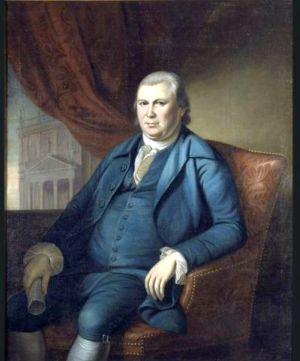
|
| Robert Morris |
IN 1783 the Revolution was over, in 1787 the Constitution was written, but the new nation would not launch its new system of government until 1790. It was a fragile time and a chaotic one. Earlier, just after the British abandoned their wartime occupation of Philadelphia in 1778, Robert Morris had been given emergency economic powers in the national government, whereas the state legislatures were struggling to create their own models of governance, often in overlapping areas. While the Pennsylvania Legislature was still occupying the Pennsylvania State House (now called Independence Hall) in 1778, it -- the state legislature -- issued the charter for America's first true bank the Bank of North America, and in 1784 the charter came up for its first post-war renewal. Morris was a member of the Pennsylvania Assembly both times. Although he was not a notable orator, it was said of him that he seldom lost an argument he seriously wanted to win. Keeping that up for several years in a small closed room will, unfortunately, make you many enemies.

|
| Tavern and Bank |
Morris was deeply invested in the bank, in many senses. He had watched with dismay as the Legislature squandered and mismanaged the meager funds of the rebellion, issuing promissory notes with abandon and no clear sense of how to repay them, or how to match revenues with expenditures. There was rioting in the streets of Philadelphia, very nearly extinguishing the lives of Morris and other leaders, just a block from City Tavern. Inflation immediately followed, resulting in high prices and shortages as the farmers refused to accept the flimsy currency under terms of price controls. Every possible rule of careful management was ignored and promptly matched with a vivid example of what results to expect next. Acting only on his gut instincts, Robert Morris stepped forward and offered to create a private currency, backed by his personal guarantee that the Morris notes would be paid. The crisis abated somewhat, giving Morris time to devise The Pennsylvania Bank, and then after some revision the first modern bank, the Bank of North America. The BNA sold stock to some wealthy backers of which Marris himself was the largest investor, to act as last-resort capital. It then started taking deposits, making loans, and acting as a modern bank. Without making much of a point of it at the time, the Bank interjected a vital change in the rules. Instead of Congress issuing the loans and setting the interest rates as it pleased, a commercial bank of this sort confines its loans to a fraction or multiple of its deposits, and its interest rates are then set by the public through the operation of supply and demand. The difference between what the Legislatures had been doing and what a commercial bank does, lies in who sets the interest rates and who limits the loans. The Legislature had been acting as if it had the divine right of Kings; the new system treated the government like any other borrower. As it turned out, the government didn't like the new system and has never liked it since then. Today, the present system has evolved a complicated apparatus at its top called the Open Market Committee of the Federal Reserve, most of whose members are politically appointed. Several members of the House Banking Committee are even now quite vocal in their C-span denunciations of the seven members of the Open Market Committee who in rotation are elected by the commercial banks of their regions. Close your eyes and the scene becomes the same; agents of the government feel they have a right to control the rules for government borrowing, while agents of the marketplace remain certain governments will always cheat if you don't stop them. This situation has not changed in two hundred years and essentially explains why some people hate banks.

|
| Seigniorage |
That's the real essence of Morris's new idea of a bank; other advantages appeared as it operated. The law of large numbers smooths out the volatility of deposits and permits long-term loans based on short term deposits. Long-term deposits command higher loan prices than short-term ones can; higher profits result for the bank. And a highly counter-intuitive fact emerges, that making a loan effectively creates money; both the depositor and the borrower consider they own it at the same time. And finally, there is what is called seigniorage. Paper money (gold and silver "certificates") deteriorates and gets lost; the gold or silver backing it remains safe in the bank's vault, where it can be used a second time, or even many times.
For four days, Morris stood as a witness, hammering these truisms on the witless Western Pennsylvania legislators. At the end of it, scarcely one of them changed his vote, and the bank's charter was lost. But at the next election, the Federalists were swept back into the majority, defeating the opponents of the bank. Although, as we learn the way democracy works, still leaving them unconvinced of what they do not want to believe.
Funding the National Debt
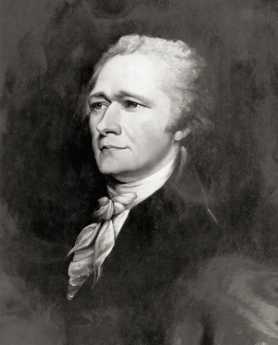
|
| Alexander Hamilton |
Although Alexander Hamilton's arresting slogan that "A national debt is a national treasure" has diverted attention to the underlying idea toward him, Robert Morris had introduced and argued for the same insight in the preamble to his 1785 "Statement of Accounts". The key sentence was, "The payment of debts may indeed be expensive, but it is infinitely more expensive to withhold payment." This fatherly-sounding advice was surely a distillation of a long life as a merchant, and the gist of it may have been passed down to him as an apprentice. Failure to pay your debts promptly and cheerfully results in the world assigning a higher interest rate to your future credit; it is not long before compounded interest begins to drag you down. It doesn't exactly say that, but that's what it means.
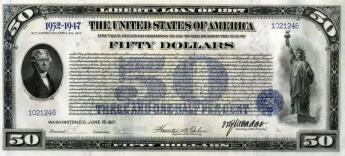
|
| Liberty Bond |
Another way of looking at this folk wisdom is that it leads to a simplified method of organizing the finances of an organization. Because higher rates of interest are demanded of long-term borrowing than short-term, it becomes efficient to segregate them. That is, to establish a cash account for every-day transactions, and a separate bond account for a long term, or capital, debt. As bills arrive, they need only be verified for accuracy and sent for payment from either a cash account or a capital account. The original responsibility for agreeing to such debts lies with top management, not the treasurer. The job of the treasurer's office is to pay legitimate bills as quickly and cheerfully as possible, ignoring any imprudence of earlier agreeing to them; rewards will come from lower interest charges and improved credit rating. An unexpected benefit of thus organizing institutions and governments is to make the accounting profession possible. Accountants perform the same function in every business, whether the business is selling battleships or parsnips. The accounting profession made itself computer-ready, two hundred years before the computer was invented.
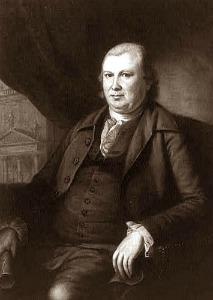
|
| Robert Morris |
In the same document, the retiring national Financier was advising the wisdom of "funding" the war debts, which were largely owed to France, with whom relations were rapidly souring. Lump them all together into a fund, issue bonds and sell them as representations of the nation's capital at the time of issue. Disregard what the money was used for, by either the debtor or the creditor. In spite of appearances, money sequestered in a fund for later payment belongs to the creditor the moment it is promised, not the moment it is transferred. Morris and Hamilton discovered that the fund itself had the property of a bank, in creating money. As long as the creditor did not cash your bonds, he could use them as money, in effect doubling the amount of money you yourself can spend. It was this discovery which so exhilarated Alexander Hamilton, causing him to over-praise the methodology to an already suspicious Congress. Tending toward the teachings of Shakespeare's Polonius, Hamilton's excitable manner caused them to remember, neither a borrower nor a lender is. But Congress was eventually persuaded. The federal government lumped the states' debts together in an "assumption of debts" , consolidated all these various little debts into a single "funded debt", and made the deal work with changing the "residency" of the nation's capital from Philadelphia to the banks of the Potomac. It was called the Great Compromise of 1790.
Morris well understood that a funded system requires some final payor of last resort. Such a payor need set aside only a small portion of the debt for dire contingencies, but his name gets first attention on the list presented to prospective creditors. In 1778 Morris had offered his own personal wealth as that last resort, which the public at the time trusted far more than the Treasury of the United States. Over the next twenty years, he came to realize that the last resort of established nations, no matter what the paper said, was the aggregate underlying wealth of the whole nation. With a vast continent stretching to the West, and countless immigrants clamoring to join from the East, the wealth supporting the debt of the United States in 1790 seemed endless. After two hundred years we have finally begun to accumulate a national debt which equals our Gross Domestic Product, and have only begun to pull back as we observe what happens to other nations who got to that point sooner. Let's hope devising an automatic check and balance does not require a second Robert Morris. Men like him can be hard to find, so limit your debts -- or your nation's debts -- to sixty percent of your assets. Financial geniuses are invited to devise a better debt limit, if they can.
Poor Richard's Wealth
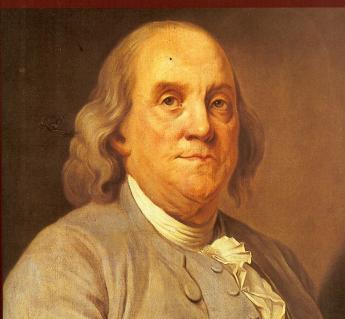
|
| Benjamin Franklin |
I RISE to offer yet another toast to Benjamin Franklin. Like our two leading candidates for the Presidency of the United States, he leaves us uncertain whether he was a rich man pretending to be poor, or a poor man pretending to be rich. To clarify this mystery, I have mainly examined the circumstances of his retirement, and the contents of his last will and testament.
Although he reports that on arrival in Philadelphia at the age of seventeen, he spent his last pennies on a loaf of bread, he was able to retire from the printing business at the age of forty-two, planning to spend the rest of his life as a gentleman at ease. He was able to do so because he had assembled over fifty partners in the printing trade, scattered from Boston to Georgia; today, we would say he had sold franchises to his business. When he came to retire, he arranged to be paid off in eighteen installments, which ought to have lasted him to the age of sixty. That was well past the usual life expectancy at the time, but we can now see it would apparently have run out while he was still in London, acting as our ambassador to Parliament, leaving him without support for the last twenty-four years of his life. Apparently, this was the reason for his seeking postmasterships and acting in some overseas business capacity for Robert Morris, then one of the richest merchants in America.
Assuming he may have run out of money when he was sixty, we look to his final estate to see how he made out in his second career, whatever it was. His assets were in three general categories: land, bonds, and hard money. He bequeathed eleven houses, mostly in Philadelphia, to various relatives. He assigned the ownership in thousands of acres of land in Nova Scotia, Georgia, and Ohio. Just what a bond was in Eighteenth-century America is not exactly clear, but bonds of at least ten thousand pounds sterling were distributed, as well as ten thousand pounds of hard assets. And he forgave a large and undefined number of unpaid debts.
He gave George Washington his gold-handled cane, which had been given to him by Duchess Du Pont, for unknown reasons. His modesty was famous but can be questioned when he gave one of his portraits to be hung in the Council Room of the government of Pennsylvania. He gave his sister a portrait of a French King, with four hundred and eight diamonds set in its frame. He instructed her not to make the diamonds into jewelry because that would be ostentatious. And he instructed that his funeral be plain and simple, although it turned out to be one of the most elaborate parades and ceremonies of the age.
After a few months, Franklin reconsidered his will and wrote a famous codicil. Revoking the gifts to his grandchildren, he ordered that a thousand pounds be set aside for each of the cities of Boston and Philadelphia. His proposal was that this money is loaned to graduating apprentices in order to help them start their businesses, and after a hundred years he envisioned it would amount to hundreds of thousands of pounds; after two hundred years, it would be worth millions and could be used for public improvements. These funds were indeed established and the loaning did begin. Unfortunately after hardly fifty years had elapsed, so many apprentices had failed to repay their loans the experiment was discontinued. What had seemingly been lacking was sufficient will of the trustees to collect the loans with vigor.
Poor Richard may have been born poor at more than one time. But he certainly didn't stay poor, very long. A toast to Ben Franklin, on his birthday, in his club.
Breaking the Buck

|
| Walt Bettinger |
WHEN mysteriously crashing financial markets caused transactions to freeze in terror in 2008, no one was brave enough to explain what had happened, because no one was sure. It had happened before and in many nations, but no comprehensive theory was acknowledged to exist for all such crises, and certainly no coherent explanation existed for this one. That is an assessment some people might dispute, of course. But during the worst of the crisis, chairmen of major financial houses, professors of economics, and assorted other notables were asked by the news media to explain the situation, and most of them confessed they really didn't know. As the crisis continued, tentative partial explanations were offered, and eventually, political partisans or competitors were emboldened to assign blame to indignant participants in various financial trades, apparently using the logic that if no one really knew the answer, then everybody was permitted to offer one. Gradually, however, some serious theories have been announced, along with reasonably credible evidence, but no more than that. After the dust had settled somewhat in November 2012, Walt Bettinger published an article in the Opinion pages of the Wall Street Journal which plausibly helps explain a piece of it.
Mr. Bettinger is the CEO of Charles Schwab Corp., which owns several large money market funds, and he credibly offers a theory about the money market part of it. Briefly, it is that large institutions with both sizeable investments in money market funds, as well as strong computer and mathematical resources, were in a position to withdraw their investments during the days of chaos, whereas smaller public investors have to wait until the end of the trading day to learn that a fund had abruptly developed too few assets to justify paying out a dollar for every dollar's worth of obligation. That is, in a "mark to market" situation there weren't enough reserves to cover the liabilities. If the public became aware of this situation, it might suddenly withdraw its deposits and throw the fund into bankruptcy; that is, it might start a run on the bank. In the past, this sort of thing has happened to money market funds from time to time, and the institution which owns or sponsors the money market fund has -- so far -- supplied its own money to prevent potential disaster from a bank run. However, in a serious crash with uncertain causes, someday that might not be their choice or their assets might not be sufficient to stop the run. The consequences are uncertain, but the dangerous potential is clear.
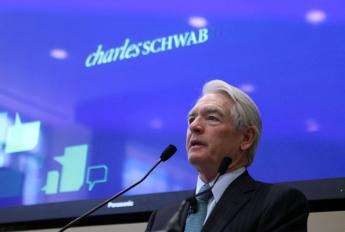
|
| Chuck Schwab |
The remedies for this situation might well be numerous, but the simplest one would be to isolate large investors from small ones by setting a top limit for large accounts, perhaps even automatically transferring large accounts to a large-account fund at the instant the account exceeds some limit. Apparently, similar proposals have been made privately, and there is opposition whose validity must be addressed. However, in the confines of an Op-ed article, a fully exhaustive discussion of a technical proposal is not possible. Ideally, this sort of proposal could be adopted privately, using the advance consent of the two involved parties, the bank, and the big customer. No doubt there is some legitimate concern that widespread publicity might trigger unfortunate legislative over-reaction. After all, most members of the public are unaware that "breaking the buck" is even a possibility. If the possibility of a run can be eliminated by skipping the alarming discussion of whether it potentially exists, or how serious it might or might not become, it would be a mercy. It only seems to be required that the parties agree it is a risk worth avoiding.
Sanctity of Contracts

|
| Constitution |
THERE is little doubt many state legislatures behaved in a capricious and high-handed way in the twenty years prior to the 1787 Constitution. Outrage at this behavior was one of the important stimulants to writing the Constitution, as well as putting public pressure on state legislatures to ratify it in 1788. Section 10 of Article 1 is devoted to limitations on state behavior deemed to be generally offensive or otherwise contrary to the national interest. Among the comparatively short list of absolute prohibitions is found "No state shall......, pass any law.....impairing the obligation of contracts, or grant any title of nobility." This section condemns certain behavior as indefensible but does not specify the Federal government to be similarly limited, along with the states. However, the government which was established as one of the limited federal powers. Unless a power was specifically granted to the Federal government, the Tenth Amendment announces it belongs to the states, or, as the Ninth Amendment would have it, to the people. There seemed no need to limit the scope of a power which could not exist. The Tenth and final Amendment in the Bill of Rights ended the 1791 Constitution with the words:
X. The powers not delegated to the United States by the Constitution, nor prohibited by it to the states, are reserved to the States respectively, or to the people.
A modern capsulation might be: the Federal Government is no more empowered to impair the sanctity of contracts than it is to grant titles of nobility.
The Framers of the Constitution were inexperienced in the habits of a republic, or they might have anticipated the general tendency of those who are empowered to enforce the law, to flout it in their own behavior. Around the smallest courthouse in the nation, one need not be surprised to find the Sheriff or other local worthies, parking their cars in illegal spots without fear of punishment. It is not just state legislatures who are tempted to disobey the laws they pass, but a general tendency of all authority to do so. It requires a local citizenry with a very short fuse, displaying instant hostility to the first sign of this sort of swaggering, to keep their local newspapers from filling up with scandal stories in the weeks before an election. Many of these stories are politically motivated, of course, but it must be admitted that in a naughty world, they are necessary.
 No State shall enter into any Treaty, Alliance, or Confederation; grant Letters of Marque and Reprisal; coin Money; emit Bills of Credit; make any Thing but gold and silver Coin a Tender in Payment of Debts; pass any Bill of Attainder, ex post facto Law, or Law impairing the Obligation of Contracts, or grant any Title of Nobility. No State shall, without the Consent of the Congress, lay any Imposts or Duties on Imports or Exports, except what may be absolutely necessary for executing it's inspection Laws: and the net Produce of all Duties and Imposts, laid by any State on Imports or Exports, shall be for the Use of the Treasury of the United States; and all such Laws shall be subject to the Revision and Control of the Congress. No State shall, without the Consent of Congress, lay any duty of Tonnage, keep Troops, or Ships of War in time of Peace, enter into any Agreement or Compact with another State, or with a foreign Power, or engage in War, unless actually invaded, or in such imminent Danger as will not admit of delay. 
|
| Article One, Section 10 |
A 21st Century illustration is found in a letter sent to current beneficiaries of Social Security, reducing their monthly check by twenty or more percent in some cases, and in other cases just a few dollars. The notice says that this deduction is based on IRS reports of the individual's income, using material supplied by the Internal Revenue Service, thereby triggering an additional side question about the right of the government to use supposedly private information to impair the obligation of the Social Security contract. Setting the privacy issue aside, what is illustrated is an even more discouraging violation of the expectations for fair dealing. This is a privacy right which might have been enforced by an excruciating repetition of the time-consuming requirement of manual specification. Now that computers are more common, what formerly needed no specification, now perhaps begins to need it, since endless repetition is now so tediously conventional.
Governments casually violate the sanctity of contracts when it is self-serving to do so, and presumably, it can be shown that they neglect to violate, or even punish those who violate, whenever such violations are to the advantage of anyone else. It has been said that this matter has been adjudicated in favor of the government in the past, thus creating a precedent, stare decisis, so to speak. Whatever the logic of such precedents, growing Constitutional literacy among the public is going to demand that the matter be re-argued. That is to say, it is comparatively easy to imagine growing knowledge about the Constitution among the citizens, while it will never be easy to expect the public to puzzle through the steps in a judicial chain which explicates how the reverse is now a superior view. Therefore, the demand for re-argument should be a growing one.
"They Don't Make That, Anymore"
They Don't Make That, Anymore These words from the nice young lady in the drug store, left me astonished, baffled, bewildered, and angry.
Although I am retired from the practice of medicine, my limited license permits me to prescribe ethical drugs for myself. I had not realized, until that very moment, that to some extent it also isolated me from the experiences of my fellow patients. Let me explain.
The drug involved was tetracycline, which I had surely prescribed a thousand times, and to which I had a sort of loyalty growing out of the fact that I took it myself. In the days when I was a college student, I came down with a form of pneumonia that involved a lot of coughing, like whooping cough. It was then called virus pneumonia because it was somewhat different from ordinary pneumonia, even though it was called Primary Atypical Pneumonia in polite academic circles. Eventually, we learned that its cause was neither a virus nor a bacterium, but rather something in between in size, called Mycoplasma. All of this is important to know, because it tends to appear as a question on a certification examination, but the fact of the matter is, it was a disease for which there was no effective treatment. We could cheer up a little to know that of four hundred recruits at an Alabama training center who came down with it, only one died. On the other hand, Legionnaire's Disease is also caused by a Clamydia and lots of them died, probably because most of them were older. But no matter, in 1944 there was no treatment, and I can tell you it is very unpleasant for a very long time, no matter how young you are.

|
| CAT Scan |
In 1950 I got it again, but this time I was a doctor and knew there was a good treatment. It sounds strange to say so, but I was sort of happy to be able to try out the new medicine, which was then called Aureomycin because the powder was golden yellow. Aureomycin was a trading name, with a patent, and when the patent expired the generic form was called Tetracycline. It worked just fine, and in three or four days I was out of the hospital, perhaps a little weak and shaken, but cured. Incidentally, I discovered an interesting feature of the disease which I believe has not been previously reported. It had long been observed that the chest x-ray showed pneumonia while the stethoscope perceived very little abnormality, a feature which disconcerted those of us who were concerned with the cost of medical care, particularly members of a generation who felt sniffy about the dependence younger physicians displayed for x-rays, and nowadays for CAT scans and MRIs. Unfortunately, in this particular instance, x-rays are clearly superior to stethoscopes.
My third time around for "viral" pneumonia was a few years later; I was sitting on a park bench near the hospital when I recognized the old symptoms were coming back again, so I went straight to the x-ray department and had a chest x-ray less than an hour after the symptoms appeared. I planned to have an x-ray to prove it, go get some tetracycline and be all better over the weekend, with a rollicking anecdote to tell doctor friends about. Unfortunately, the x-ray was normal, so I was admitted into the hospital to see what was wrong. The next morning the x-ray showed a densely consolidated lung, so it had been viral pneumonia all along. And so my old prejudices were vindicated; it was possible to be too quick to order x-rays after all. Unfortunately, the extra twelve hours without treatment allowed me to get a lot sicker than I had to be. I think I know this because, doggone it, I developed the same disease several decades later, took no shortcuts to the drug store, and was fine in a couple of days after I immediately started taking tetracycline. You could say this strange recurrence of Mycoplasma pneumonia over one-lifetime sort of illustrates how medical care of the disease has become progressively cheaper. Instead of a month in the hospital with no treatment, it was now a matter of skipping the stethoscope, skipping the x-ray, skipping the hospital, and just swallowing some cheap tetracycline capsules. You have to have the nerve to do it, of course, and ethically you probably only have a right to do it to yourself, knowing the risks and being willing to accept them. There is, however, one flaw in this story.
When Aureomycin first emerged from the clutches of the FDA (and well before that accursed Kefauver Amendment), it seemed astonishingly expensive. Because I knew what it weighed (250 milligrams per capsule), and I knew what gold cost ($35 an ounce), it was easy for an idle mind to calculate that Aureomycin cost more than gold. Gold now sells for $1700 per troy ounce, so you could take this story in the direction of inflation. I rather prefer to take it in the direction of nominal dollar amounts, because Aureomycin retailed for $5 a capsule the third time I had the disease, and $1 per capsule when it lost its patent and became tetracycline. The fourth time I had the disease, I bought a container of fifty capsules for 76 cents. But as you have already heard, by the fifth time I couldn't buy it for any price, because everybody had stopped making it. Since my view of the economics of useful commodities is that low prices will only cause shortages if there is artificial market interference, the usual cause of shortages is rationing. Somebody who understands the 2500 pages of Obamacare better than I do will have to tease out the way rationing has caused shortages of tetracycline. And when they are done confusing the public, let them explain why you also can't buy KMnO4 crystals (potassium permanganate), which has cured more cases of athlete's foot for twenty cents, than all those cans of stuff in spray canisters.
Bretton Woods

|
| The Bretton Woods conference in 1944 |
Stripped of its mystery and irrelevant details, the Bretton Woods conference agreed that all nations would make their currency convertible into U.S. dollars, and the U.S. would make its currency convertible into gold. Since World War II had left the United States with the only major working economy, it sold goods to the rest of the world and the rest of the world sent us their money to be converted into dollars; we had a "favorable balance of trade." Somewhere in the 1960s the rest of the world got on its feet, and we began to have an unfavorable balance of trade. After a while, foreigners started converting their dollars (the "reserve" currency) into gold. By 1971, the depletion of gold from Fort Knox became alarming, and the United States stopped converting its currency into gold. From that point onward, all currencies became effectively computer notations, whose value as a medium of exchange was what their government said it was.
Paradoxically, it is hard to see how this system would work without a government in charge of it, although private substitutes would probably soon appear if governments relaxed their monopoly on currency. Since a great many people dislike their governments for one reason or another, they chafe at a system which forces them to keep their governments in order to prevent commercial chaos. For those who do not adequately understand this, governments all stand ready to maintain themselves with force, and many other people dislike that feature even more. Since it took place at the same time, the Vietnam protest movement may have had some relation to this major change in the nation, misunderstood perhaps, but viscerally perceived. In view of President Nixon's central role in all of this, one is even tempted to speculate that his electoral promise of a secret means to end the Vietnam conflict, coupled with the subsequent peaceful surge of China and the financial recycling of Chinese money through Treasury bond purchases, may all have been subjects discussed during his historic trip to China.
However that may be, it is a fact that the Vietnam War ended, the Chinese economy flourished with American help, and the deposit of Chinese money in our economy helped fuel a massive economic bubble, and the weakest links in the chain -- mortgage-backed securities -- were the place the bubble burst. Not much of this could have occurred with a gold standard, and in many circles, this was regarded as proof that gold was a barbarous relic. In retrospect, few would deny we had been leveraging our economy to dangerous heights, for nearly fifty years. In 1996, Alan Greenspan denounced our "irrational exuberance", and yet the bubble did not burst for another twelve years. If we succeed in deleveraging our economy until it reaches 1996 levels, it will be regarded as a remarkable success. But the Chairman of the Federal Reserve at that time described it as a dangerous level. And looking back over the centuries, an indescribable number of kings were dethroned or beheaded because they evaded the rather irrational restraints of a scarce, hence precious, barbarous relic. Balanced against that, a billion Asiatics have been raised out of poverty, and the economy of the world overall would seem opulent to our grandfathers. Somehow, we must find the wit and the self-restraint to solve this problem.
REFERENCES
| The Battle of Bretton Woods: John Maynard Keynes, Harry Dexter White, and the Making of a New World Order:z Benn Steil: ISBN-13: 978-0691149097 | Amazon |
Spending Accounts into Savings Accounts for Retirement? Don't Count On It.

|
| Flexible Spending Accounts |
For many years, Health Spending Accounts (now called Flexible Spending Accounts) were confused with Health Savings Accounts. In the previous section, we have just proposed the $500 annual roll-over be made permanent. Naturally, that raises the question of whether a permanent rolled-over account could be made into a supplementary retirement account, but unfortunately, the mathematics of that is not nearly so good. Let's consider the most favorable case. As stated, that would be a $500 annual contribution, starting at age 18, paying 10% income return. That would generate a retirement fund at age 65 worth $436,000. That sounds pretty attractive until you start picking it apart.
In the first place, most people can't start work at age 18 and expect to be continuously employed until 65. There will be periods of unemployment for most people. In the second place, money invested in large-cap common stock will indeed return 10% over a long period of time, but there may well be gaps and periods of catch-up. And if you are not careful, you won't get 10%, even though your money is earning it. The experience with 401(k) accounts has been the financial industry will likely reduce your returns by roughly 2% with an internal assessment called 12b(1), allegedly a reimbursement for sales promotion, but really just 2% for themselves. So, you are down to 8% before you encounter $250 charges per transaction. Some brokers only charge $5.00 for purchase, and some banks charge nothing to give you your own money back. Very likely, the $250 purchase charge will disappear before the $250 withdrawal fee does because the withdrawal fee is harder to spot on the receipts. John Bogle recently remarked on television that the financial industry takes 85% of the returns on retail investments before it gives anything back to the consumer, which seems to include rather more than an 8.5% gross margin, so there's probably more fee here than I can account for, which is about half of that. To be conservative, let's say your original return of 10% has been reduced to 5%. So, the expected retirement fund for our hypothetical wage-earner is not $436,000, but $89,000.
Even that haircut is more than our hypothetical is likely to get. With Medicare as a backup, paying for healthcare has been protected during its most expensive period. Retirement, on the other hand, is usually more costly in a retiree's sixties than his eighties. So, while $89,000 might well cover health costs in old age, it will probably fall short of covering retirement. For instance, the average Medicare recipient costs Medicare $11,000 a year. How many retirees do you know who can live on $11,000 a year? We're going to have to leave it at that. By stretching and luck, by arm-wrestling the investment community and counting on continuous employment for forty years, we might scrape together a plan that would cover healthcare as we hope it will cost when we get there. But retirement? My warning is that I don't see how it can be managed, except for one strategy. People are going to have to work longer and retire later. To make ends meet on retirement, the emphasis must shift from demanding retirement as an entitlement -- to demanding our employers themselves get to work, providing more of the jobs old folks can perform, in spite of infirmities. We've got to build houses cheaper to repair, and cars cheaper to drive. We've got to live in houses with elevators and wear clothes that moths won't eat. But squeezing it out of investment accounts? After we've wrung it dry, paying for healthcare, I doubt there will be much left.
Arbitration

|
| Arbitration |
The choice of "arbitration" as a term to describe a legal process seems a strange one, since it conflicts with the ordinary use of "arbitrary" as equivalent to a decision made without the use of logic or precedence, and even with "arbitrage" which implies slipping between the cracks. Nevertheless, frequent use of the terms seems to keep their meanings usably separate, at least in a city like Philadelphia which has a lot of lawyers. At any rate, when a lawyer who specializes in arbitration recently agreed to discuss the subject before a recent meeting of the Right Angle Club, the room had very few empty seats.

|
| Arbitrage |
Arbitration settles the same sort of dispute as damage suits, except there is no jury, and the decision of the Arbiter/Judge is final, without appeal. Most of the cases concern disputes between an individual and a corporation, where the two disputants have previously voluntarily decided to do business with each other, but had a falling out because of some misunderstanding. This puts the corporation in a position to insist on using arbitration in the event of a dispute, and the customer has accepted this condition as a requirement of doing business. Although it is true that inclusion of such a requirement in a business contract is often unthinkingly accepted as part of a many-page fine-print boiler-plate provision, the requirement is so common it can often be regarded as well-understood. However, often it is not so well understood by a client, and more serious criticism is that the company writes the detailed language, specifying who the arbitrator is to be.
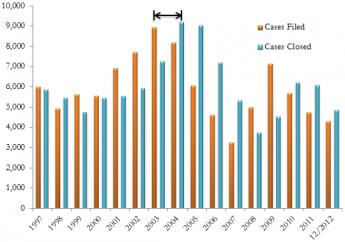
|
| Arbitration Cases |
Nevertheless, arbitration is cheaper and quicker than litigation, so the customer gets some real advantages from it, and the arbitrator generally is more expert in the subject matter than a random jury would be. In the event that a client is offered some choice of litigation in place of arbitration, he is often subjected to rather intense pressure to desist in the effort. Judges often quite openly admit they prefer a more rapid way to clear their calendar, and in the event of some technical complexity are even a little afraid to be drawn in over their heads by it. Right or wrong, when an arbitration decision is rendered, it is final. That is, there is no longer any danger a decision will be reversed on appeal. Most arbitration cases are disputes between investment broker/dealers, or commercial firms, and their clients, where the corporation has some hesitation in harming its commercial reputation by seeming to abuse clients. Therefore the situation tends to encourage a fair amount of brow-beating in order to get the client to sign some agreement that he has been satisfied.
In a sense, arbitration takes on the role of the Courts of Equity of an earlier era. A Court of Equity is designed to cope with a situation in which some obvious wrong exists, but no law exists to address it. As legislatures have had several centuries to pass legislation, Courts of Equity have lacked much use; in fact, the current problem is probably that we have too much legislation. Therefore it is probably true that more important cases end up as litigation, while more routine or commercial cases congregate in arbitration. A random jury serves the purpose of speaking on behalf of Society in an area where the legislature has already had a chance to express the overall attitudes of Society; a jury speaks for fairness, as our civilization views fairness to be. Since an arbitration judge generally concentrates in a certain type of case, he generally is fairly expert in the law of the subject, and it seems likely he renders a better opinion of the law surrounding that particular topic. Whether he renders a better opinion of the merits of the case probably depends on whether his expertise has expanded with experience or merely frozen with the passage of time.

|
| Court of Equity |
When the lecture was over, it was time for questions from the audience. It appears that club members were mainly entranced by the question of whether the choice of arbitration or litigation leads to a better outcome. In one way or another, the same question got the same cluster of answers: arbitration is cheaper, quicker and more final. But the questions kept getting re-phrased in different ways: is the outcome more or less fair than litigation? Finally, one old codger had the floor. "It seems to me, sir, that the plaintiff generally only has one case in a lifetime, whereas the defendant corporation may have thousands of cases. And the defendant gets to pick the arbitrator. Doesn't that seem to create an incentive for the arbitrator to favor the company which can send him more business?"
And the answer came quickly back, "Well, that's how it is. Just suck it up."
As the group filed out of the room, several members told the old codger, "Your question was better than the answer."
| Posted by: G4 | Jan 23, 2007 6:41 PM |
47 Blogs
Investing for Children
 More often than not, children spend money foolishly; so our laws restrain them. However, the same laws also hamper the legitimate accumulation of savings for their education.
More often than not, children spend money foolishly; so our laws restrain them. However, the same laws also hamper the legitimate accumulation of savings for their education.
The Coming Baby Boomer Retirement Problem
 In a few years, the baby boomers will retire and two things will happen. They will have to retire later in life, and the country will have to borrow money to pay for the rest.
In a few years, the baby boomers will retire and two things will happen. They will have to retire later in life, and the country will have to borrow money to pay for the rest.
Default Investing
 Busy people with growing families have little time for investing but will find their retirement crippled if they neglect it. Current income should be deposited directly and immediately into the default long-term vehicle, from which cash is withdrawn. Current custom is the other way around, creating idle money as a temptation for reckless consumption. The default vehicle is low-fee, low tax exposure; an exchange-traded index fund of the entire world economy.
Busy people with growing families have little time for investing but will find their retirement crippled if they neglect it. Current income should be deposited directly and immediately into the default long-term vehicle, from which cash is withdrawn. Current custom is the other way around, creating idle money as a temptation for reckless consumption. The default vehicle is low-fee, low tax exposure; an exchange-traded index fund of the entire world economy.
Beginning Social Security Benefits
 All your life you can look forward to the day Social Security starts paying you. But while some folks need to start benefits before age 65, others should delay it for ten years or more.
All your life you can look forward to the day Social Security starts paying you. But while some folks need to start benefits before age 65, others should delay it for ten years or more.
Estate Planning Tool
It's complicated: a CRUT in a FF, administered by a DAF, and purchasing life insurance in an ILIT.
Reflections on Swensen
A private two-way conversation.
IRA ... Individual Retirement Accounts (3)
 A legislative proposal gets started, beginning in the right place.
A legislative proposal gets started, beginning in the right place.
Retiring to the Workforce
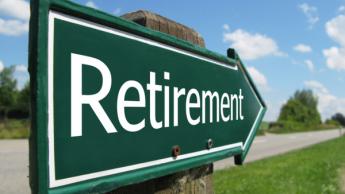 Most Americans alive in 2020 will live to be ninety before they die. Forget about lock boxes and other schemes to pay for a thirty-year vacation. These people will have to keep working at least until age 70.
Most Americans alive in 2020 will live to be ninety before they die. Forget about lock boxes and other schemes to pay for a thirty-year vacation. These people will have to keep working at least until age 70.
Rentier Class
 Eventually, everyone can hope to be a member of the rentier class. Ideally, they will have first spent equal time as workers.
Eventually, everyone can hope to be a member of the rentier class. Ideally, they will have first spent equal time as workers.
David F. Bradford, 1939-2005
 David Bradford, Princeton economist, recently died in an unfortunate accident. His 1977 paper "Blueprints for Tax Reform" inspired Individual Retirement Accounts, Health Savings Accounts, individual Social Security Accounts, the flat tax, and the advantages of shifting from income taxation to consumption taxes.
David Bradford, Princeton economist, recently died in an unfortunate accident. His 1977 paper "Blueprints for Tax Reform" inspired Individual Retirement Accounts, Health Savings Accounts, individual Social Security Accounts, the flat tax, and the advantages of shifting from income taxation to consumption taxes.
Donor Intent
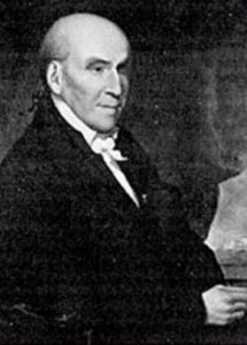 Measure a civilization by how it acts when a donor has died but his possessions endure. Especially when his firmly declared wishes conflict with their own.
Measure a civilization by how it acts when a donor has died but his possessions endure. Especially when his firmly declared wishes conflict with their own.
Community Volunteers in Medicine
 A little group of medical volunteers in Pennsylvania's Chester County may not understand the underlying issues very well, but they just pitch in and do what they can about the medically underserved.
A little group of medical volunteers in Pennsylvania's Chester County may not understand the underlying issues very well, but they just pitch in and do what they can about the medically underserved.
Immigration
 The United States government makes several trillion dollars profit on immigration, through a jaw-cracker called seigniorage.
The United States government makes several trillion dollars profit on immigration, through a jaw-cracker called seigniorage.
Africa Comes to the Schuylkill
 African oil, refined in Philadelphia, supplies 2/3 of the gasoline on the East Coast.
African oil, refined in Philadelphia, supplies 2/3 of the gasoline on the East Coast.
Hayek Confronts Keynes
 The influence of Austrian economist Friedrich von Hayek is slowly winning out over the views of the English economist Maynard Keynes, even though both of them are dead. Which is worse, inflation or depression?
The influence of Austrian economist Friedrich von Hayek is slowly winning out over the views of the English economist Maynard Keynes, even though both of them are dead. Which is worse, inflation or depression?
Health Maintenance Organizations (HMO)
 Paul Ellwood gets credit for inventing the term HMO, and for selling a version of it to large employers, as well as the Clinton Administration. It's been a bumpy ride.
Paul Ellwood gets credit for inventing the term HMO, and for selling a version of it to large employers, as well as the Clinton Administration. It's been a bumpy ride.
OUR NICE HOUSING BOOM COLLAPSES
 Politicians will assign blame for the housing boom-and-bust, but they should look at themselves. Which is worse, "red-lining" or "stupid loans"?
Politicians will assign blame for the housing boom-and-bust, but they should look at themselves. Which is worse, "red-lining" or "stupid loans"?
Making Money (8): Virtual Money
 When money was tangible you had to guard it, now that it's mostly virtual you have to verify it. Hardly anybody can, and that's a problem.
When money was tangible you had to guard it, now that it's mostly virtual you have to verify it. Hardly anybody can, and that's a problem.
Gloomy Future for Banks
 Banks pay depositors modest interest rates, lending to borrowers at higher ones. Bank reserves grow from that difference; survival depends on enough reserves to ride out exceptional situations. Profit is what is left.
Banks pay depositors modest interest rates, lending to borrowers at higher ones. Bank reserves grow from that difference; survival depends on enough reserves to ride out exceptional situations. Profit is what is left.
Report Identity Theft to the Secret Service
 Identity theft is now under the jurisdiction of the U.S. Secret Service.
Identity theft is now under the jurisdiction of the U.S. Secret Service.
What's a Repo?
 With a dozen small variations, repurchase agreements are a new and streamlined way to make short loans in big volume. Bear Stearns dominated the repo market for hedge funds but the volume got too big to manage when interest rates shifted.
With a dozen small variations, repurchase agreements are a new and streamlined way to make short loans in big volume. Bear Stearns dominated the repo market for hedge funds but the volume got too big to manage when interest rates shifted.
HowTo Create A Subprime Derivative
It's easier than you thought
Hedge Funds in Delaware
 The state of Delaware attracts clusters of businesses for reasons having to do with its legal system; call it Delaware Attractiveness. At the moment, it attracts hedge funds.
The state of Delaware attracts clusters of businesses for reasons having to do with its legal system; call it Delaware Attractiveness. At the moment, it attracts hedge funds.
Securitization: Pass the Hot Potato
 Securitization of home mortgages is a generally good thing, but it has one major flaw. Unless we somehow fix it, it will fix us.
Securitization of home mortgages is a generally good thing, but it has one major flaw. Unless we somehow fix it, it will fix us.
Banks: Fragile and Dangerous
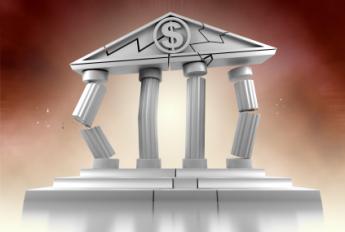 Any business can fail, but when banks fail there can be a panic. Every decade or so, America has a bank panic.
Any business can fail, but when banks fail there can be a panic. Every decade or so, America has a bank panic.
World Finance, Columbus Day 2008

Financial Institutions of the Future
 Impending financial crisis has pushed everything else off the front page. But looking backward may show where we are likely going.
Impending financial crisis has pushed everything else off the front page. But looking backward may show where we are likely going.
Philosophy Means Science in Philadelphia
 At least until he met Madame Helvetius, Benjamin Franklin displayed little interest in moral philosophy. His interest was in science, which was called natural philosophy in the Eighteenth Century. The American Philosophical Society is America's oldest and most prestigious society of scientific scholars. If investing is a science, the APS is good at that, too.
At least until he met Madame Helvetius, Benjamin Franklin displayed little interest in moral philosophy. His interest was in science, which was called natural philosophy in the Eighteenth Century. The American Philosophical Society is America's oldest and most prestigious society of scientific scholars. If investing is a science, the APS is good at that, too.
Taking Risks Demands Its Price
 For a few days in August 2007, no one knew why financial markets were suddenly in a jumble. After a week it became clear, risk spreads had been too narrow and were reverting to normal. It would be painful.
For a few days in August 2007, no one knew why financial markets were suddenly in a jumble. After a week it became clear, risk spreads had been too narrow and were reverting to normal. It would be painful.
Go to Delaware, Elephants?
 It's about a 20-minute commute from Delaware to Philadelphia, with a big difference in estate taxes. Moving from New Jersey to Delaware would double that difference.
It's about a 20-minute commute from Delaware to Philadelphia, with a big difference in estate taxes. Moving from New Jersey to Delaware would double that difference.
Selling Entire Towns
 Some builders build whole towns without houses and then sell them to custom home builders.
Some builders build whole towns without houses and then sell them to custom home builders.
New Roles For Grandparents
 The present generation of grandparents is inventing new rules.
The present generation of grandparents is inventing new rules.
Frank Furness (2) Rittenhouse Square
 There were plenty of rich folks in Philadelphia before the Civil War. But it took the industrial revolution to make possible what we call the Victorian urban mansions.
There were plenty of rich folks in Philadelphia before the Civil War. But it took the industrial revolution to make possible what we call the Victorian urban mansions.
Disappearing Stock Power
 The proxy voting power of corporate common stock is disappearing every day, by thousands of shares.
The proxy voting power of corporate common stock is disappearing every day, by thousands of shares.
Last Will of Benjamin Franklin
 The Franklin Institute of Philadelphia has reproduced Dr. Franklin's last will and testament on the Internet. It is copied here for reader convenience.
The Franklin Institute of Philadelphia has reproduced Dr. Franklin's last will and testament on the Internet. It is copied here for reader convenience.
Unique Investment Requirements
 Some investment situations are so different from the routine ones that conventional wisdom scarcely applies.
Some investment situations are so different from the routine ones that conventional wisdom scarcely applies.
Is Stock Trading Passe?
 Computers have been in some sort of use for trading stocks, for over fifty years. Are they reaching their limits?
Computers have been in some sort of use for trading stocks, for over fifty years. Are they reaching their limits?
Statement of Accounts, March 1785
 At the conclusion of Robert Morris' term of office as Financier, he did an unusual thing by submitting a complete accounting of his term. As things turned out, it was a good thing he did so.
At the conclusion of Robert Morris' term of office as Financier, he did an unusual thing by submitting a complete accounting of his term. As things turned out, it was a good thing he did so.
Morris Defends Banks From the Bank-Haters
 To understand why lots of people today reflexly hate bankers, it's useful to review the courtroom defense of the man who invented America's first bank, facing ruin if he proved unconvincing.
To understand why lots of people today reflexly hate bankers, it's useful to review the courtroom defense of the man who invented America's first bank, facing ruin if he proved unconvincing.
Funding the National Debt
 Funded debt, otherwise known as Capitalism, was a gift to the nation from Robert Morris, Jr.
Funded debt, otherwise known as Capitalism, was a gift to the nation from Robert Morris, Jr.
Poor Richard's Wealth
 Ben Franklin called himself Poor Richard, and he also was invited to visit five kings. Was he rich, or poor?
Ben Franklin called himself Poor Richard, and he also was invited to visit five kings. Was he rich, or poor?
Breaking the Buck
 Several years after the financial crash of 2008, the question is raised whether money-markets might have played an unsuspected role. If so, what should be done about it?
Several years after the financial crash of 2008, the question is raised whether money-markets might have played an unsuspected role. If so, what should be done about it?
Sanctity of Contracts
 Article I of the Constitution, states in section10 that "No state shall......pass any law.....impairing the obligation of contracts, or grant any title of nobility." While the Constitution does not precisely say the Congress may not do so, or the President might not, it is definitely omitted from the list of limited federal powers. And it is the enduring expectation of the citizenry that the federal government is no more encouraged to impair the sanctity of contracts than to grant titles of nobility.
Article I of the Constitution, states in section10 that "No state shall......pass any law.....impairing the obligation of contracts, or grant any title of nobility." While the Constitution does not precisely say the Congress may not do so, or the President might not, it is definitely omitted from the list of limited federal powers. And it is the enduring expectation of the citizenry that the federal government is no more encouraged to impair the sanctity of contracts than to grant titles of nobility.
"They Don't Make That, Anymore"
 Pharmaceutical drugs seem to follow a trajectory of fifty years, from new and expensive, to cheap, old and eliminated.
Pharmaceutical drugs seem to follow a trajectory of fifty years, from new and expensive, to cheap, old and eliminated.
Bretton Woods
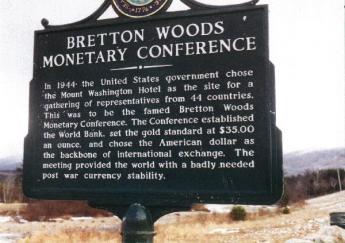 The Bretton Woods conference in 1944 was very simple. The U.S. dollar alone was convertible into gold, but all other currencies were convertible into U.S. dollars. To prevent Fort Knox from being completely depleted of gold, the convertibility of dollars into gold was also soon discontinued. Effectively, all money everywhere was thus just a computer notation, controlled by the U.S.government. Temporarily, the dollar became a reserve currency, supplementing gold. Effectively, we were testing whether we needed a metallic standard at all.
The Bretton Woods conference in 1944 was very simple. The U.S. dollar alone was convertible into gold, but all other currencies were convertible into U.S. dollars. To prevent Fort Knox from being completely depleted of gold, the convertibility of dollars into gold was also soon discontinued. Effectively, all money everywhere was thus just a computer notation, controlled by the U.S.government. Temporarily, the dollar became a reserve currency, supplementing gold. Effectively, we were testing whether we needed a metallic standard at all.
Spending Accounts into Savings Accounts for Retirement? Don't Count On It.
 Flexible Spending Accounts, unlike Health Savings Accounts, have a use-it-or-lose-it feature. New regulations now permit FSAs to roll-over $500 per year to later years. Astounding things become possible that were previously impossible if this conversion could be extended to more than a single year.
Flexible Spending Accounts, unlike Health Savings Accounts, have a use-it-or-lose-it feature. New regulations now permit FSAs to roll-over $500 per year to later years. Astounding things become possible that were previously impossible if this conversion could be extended to more than a single year.
All of America's concepts about retirement were formed by Franklin Roosevelt when he set the retirement age at 65, which in those days was approximately the lifespan of an average worker.
No Social Security crisis there.
Obvious to everyone who thinks about it except the politicians charged with dealing with the problem is the fact that there are only 2 solutions to the Social Security and Medicare problem:
1. Raise taxes
2. Reduce benefits
The Greenspan commission began both by slowly raising the retiement age and indexing the amount taxed for OADI. Neither was enough and all the extra money has been wasted in Iraq and Alaska, but he had the right idea. I expect we will see more of both, however hot this third rail may be.
So you come along and say that the Government will inevitably go into debt; debt that will result in inflation, which is a tax.
The whole thing is worrisome, but I do observe that most crises have a way of being worked out; it's quite rare that the whole world goes down in flames. But who knows, enlightened Government ain't what we've got at the moment, certainly.
So we'll all have to work for another 20 years. Since I can't imagine the horrors of 20 years of golf, this doesn't seem like such a punishment.